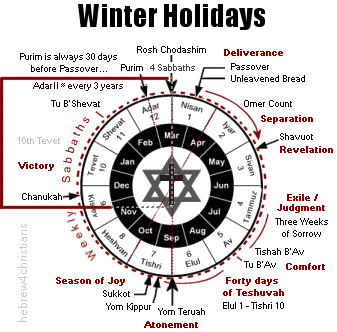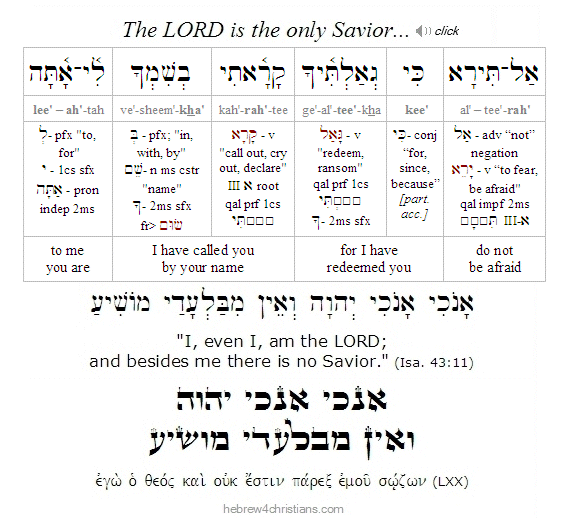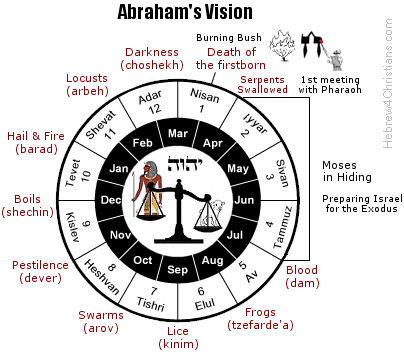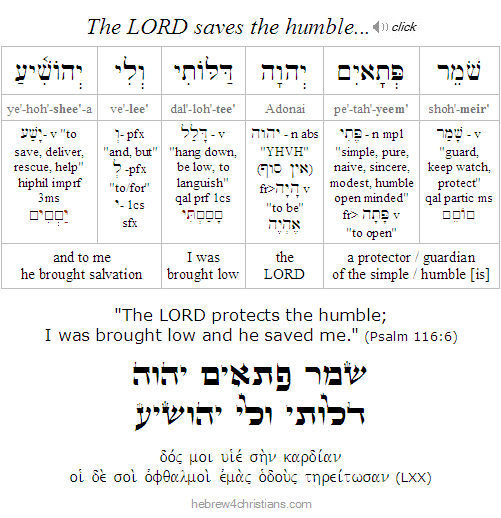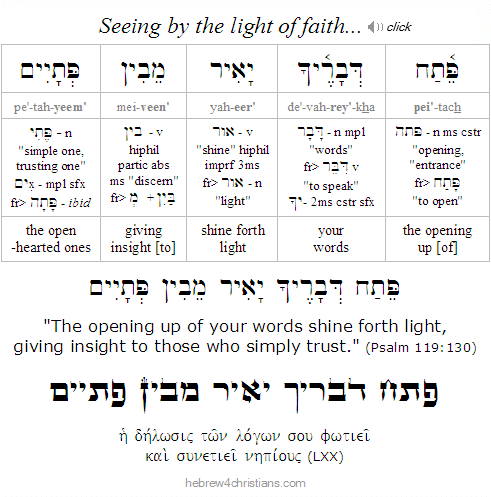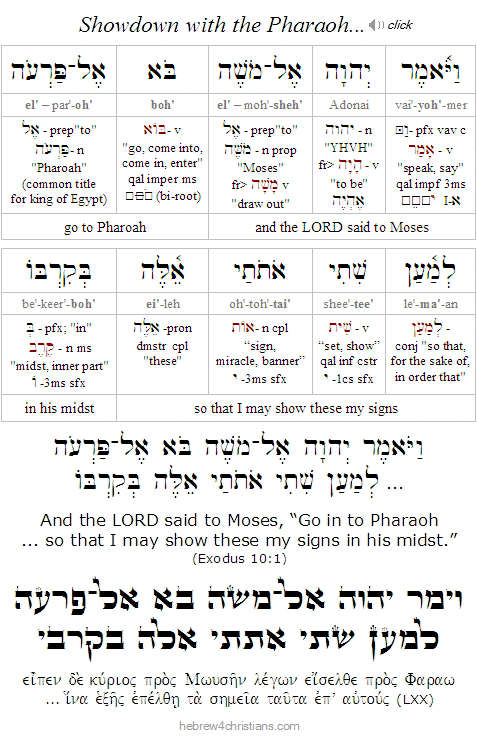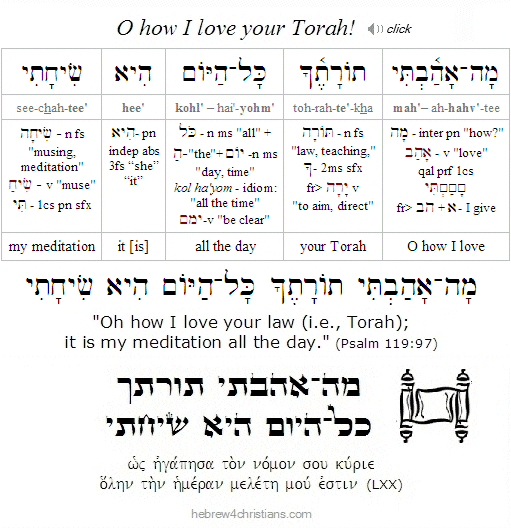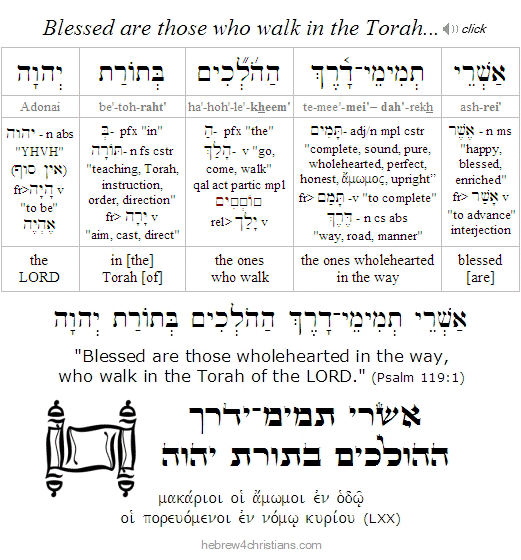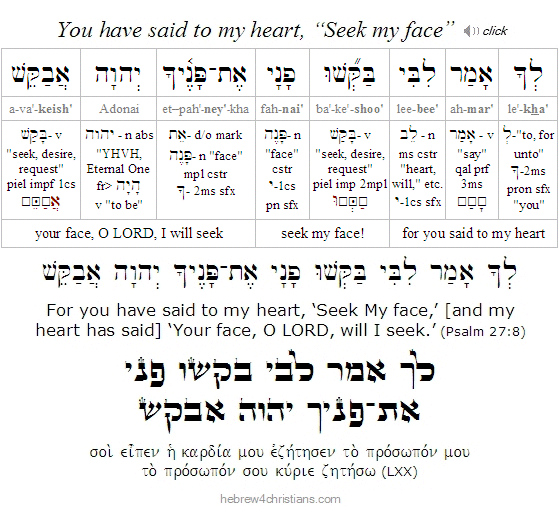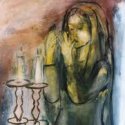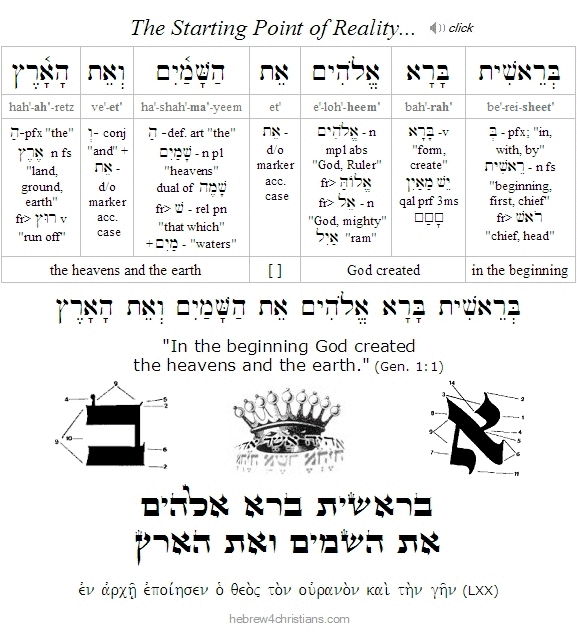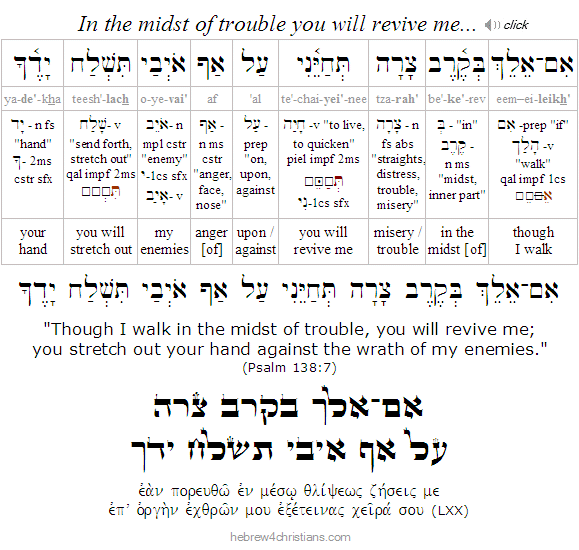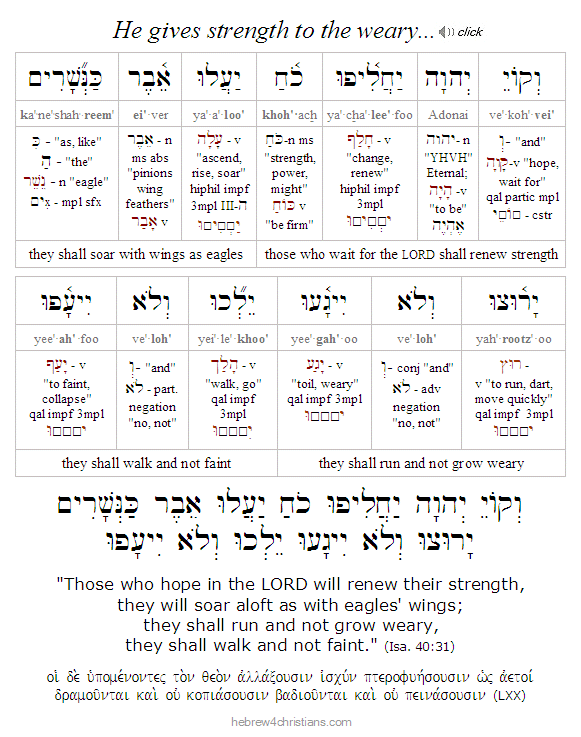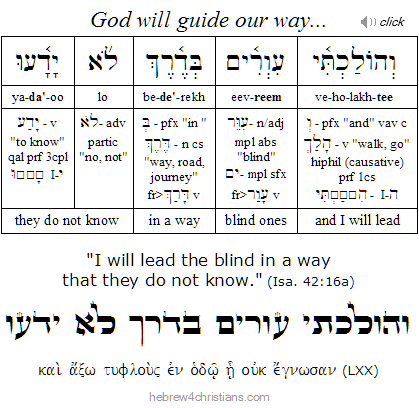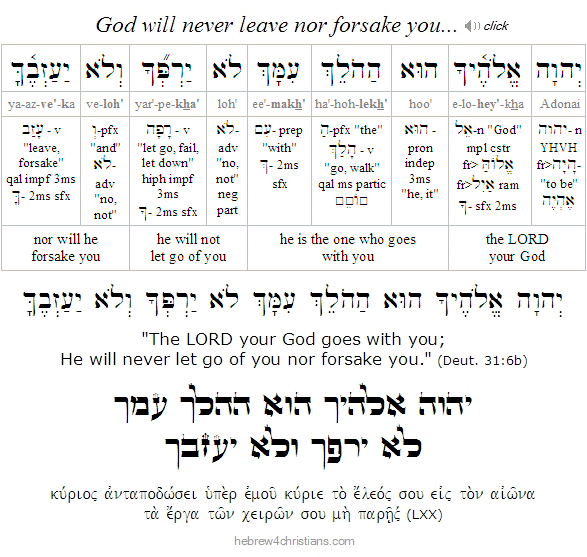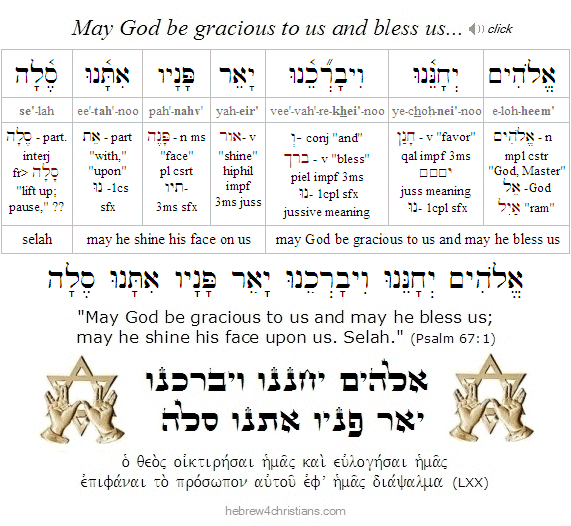|
Jewish Holiday Calendar
For January 2020 site updates, please scroll past this entry....
The winter holidays (חגי החורף) remember special times when God acted on behalf of His people so that they would triumph over their enemies, and therefore they prophetically picture the final victory in the world to come.
The Winter Holidays:

Note that in accordance with tradition, the following holiday dates begin at sundown:
- Month of Kislev (Wed. Nov. 27th [eve] - Fri. Dec. 27th [day])
- Month of Tevet (Fri., Dec. 27th [eve] - Sun. Jan. 26th [day])
- Month of Shevat (Sun. Jan. 26th [eve] - Mon. Feb. 24th [day])
- Month of Adar (Mon. Feb. 24th [eve] - Wed. March 25th [day])
- Month of Nisan (Wed. March 25th [eve] - Thurs. April 23rd [day])
Note: Some calendars will list the first day of a holiday without indicating that the holiday actually begins sundown the night before. For more information see the Calendar pages..
January 2020 Updates
Note: If any page content appears to be missing, please refresh the page...
The Meaning of Passover...

[ The following is related to this week's Torah reading (Bo) and the story of yetziat mitzrayim, the great Exodus from Egypt.... Please read the Torah portion to "find your place" here. ]
01.31.20 (Shevat 5, 5780) In our Torah portion this week (parashat Bo) we read about the institution of Passover and the final terrible plague that was to befall the Egyptians on the Passover night. When we think of this time, we may imagine God "passing over" those houses that had the blood of the lamb smeared on their doorposts, though it might better be said that God passed into the homes of those who trusted him, while he withdrew His Presence from those that did not...
To see this note that two different words are used that can be translated as "pass over." First, God said, "I will pass over (i.e., avar: עֲבַר) the land of Egypt that night, and I will strike all the firstborn in the land of Egypt, both man and beast; and on all the gods of Egypt I will execute judgments; I am the LORD" (Exod. 12:12). But directly after saying this, God promised to "pass over" (i.e., pasach: פָּסַח) the homes of those who trusted in him to impart his protection from the plague of death: "The blood shall be a sign for you, on the houses where you are. And when I see the blood, I will pass over to you (lit. עֲלֵכֶם, 'upon you'), and no plague will befall you to destroy you, when I strike the land of Egypt" (Exod. 12:13). In other words, when God would see the blood of the Passover lamb, he would pass over to enter the house and "cover" its occupants from the judgment of death.
The blood of the Passover lamb sheltered people from the plague of death by atoning for their sin by means of a substitutionary sacrifice. The Torah states that "the life (i.e., nefesh: נֶפֶשׁ, or 'soul') of the flesh is in the blood" (Lev. 17:11), and therefore death represents the separation of the soul from the body. The life blood of a sacrificial lamb was therefore offered in exchange for the death and destruction of others. Eating the lamb "roasted by fire" meant identifying with the death offered in exchange for your own; eating matzah, or unleavened bread, signified being delivered in haste, apart from the "rise of the flesh" or human design; and eating maror, or bitter herbs, recalled the bitterness of former bondage.
The first time the word "blood" occurs in the Scriptures concerns the death of Abel, the son of Adam and Eve who was murdered by his brother Cain. After Abel's blood was shed, the LORD confronted Cain and said, "What have you done? The voice of your brother's blood is crying to me from the ground" (Gen. 4:10). Since blood is the carrier of life, it bears the energy and vitality of life: it has its own spiritual "voice." Likewise, the blood of Yeshua, the true Lamb of God who died upon the cross, speaks on our behalf, and reverses the power of death by creating a barrier that death can no longer cross, since the death of the sacrificial victim "exchanges" the merit and power of life. Unlike the blood of Abel that "cries out" for justice, the blood of Yeshua cries out for mercy (Heb. 12:24). Putting our trust in the provision of God's sacrifice causes His wrath (or righteous judgment) to pass over while simultaneously extending love to the sinner.... This is the essential message of the gospel itself, that we have atonement through the sacrificial death, burial, and resurrection of Yeshua our Savior, the great Lamb of God. As Yeshua said, "I tell you the solemn truth, the one who hears my message and believes the One who sent me has eternal life (חַיֵּי עוֹלָם) and will not be condemned, but has passed over (i.e., μετά + βαίνω, lit., "crossed over" [עָבַר]) from death to life" (John 5:24). Just as God's judgment passes over from life to death on my behalf; so His love passes over from death to life on my behalf...
The idea of substitutionary atonement is surely mysterious and complicated, but ultimately the message is simple: God loves you and has made a way for you to be eternally accepted -- despite your sin... That's the "good news" of the cross. That's what Yeshua meant when he said, "Just as Moses lifted up the serpent in the wilderness, so must the Son of Man be lifted up, that whoever believes in him may have eternal life. For God so loved the world, that he gave his only Son, that whoever believes in him should not perish but have eternal life (חַיֵּי עוֹלָם). For God did not send his Son into the world to condemn the world, but in order that the world might be saved through him" (John 3:14-17). Humanity as a whole has been "bitten by the snake" and needs to be delivered from its deadly venom. Just as the image made in the likeness of the destroying snake was lifted up for Israel's healing, so the One made in the likeness of sinful flesh was to be lifted up as the Healer of the world (Rom. 8:3). All we need to do is look and believe. Yeshua died for you so you can live. He stands at the door and knocks, offering to "pass over" your sin and to impart to you his life in exchange (Rev. 3:20).
Shabbat Shalom and thank you, friends...
The Limping Messiah...

[ The following is related to this week's Torah reading (Bo) and the story of the Passover exodus from Egypt.... Please read the Torah portion to "find your place" here. ]
01.31.20 (Shevat 5, 5780) The Hebrew word for "Passover" comes from a verb pasach (פָּסַח) that means to "pass over," though it also can mean "to limp," recalling the "heel of Messiah" that was bruised in the battle for our deliverance (Gen. 3:15). It is written in the Torah, "the life (i.e., nefesh [נֶפֶשׁ], breath, "soul") of the flesh is in the blood, and I have given it for you on the altar to cleanse (i.e., kafar [כָפַר], cover, atone, ransom, purify) your souls, for it is the blood that makes atonement by the life" (Lev. 17:11). When Yeshua offered his blood upon the cross for our purification, he poured out his very soul, his final breath, and his last extremity for the sake of our healing... Since blood is the carrier of life, it has its own spiritual "voice" that intercedes on our behalf in the Holy of Holies made without hands (Gen. 4:10; Rev. 6:10; Heb. 9:12, 12:24). The great passion of our Lord still speaks, since Yeshua always lives to make intercession for us (Heb. 7:25).
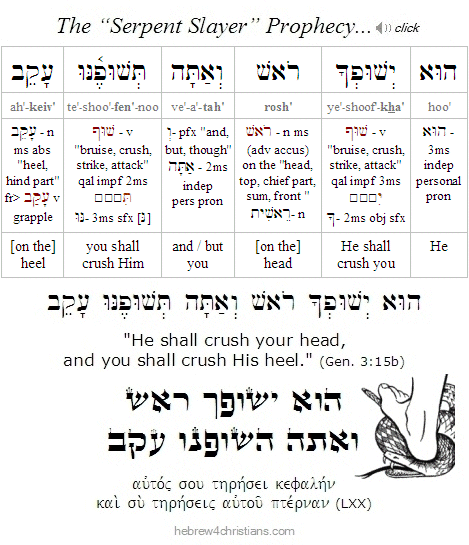 |
Endurance and Suffering...

01.31.20 (Shevat 5, 5780) "Pray that you may never have to endure all that you can learn to bear." Yes, though we must also believe that God "will not let us be tested beyond what we are able to bear, but with the test will also provide the way of escape (τὴν ἔκβασιν) so that we may be able to endure it" (1 Cor. 10:13). Indeed, in light of suffering what we really need is perseverance, or what the New Testament calls hupomone (ὑπομονή), a word that means "remaining [μένω] under [ὑπο]" the Divine Presence while being tested (the English word "suffer" comes from the Latin word sufferre, from sub- (under) + ferre, to carry, and therefore denotes "bearing under" difficulty). Suffering people often do not need moral platitudes or correction from others, but rather the will to believe, the strength to stay constant, and the rise of hope that gives life to simple prayers that focus the heart upon the Lord's Presence: "God have mercy..." "Help me, O God..." "I need Thee, O Lord..." When we receive grace to faithfully suffer, we hear the Spirit whispering back to us: "Be not afraid..." "Live in me..." "Walk in the light..." "I am with you always..." "You are loved..."
רַבּוֹת רָעוֹת צַדִּיק
וּמִכֻּלָּם יַצִּילֶנּוּ יְהוָה
ra·boht · ra·oht · tza·deek
oo·mee·koo-lam · ya·tzee·le'·noo · Adonai

"Many are the afflictions of the righteous
but the LORD delivers him from them all." (Psalm 34:19)
Download Study Card

Hebrew Lesson:
Psalm 34:19 Hebrew reading (click):
Life itself weans us from life as we learn that nothing ultimately belongs to us... We must learn to make peace with our sorrows and disappointments, to let go of them and to accept that this day, despite its frailty and trouble, is a precious gift from above. "My peace I give to you" (שלי שלום אני אתן לך), said Yeshua, "not as the world gives, I give to you" (John 14:27). Not as the world gives... When we let go, when we put everything in God's hands, we acknowledge that all we have is a gift from God.
With all your heart...
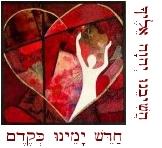
01.31.20 (Shevat 5, 5780) We love God because He is our Creator, our Breath of Life, the Source of all true good, our Savior, our Healer, and the substance of all that is real and significant... We are able to love because he discloses his love to us (1 John 4:19). We respond to God with a heart of gratitude and love, not out of fear of punishment; with a whole heart (כָּל־לֵבָב), not a heart divided by fear. The Torah says you are to love God bekhol levavkha (בְּכָל־לְבָבְךָ), "with all your heart" – like Abraham, who loved God wholeheartedly; and you are to love God bekhol nafshekha (בְּכָל־נַפְשְׁךָ), "with all your soul" – like Isaac, who gave his soul over to God, willing to be sacrificed for our atonement; and you are to love God bekhol me'odekha (בְּכָל־מְאדֶךָ), "with all your muchness" – like Jacob who gave from his substance to support his children, the sons of Levi. And these words, namely, the words that return us to God's love, shall today be on your heart (הַיּוֹם עַל־לְבָבֶךָ), which means we are to love God at all times, for this is the day that the LORD has made...
וְאָהַבְתָּ אֵת יהוה אֱלהֶיךָ בְּכָל־לְבָבְךָ
וּבְכָל־נַפְשְׁךָ וּבְכָל־מְאדֶךָ
ve·a·ha'·ve·ta · et · Adonai · E·lo·hey'·kha · be·khol-le·va'·ve·ka
oov'khol-naf'·she·kha · oov'khol-me·o·de'·kha

"You shall love the Lord your God with all your heart
and with all your soul and with all your strength."
(Deut. 6:5)

The Power of God (גְּבוּרַת אֱלהִים)

01.31.20 (Shevat 5, 5780) "For the word of the cross [i.e., ῾Ο λόγος ὁ τοῦ σταυροῦ - i.e., the meaning of the cross] is folly to those who are perishing..." But why is it regarded it as folly? Surely not because Yeshua died as a martyr for his faith, for even worldly wisdom may acknowledge the nobility of this (for example, when it esteems the death of the pagan philosopher Socrates at the hands of the Athenians). No, the offense of the cross comes from its message that we are helpless and lost apart from divine intervention. The cross is an affront to the aspirations of human reason because it states that through the lowliness and sacrifice of Yeshua - and only through Him - may a person be healed by God; and there is categorically no other way. The cross therefore exposes the sham of so-called worldly wisdom, proving it to be worthless and vain. However, to the person of faith, the cross is gevurat Elohim - "the power of God (גְּבוּרַת אֱלהִים) for those being saved" (1 Cor. 1:18).
The Hebrew word for salvation (i.e., yeshuah: יְשׁוּעָה) comes from a root (i.e., yasha: ישׁע) that means to "make wide," to make "broad," "spacious," or "free [from what blocks or holds in bondage]." The word is used to describe deliverance from Egypt (Exod. 14:13; Deut. 33:29), victory over Israel's enemies (Num. 10:9; Psalm 44:7), release from exile (Isa. 46:13; Ezek. 44:22), and the divine preservation and blessing of the Jewish people (Jer. 14:8). The word is also associated with deliverance from sin and its penalty (Jer. 17:14; Psalm 51:12,14). The LORD God of Israel is called the Savior (Isa. 45:21 - (i.e., moshia [מוֹשִׁיעַ] - from the same root). The Name transliterated as "Jesus" is Yehoshua (יְהוֹשׁוּעַ) in Hebrew, from יְהוָה and יָשַׁע, which means "YHVH is salvation" or "YHVH saves." As it is uttered by the agency of the Ruach ha'emet: אָנֹכִי אָנֹכִי יְהוָה וְאֵין מִבַּלְעָדַי מוֹשִׁיעַ - "I, even I am the LORD, and besides me there is no Savior" (Isa. 43:11).
אָנכִי אָנכִי יְהוָה
וְאֵין מִבַּלְעָדַי מוֹשִׁיעַ
a·no·khee · a·no·khee · Adonai
ve·ein · mee·bal·a·dai · mo·shee'·a

"I, even I, am the LORD,
and besides me there is no Savior."
(Isa. 43:11)

Incomprehensibilty and Faith...
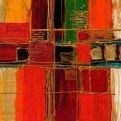
01.30.20 (Shevat 4, 5780) I struggle with pain that sometimes so overwhelms me that all I can do is cry out to God for mercy, to ask Him for a moment of respite, and to plead (again and again) for divine healing... In the midst of this agony my heart sometimes desperately cries out, "Where is God in this harrowing moment?" I am pressed to the edge of death itself, and though I have been delivered, often there is a residual "aftershock" that leaves me exhausted and bewildered. The trouble is not one of unbelief, but rather of belief itself: I do not doubt for a second that God sees and knows my anguish, nor do I question his great love for me... Still, what troubles me is the incomprehensibility of the struggle, the rawness of the fight, even as I recover from intense wrestling near the edge itself. I quote Miguel de Unamuno in this connection: "Those who believe they believe in God, but without passion in the heart, without anguish of mind, without uncertainty, without doubt, and even at times without despair, believe only in the idea of God, and not in God Himself." And perhaps this is the hidden blessing of such extreme affliction, for it throws me upon God and makes me as viscerally desperate for him as someone who is drowning gasps for his next breath of air...
Lord, when I feel lost and alone, remind me again how you have found me, how you have prepared a place for me, and that's all I really need to be home... If I must suffer, please let it neither embitter nor shatter me. If I cry out in protest or despair, accept my heartache and grant me your compassion and comfort. When my faith falters, reveal to me that you are always near. Help me, Yeshua, to trust in the midst of these my afflictions. Amen.
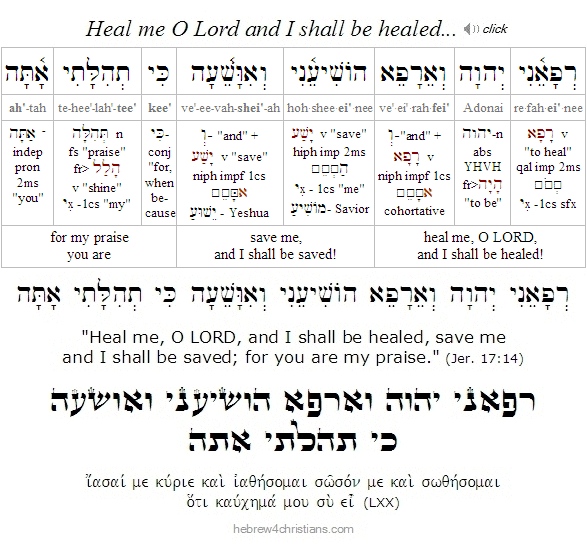 |
Exodus and Freedom...
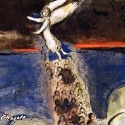
[ The following concerns the Exodus from Egypt and our Torah reading, parashat Bo... ]
01.30.20 (Shevat 4, 5780) God's redemption is both "out of" and "into." The LORD takes us out of hell, bondage, and death into heaven, liberty, and eternal life. But note that he takes us out only to bring us back in; he redeems us to bring us to Sinai; he writes Torah upon our hearts; he makes us "in but not of" the world (John 17:15-16). Every Passover we retell the story of our redemption. We remember how we bitterly cried because of our bondage and how God graciously delivered us by the blood of the lamb. We rejoice that we are called am segulah (עַם סְגֻלָּה) - God's selected "treasured people." Because of God's love demonstrated at the cross, we are transferred (μεθίστημι) from the realm of darkness into the kingdom of the Divine Presence (Col. 1:13). Today may we live as salt and light to a perverse world, sharing the message of God's great liberation from the power of sin, death, and evil...
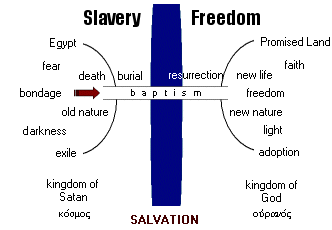 |
Sequence of the Plagues...

01.30.20 (Shevat 4, 5780) In parashat Bo we arrive at the successful conclusion of the LORD's campaign to free Israel from bondage in Egypt. Immediately following the description of ninth plague (i.e., the plague of darkness), redemption through the sacrifice of the Passover lamb (קָרְבָּן פֶּסַה) is explained. The Jewish people were saved by the blood of the lamb, just as today we call upon Yeshua as the Lamb of God. Notice that the word בּא ("go") and פרעה ("Pharoah") together equal the gematria of משׁיח ("mashiach"), providing a hint of the coming Messianic redemption that was foreshadowed in Egypt. Every jot and tittle...
Regarding the sequence of the plagues, Rabbi Bechaye (11th century, Spain) wrote that they followed one another over a twelve-month period. On Nisan 15 God spoke to Moses from the burning bush and commissioned him to go to Pharaoh. On Nisan 21, Moses told his father-in-law Yitro (Jethro) of his mission and left for Egypt. Near the end of the month of Nisan, Moses immediately went before Pharaoh and warned him to release the Jews. For the next three months (Iyyar, Sivan, and Tammuz), Moses went into hiding and instructed the elders of Israel regarding their coming deliverance. The plague of blood began on the first of Av and lasted seven days. A respite of three weeks occurred before the next plague (frogs). This was the pattern for all the ten plagues (i.e., roughly a plague a month). The last plague - that of the death of the firstborn - occurred in the month of Nisan, a year after Moses first warned Pharaoh (Exod. 4:22-23). The period of the plagues therefore totaled twelve full months, at least according to the sages of Jewish tradition (Tzenah Urenah):
- Av 1 - Blood (i.e., dam: דָם)
- Elul 1 - Frogs (i.e., tzefarde'a: צְּפַרְדֵּעַ)
- Tishri 1 - Lice (i.e., kinim: כִּנִּים)
- Cheshvan 1 - Swarms (i.e., arov: עָרוֹב)
- Kislev 1 - Pestilence (i.e., dever: דֶּבֶר)
- Tevet 1 - Boils (i.e., shechin: שְׁחִין)
- Shevat 1 - Hail and Fire (i.e., barad: בָּרָד)
- Adar 1 - Locusts (i.e., arbeh: אַרְבֶּה)
- Nisan 1 - Darkness (i.e., choshekh: חוֹשֶך)
- Nisan 15 - Death of the firstborn (i.e., makat bechorim: מַכַּת בְּכוֹרוֹת)
Here is a simplified diagram of the sequence given in the midrash:
The story of yetziat mitzraim (the Exodus from Egypt) is to be retold to every generation, and its lessons are to be applied to every age and place. Hence the Passover Seder and its focus on the needs of children. The Hebrew word for "education" is chinukh, a word that shares the same root as the word "chanukah" (חֲנֻכָּה, dedication). We "tell the story so that we may know" that the LORD is God (Exod. 10:2). Education is ultimately devotional. God called the people of Israel to cleave to Him and walk in His ways.... (more here)
Personal Note: I am sick with another fever friends; your prayers are appreciated.
Torah of Death and Life....

01.29.20 (Shevat 3, 5780) Why does God want us to face the truth about death? Why does Moses ask God to teach us to "number of our days?" (Psalm 90:12). The reason is that by nature people deny the reality of death - they hide their eyes from it, ignore it, and pretend it's not there - so they can continue to live under the illusion that they are in control of their lives, that they are the center, that they are immortal little "gods." Death threatens the ego and humbles us to confess the truth about life, namely that we are not in control, that we cannot choose to be immortals, that we do not have power to exist in ourselves, and therefore we need life from a different source - spiritual life - wherein we receive a new identity and a new being found in relation to God.
The "natural man" regards death as an offense or as "absurd" because it splits us in two, creating a "divided house" that cannot stand. The ego demands be god-like, important, valued as sacred, etc., yet the prospect of death crushes the aspiration and yields alienation from reality. This creates a painful tension or dualism within the heart where the meaning and purpose of life is lost.... The message of the gospel begins precisely there, however, speaking to broken people who thirst for life but find themselves living on death row - people who are humbled and who understand they cannot heal themselves from the "sickness unto death," as Kierkegaard used the term. The remedy is not to deny death or to live as if death is not a genuine horror, but to understand it as our natural estate, brought about by sin that exalts the ego over the God who made us.
"Die before you die; there is no chance after." (C.S. Lewis)
The power of the gospel is to partake in a new source of life and to be healed from the sickness of death by God's miracle in Messiah (2 Cor. 5:17). "Jesus saves" is not a cliché for the faith but the sober truth of reality. It is by our union or identification with Him, by the agency of the Holy Spirit, that we are imparted new existence, true spiritual being, that is not subject to the natural law of sin and death (Col. 3:9-11). Being "in Messiah" means you are "justified," that is, welcomed, affirmed, accepted and declared righteous by God, and that you are set free from the condition of "being unto death." You partake and share in the life (relationship) of God based on his redeeming love: you are "adopted" by God, made a member of his "household," and attain the inheritance of which is eternal life. Consequently you cry out "Abba, Father" to God who watches over you and leads you through the days of your sojourn here on earth (Rom. 3:32). Despite walking through the shadowy byways and tribulations of this world, you refuse to let death define you or be the last word: you trust that your Father is with you, working all things for your ultimate good (Rom. 8:28). You know who you are, where you are going, and what your end is because of Yeshua our Lord.
Facing death is essential because the message of the gospel must be grounded and framed in the language of our wretched desperation as lost souls in this world (Rom. 7:24). Death is the central problem of existence, and death is therefore the "propaedeutic" that leads us to the salvation found in Yeshua the Messiah... When we confront the truth of our condition, there is real hope for healing. "Die before you die; there is no chance after" (C.S. Lewis).
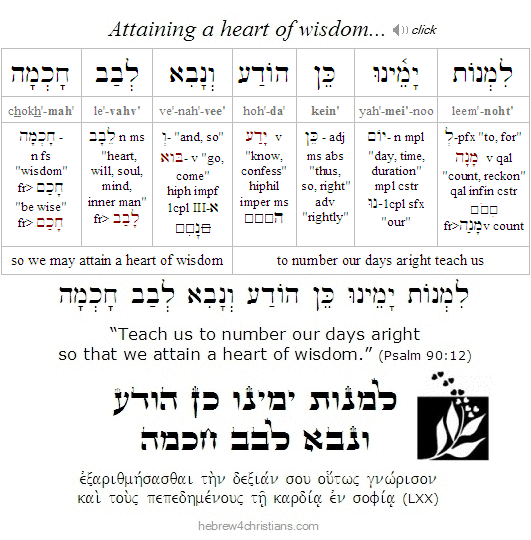 |
The Very First Passover...
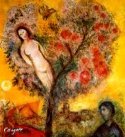
[ The following is related to this week's Torah reading, parashat Bo (i.e., Exod. 10:1-13:16). ]
01.29.20 (Shevat 3, 5780) Passover is the archetypal picture of the redemption of God. Its theme goes all the way back to the beginning, to the primordial orchard of Eden itself, when Adam and Eve disobeyed God and ate from the forbidden tree. Because of their transgression, our original ancestors incurred the plague of death and were exiled from the Divine Presence, though God graciously promised to heal them through the coming Seed of the woman – the Savior who would crush the head of the serpent and break the fangs of his venomous sting (Gen. 3:15). Soon after making this great promise, God clothed our primordial parents with the skin of a sacrificed lamb (Gen. 3:21), linking their coming deliverance with the "Lamb of God slain from the foundation of the world" (1 Pet. 1:18-20). The very first "Passover" was in the garden. The story extends to the world to come, too, where in the redeemed paradise of God we will celebrate the victory of the Lamb who was slain for our redemption (Rev. 5:12-13, Rev. 19:7).
The great story of our redemption is revealed on two levels in Scripture - one that concerns the paradise of Eden (the universal level), and the other that concerns the paradise of Israel (the particular level). Therefore Yeshua is both rightly called the "Lamb of God who takes away the sins of the world" (John 1:29) and "the Messiah our Passover Lamb who has been sacrificed for us" (1 Cor. 5:7). Likewise he is both called the "Seed of the woman," and "the Son of David"; the "Second Adam," and the "King of the Jews," and so on. The story of Israel's redemption in Egypt therefore serves as an allegory of both the universal salvation promised in Eden (i.e., the lamb slain from the foundation of the world) as well as the revelation of the sacrificial ministry of Yeshua as Israel's promised Messiah. Yeshua is both the Savior of the world as well as Israel's true King and Deliverer.
Note: For more on this subject, please see the articles, "The Gospel in the Garden" and "The Very First Passover."
Focus and Simplicity...

01.29.20 (Shevat 3, 5780) Some people tend to "overthink" matters and make things more difficult than necessary. For example, someone once asked Nachman of Breslov (נחמן מברסלב), a great grandson of the Baal Shem Tov, "When I am praying and I mention HaShem's holy name, what profound thoughts, what deep intentions, should I have in mind?" Rabbi Nachman answered, "Isn't the simple meaning - God - enough for you?" Indeed, we must be careful not to lose sight of what is really important. We should serve God with "simplicity" (תֻּמָּה), that is, sincerely, with all our hearts and with straightforward intent. We should use a "single eye" and resist the temptation to "read into things" (Matt. 6:22-23). As it is written in the Torah, "be simple (תָּמִים) with the LORD your God."
תָּמִים תִּהְיֶה עִם יְהוָה אֱלהֶיךָ
ta·meem · tee·he·yeh · eem · Adonai · e·lo·hey'·kha

"You shall be wholehearted with the LORD your God"
(Deut. 18:13)


In the Sefer Torah (i.e., the handwritten Torah scroll), the first letter of the word tamim ("simple, wholehearted") is written extra LARGE in order to emphasize its importance. Notice also the little word im (עִם), "with," that follows in this verse. This hearkens to the simplicity spoken of by the prophet: "What does the LORD require of you but to do justice, and to love kindness (chesed), and to walk humbly with your God?" (Micah 6:8). Having a humble heart walks "with" the LORD. Genuine humility begins with the awareness that 1) there is a God and 2) you are not Him.... It is the practice of "knowing before whom you stand" and living your life in light of this fundamental truth.
Ironically enough, we can evade the truth by means of being overly "sophisticated" when we read the Scriptures. The essential truth is plain enough, but we want to split hairs, consult a variety of commentaries, engage in mystical speculations, and so on, all in an attempt to defend ourselves against hearing from the Spirit of God! But as it says in Scriptures: holekh batom yelekh betach, "Whoever walks in simplicity (בַּתּם) walks securely" (Prov. 10:9).
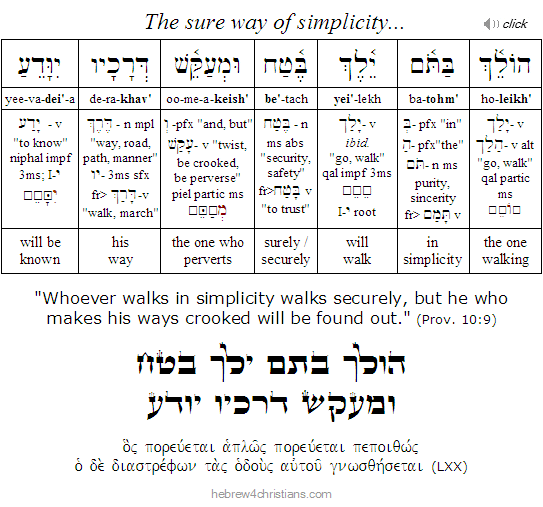 |
Soren Kierkegaard once lamented: "The matter is quite simple. The Bible is very easy to understand. But we Christians are a bunch of scheming swindlers. We pretend to be unable to understand it because we know very well that the minute we understand we are obliged to act accordingly." There is a very real danger of "thinking about" truth rather than living it. For instance, you might study the Psalms as literature and attempt to understand the nuances of Hebrew poetry, but that is altogether different than reciting the psalms with inner passion, with simple conviction and the earnest desire to unite our heart's cry with the devotion that gave life to the words... We must read with a heart of faith to unlock the truth that speaks to the heart. If you believe only what you understand, your faith is actually grounded in your own reasoning, not in the Divine Voice of Love...
The way of trust is always a matter of heart... The Spirit of God speaks gently: "My child, give me your heart, and let your eyes observe my ways" (Prov. 23:26). When we call God "Abba," we are not using a formal name that indicates distance, but rather a term that evokes intimate closeness and reliance. Calling out to God as "Abba" signifies that we genuinely accept that God regards us as his beloved child...
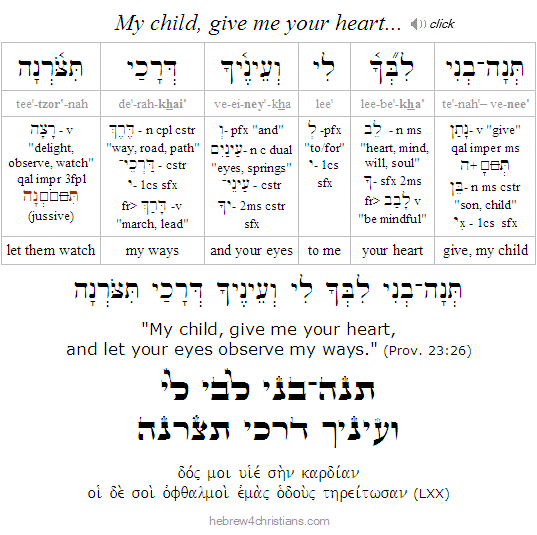 |
It is written that "God protects the simple" (Psalm 116:6). "Love believes everything" (1 Cor. 13:7), even if that may make the lover appear to be a fool (Prov. 14:15). Rabbi Nachman comments, "This is because, while you will believe in that which is false and foolish, you will also believe the truth. In this you are better off than the person who is sophisticated and skeptical of everything. He begins by ridiculing foolishness and falsehood, but eventually ends up ridiculing everything – including the truth!" The skeptic ultimately is a coward who is more afraid of being deceived than he is willing to risk living in the truth.
Testing and Endurance...

01.28.20 (Shevat 2, 5780) When Paul wrote, "in everything give thanks" (1 Thess. 5:18), he surely foresaw the prospect of suffering. Indeed, it is through "much tribulation" we enter the kingdom of God (Acts 14:22). We do not ask God to insulate us from all troubles, but rather to be given courage to carry on despite whatever tests he permits in our lives. Hence one of our standard blessings is: בָּרוּךְ אַתָּה יהוה הַנּוֹתֵּן לַיָּעֵף כּחַ / barukh attah Adonai ha'noten lai'ya'ef koach: "Blessed are You, LORD, who gives strength to the weak." The Lord never "breaks" before offering His blessing (Mark 6:41), and personal brokenness is the means of instilling His character within us (Gal. 2:20). Indeed in our Torah we read: "I am the LORD your Healer" (אֲנִי יְהוָה רפְאֶךָ; Exod. 15:26). The sages comment that just as someone who wishes to repair an object will need to take it apart, so with God. When we seem to be broken in pieces we cry out for deliverance and healing, but inwardly we are being conformed to the deeper image of Messiah. Like Jacob, we wrestle with God to know our wound as well as our healing. As it is written in our Scriptures: "So we do not lose heart. Though our outer self is wasting away (διαφθείρεται), our inner self is being renewed day by day. For this light momentary affliction (θλῖψις) is preparing for us an eternal weight of glory beyond all comparison, as we look not to the things that are seen but to the things that are unseen. For the things that are seen are transient, but the things that are unseen are eternal" (2 Cor. 4:16-19). As our Scriptures also affirm, God is "the Father of Mercies and God of all comfort" (אַב הָרַחֲמִים וֵאלהֵי כָּל־נֶחָמָה). The Lord "comforts us" (literally, "calls us to His side," παρακαλέω) in our afflictions so that we may be able to comfort those who are afflicted with the same comfort with which we ourselves are comforted by God (2 Cor. 1:3-4).
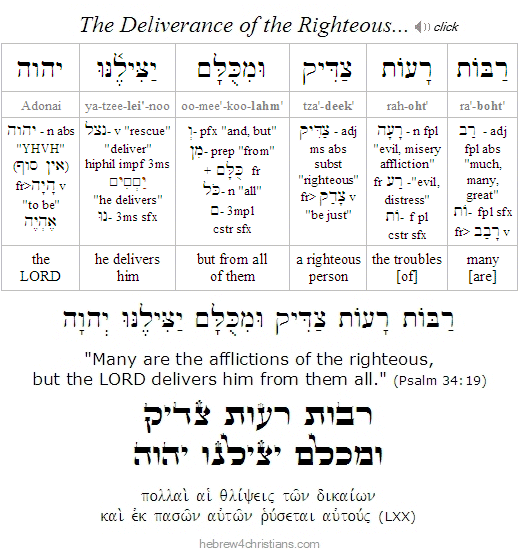 |
Redemption and Holiness...

01.28.20 (Shevat 2, 5780) In our Torah portion for this week (i.e., Bo) we revisit the institution of the Passover sacrifice and the deliverance of the Israelites from their bondage in Egypt. Later in the Torah we read God's reason for the redemption: "For I am the LORD who brought you up out of the land of Egypt to be your God. You shall be holy, for I am holy" (Lev. 11:45). Because we are God's people, his redeemed children, we are made holy, just as God is holy (1 Pet. 1:15-16). Holiness, however, is not a matter of what you do (such as wrapping yourself in religious rituals) but instead is a matter of what you "allow" to happen: You let go and allow yourself to be rescued and taken up from the "depths of Egypt" to be with God. Holiness is something you receive by faith; it is a gift of being "set apart" to be sacred and beloved by God. Genuine holiness (i.e., kedushah) is connected with love and grace.
In Hebrew, the word kedushah (קְדוּשָׁה) means sanctity or "set-apartness" (other Hebrew words that use this root include kadosh (holy), Kiddush (sanctifying the wine), Kaddish (sanctifying the Name), kiddushin (the ring ceremony at a marriage), and so on). Kadosh connotes the sphere of the sacred that is radically separate from all that is sinful and profane. As such, it is lofty and elevated (Isa. 57:15), beyond all comparison and utterly unique (Isa. 40:25), entirely righteous (Isa. 5:16), glorious and awesome (Psalm 99:3), full of light and power (Isa. 10:7), and is chosen and favored as God's own (Ezek. 22:26).
 |
Retelling the Story...

01.28.20 (Shevat 2, 5780) In our Torah portion this week (i.e., parashat Bo) we are commanded to retell "in the hearing of your son and your grandson" how the LORD overthrew the arrogance of the Egyptians and performed wonders to deliver us" (Exod. 10:2). This commandment is the basis of the Passover haggadah (i.e., הַגָּדָה, "telling"), the "oral tradition" of our faith, when we personally retell the story from generation to generation so that the spirit of the message is not lost. We participate in the Passover seder to make it "our own story," a part of who we are. Therefore b'khol-dor vador: "Every Jew must consider himself to have been personally redeemed from Egypt." Retelling the story of the exodus enables us to "know that I am the LORD" (Exod. 10:2). We recall the words, bishvili nivra ha'olam – "For my sake was this world created," while we also recall the words, anokhi afar ve'efer – "I am but dust and ashes." When we retell the story of the great redemption, we strengthen our faith and better know the LORD our Savior.
Indeed God admonishes that the story of our redemption should be "as a sign on your hand and as a memorial (זִכָּרוֹן) between your eyes, that the Torah of the LORD may be in your mouth" (Exod. 13:9). We are instructed to "remember" (זָכַר) over and over again because our disease, our sickness of heart, induces us to forget how we were enslaved in the house of bondage. We must consciously remember and never forget that only by means of God's strong hand (בְּיָד חֲזָקָה) are we ever made free (John 8:36).
וְהָיָה לְךָ לְאוֹת עַל־יָדְךָ
וּלְזִכָּרוֹן בֵּין עֵינֶיךָ
לְמַעַן תִּהְיֶה תּוֹרַת יְהוָה בְּפִיךָ
כִּי בְּיָד חֲזָקָה הוֹצִאֲךָ יְהוָה מִמִּצְרָיִם
ve·ha·yah · le·kha · le·oht · al-yah·de·kha
ool·zee'·kah·rohn · bein · ei·ney'·kha
le·ma'·an · tee·he·yeh · toh·raht · Adonai · be·fee'·kha
kee · be·yahd · cha·zah·kah · ho·tzee·a·kha · Adonai · mee·meetz·rah'·yeem

"And it shall be to you as a sign on your hand
and for a memorial between your eyes,
that the Torah of the LORD may be in your mouth.
For with a strong hand the LORD has brought you out of Egypt."
(Exod. 13:9)

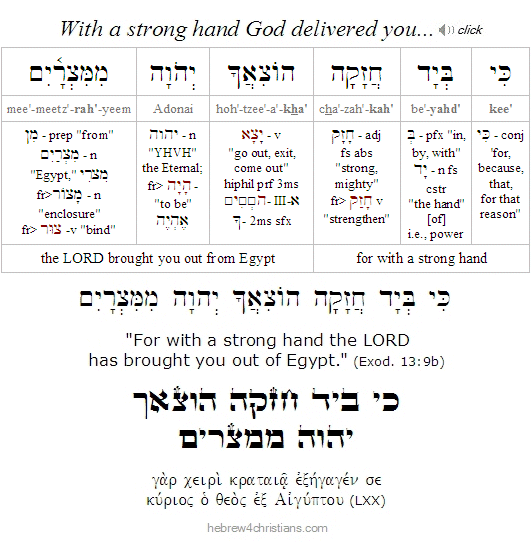
Exodus and Tradition...
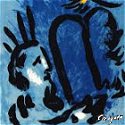
01.28.20 (Shevat 2, 5780) How important is tradition in our lives? So important that we could not understand even the first word of the Scriptures without it ... There is a story that illustrates this point. A pagan came to Hillel seeking to convert but was troubled with the idea of tradition, though he accepted the idea of the written Scriptures. Since the man did not know how to read Hebrew, however, Hillel began pointing to the letters in the written Torah to teach him the alphabet: "This is Aleph... this is Bet... this is Gimmel," and so on, until the man began to understand the letters of the Aleph-Bet. "Now come tomorrow, and I will teach you more." The next day, Hillel pointed to the exact same letters but reversed their names, "This is Gimmel... this is Aleph... this is Bet," and so on. The convert was confused: "But yesterday you said just the opposite!" Hillel replied, "Now you have had your first lesson. You see that the written word alone is insufficient, and we need the tradition to explain God's Word." Another way to make this point is to say that the Torah was not revealed along with a dictionary that defines the meaning of its words....
All this is said to remind us that the transmission of Torah "from generation to generation" demands that we trust. Indeed the very concept of "Torah" (or Scripture) is bound up with trust and community... This is true of the written word (i.e., trusting in scribal traditions that preserved the Scriptures for us), as well as the oral word (i.e., the customs, interpretations, translations, and wisdom that explain the meaning of the words themselves). Knowledge has been defined as "justified true belief," which implies that there can never be knowledge without faith. It is ludicrous to think that we can translate or comprehend the Scriptures in a vacuum - without any help from others... We must humble ourselves and become "like little children" to learn from those who have gone before us, and this is why the Jewish value of Talmud Torah - teaching children the words and values of Torah - is regarded as so important. As the Talmud puts it, "The world exists because of the breath of the schoolchildren who study Torah" (Shabbat 119b).
In Hebrew the word chinukh (חִנּוּךְ) means "education," a word that shares the same root as "chanukah" (חֲנֻכָּה, "dedication"). Unlike the Greek ideal that regards education as some sort of Platonic "enlightenment" (i.e., being "led out" of the cave of ignorance), the Jewish ideal implies dedication to God and His concrete purposes on the earth. This ideal goes beyond the process of merely transmitting factual information, since dedication must be modeled (lived) as well as intellectually taught. Maimonides noted that the Hebrew word chinukh comes from the Torah's description of dedicating a tool for use at the Holy Altar, "habituating the tool for its work." In other words, godly education is a process of modeling how to be made into a "fit vessel" for the service of God in this world. All other ends of knowledge ultimately exist for this purpose, and rightly understood, then, education may be regarded as a form of worship.
Disciples of Yeshua are called talmidim (תַּלְמִידִים) - a word that comes from lamad (לָמַד) meaning "to learn" (the Hebrew word for teacher is melamad (מְלַמֵּד) from the same root). Education is therefore foundational to being a disciple of the Messiah, and the great commission is for each of us to share His teaching with others (Matt. 28:19-20). May God help each of us to be students who are dedicated to living for the sake of Yeshua's Name.
The Torah of Passover...
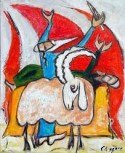
[ The following is related to this week's Torah reading, parashat Bo... ]
01.28.20 (Shevat 2, 5780) The very first occurrence of the word "Torah" (תּוֹרָה) in the Scriptures refers to the faith of Abraham (Gen. 26:5), and the second occurrence refers to the ordinance of Passover: "There shall be one law (תּוֹרָה) for the native and for the stranger who sojourns among you" (Exod. 12:49). There is a link here. Abraham lived before the time of the Exodus, of course, and therefore he obeyed the Torah of Passover by means of the Akedah (the sacrifice of his beloved son Isaac and the substitution of the lamb of God upon the altar). Abraham's faith revealed that the inner meaning of Torah is that the "righteous shall live by faith" (Hab. 2:4, Rom. 1:17), that is, by trusting God's justification of the sinner (Heb. 11:17-19). The Torah of Passover likewise teaches that redemption from death is possible through the exchange of an innocent sacrificial victim. The blood of the lamb was "a sign" of imputed righteousness obtained entirely by faith - with no "leaven," or human works, added. This is the "korban" principle of "life-for-life" that underlies the sacrificial system of the Tabernacle as well. Ultimately all true Torah points to Yeshua, the Lamb of God, who is the divinely appointed Redeemer and promised Slayer of the Serpent...
"When the fullness of time (τὸ πλήρωμα τοῦ χρόνου) had come, God sent forth his Son, born of woman, born under the Torah, to redeem those who were under the Torah, so that we might receive adoption as sons" (Gal. 4:4-5).
 |
Knowing God's Name...

01.27.20 (Shevat 1, 5780) You may feel anxious about knowing God, about how to relate to him or how to understand or interpret the Scriptures, though the heart can only know the essential meaning of God in the state of its need, as its ultimate concern, and therefore unless you cry out "from the depths" of your being, you are merely intellectualizing or playing games... After all, the inner heart asks "How can I find God?" "How can I relate to God?" "How can I find hope and life?" but the answers to such questions are found by personal encounter with the reality of the Spirit of God, not by theological rationalizations. It is one thing to say "Lord" or "Master" but quite another to say "my Lord," or "my Master..." The Torah teaches that name of God refers to that which God alone is, namely, the "I am that I am"(אהְיֶה אֲשֶׁר אֶהְיֶה) which is unknowable apart from the miracle of disclosure within the heart. That is why we find so many different names and titles for God in Scripture, for these are disclosures to the heart in a time of its need. For instance, to know God's name as "Savior" (מוֹשִׁיעַ) means experiencing deliverance from your struggles, pains, and fears by the agency of God's victory, comfort, and consolation as given in Yeshua. However, unlike the experience of worldly education wherein you might acquire skills to accomplish certain tasks, spiritual education leads to a "dark clouds of unknowing" where you must regularly confess your weakness and your need for divine connection. God's name is therefore bound up with the basic quest within your heart for meaning, healing, and the desire of unconditional love. Knowing the name of God is an ongoing process as you struggle to accept and trust your life to be a blessing, and as you are enabled by the Holy Spirit to say "yes" and "amen" to life despite your failures, pains, fears, sorrows, and even your unanswered questions... It means opening your heart to life and believing that you are beloved, that you are accepted, that you will be okay, and that God is holding you in his everlasting arms. Amen, friend, may you know the meaning of that Name.
Thomas Aquinas' most significant work was his Summa theologiae or 'Summary of Theology,' a massive book that attempted to "systematize" all of Christian theology. He worked on it for many years, but when he was nearly finished he underwent a spiritual experience that, as he himself explained, made everything he had written "seem like straw." He thereafter gave up writing about "theology" after he encountered the Reality itself. Aquinas apparently moved from the realm of theoretical emunah (i.e., cognitive faith) to the realm of heartfelt bittachon (i.e., existential trust). Similarly, toward the end of his life and career someone asked the prolific theologian Karl Barth if he could sum up all that he had learned and written. Barth thought a bit and then replied, "Jesus loves me, this I know, for the Bible tells me so."
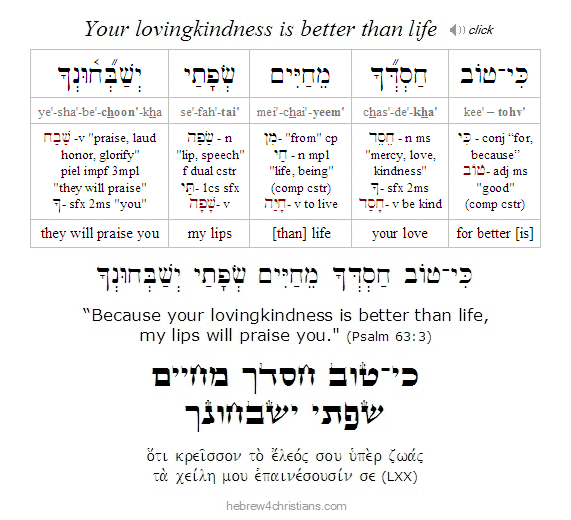 |
New Beginnings...

[ The following is related to this week's Torah reading, parashat Bo (i.e., Exod. 10:1-13:16). ]
01.27.20 (Shevat 1, 5780) The calendar of ancient Egypt, like our present Gregorian calendar, followed the course of the sun. The sun symbolized the power of the Egyptian sun god Ra (Re) who was also considered the creator and giver of life in some Egyptian myths. As far back as 2700 BC, Ra was regarded as the great god of heaven, King of all the gods, and lord of the resurrected dead. The daily rising sun was a symbol of creation (or the "eye" of Ra), and the shape of the pyramid is thought represent the descending rays of the sun. The Pharaoh, like the sun, was sometimes called the "son of Ra" and said to oversee everything upon the earth (note: the name "Ramses" can mean "Ra bore him," though it is more likely that Amenhotep II [a name based on the merging of the gods Amun and Ra] was the Pharoah of the Exodus). Interestingly, the Hebrew word for evil or bad is ra' (רַע), and the ayin ha-ra, or "evil eye," might derive from this association. From a "macro" perspective, the call of Abraham out of Mesopotamia (Shinar-Babylonia) can be thought of as the beginning of God's judgment of the religion/mythology of ancient Egypt...
The very first word of Torah indicates the awareness of the significance of time - בְּרֵאשִׁית - "in the beginning..." (Gen. 1:1), and according to Jewish tradition, the very first commandment given to the children of Israel (as a whole) was that of Rosh Chodesh (ראש חודש), or the declaration of the start (or head) of the "new month," particularly with regard to the first month of their redemption (Exod. 12:2).
הַחֹדֶשׁ הַזֶּה לָכֶם רֹאשׁ חֳדָשִׁים
רִאשׁוֹן הוּא לָכֶם לְחָדְשֵׁי הַשָּׁנָה
ha·cho·desh · ha·zeh · la·khem · rosh · cho·da·sheem
ree·shohn · hoo · la·khem · le·chod·shei · ha·sha·nah

"This month shall be for you the beginning of months;
it shall be the first month of the year for you." (Exod. 12:2)

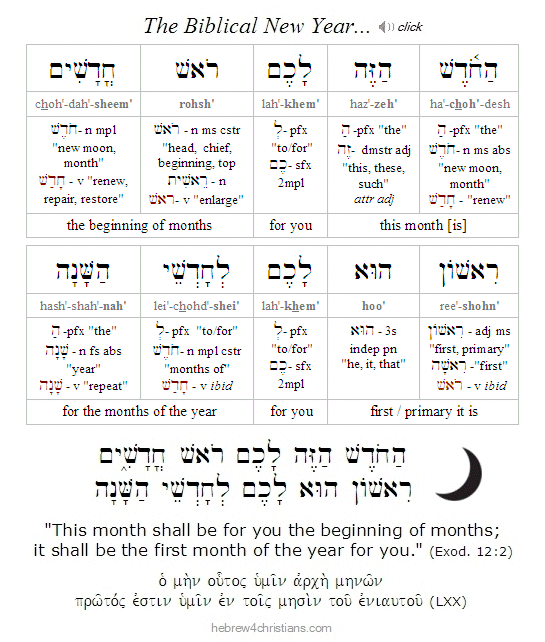
In other words, Passover month was to begin Israel's year (i.e., Rosh Chodashim). Note that the word for month (i.e., chodesh) comes from the root chadash (חָדָש), meaning "new," and therefore the Passover redemption (chodesh yeshuah) was intended to mark a "new beginning" for the Jewish people. And indeed, God marks the start of our personal redemption as the beginning of our life as a new creation (2 Cor. 5:17), just as Yeshua is the "first of the firstfruits" of God's redeemed humanity (1 Cor. 15:45-49). God wanted Israel to look to the moon as their timepiece. Just as the moon wanes and disappears at the end of each month, but returns and waxes again to fullness, so we suffer until the return of our beloved Messiah Yeshua, who will restore the glory of God fully upon the earth.
Should Christians Observe the "New Moon"?
In Colossians 2:16-17 the Apostle Paul writes, "Therefore let no one pass judgment on you in questions of food and drink, or with regard to a festival or a new moon or a Sabbath. These are a shadow of the things to come, but the substance belongs to Christ." But what does verse 17 mean? How can we understand it? The Greek text reads: ἅ ἐστιν σκιὰ τῶν μελλόντων, τὸ δὲ σῶμα τοῦ Χριστοῦ, but note that the shadow (i.e., skia: σκιὰ) is of the things to come (τῶν μελλόντων) - which was written in reference to the future (at the time of Paul's writing). The word translated "substance" (i.e., soma: σῶμα) is perhaps better rendered as "body," and may refer to the body the Messiah, i.e., the followers of Yeshua... In light of this, are we supposed to recognize the new moon or not?
Well, since we are not under the terms of the Sinai covenant but the New Covenant, the short answer is that we are not obligated to observe this appointed time any more than we are obligated to keep kosher, to sacrifice a sheep during Passover, or to elevate the weekly Sabbath above other days of the week (Rom. 14:5-6). However, according to the prophet Isaiah, in the Millennial Kingdom to come people will indeed observe Rosh Chodesh: "It shall be that from one new moon to another, and from one sabbath to another, all flesh shall come to worship before me, declares the LORD" (Isa. 66:23), and the prophet Ezekiel further mentions Rosh Chodesh in the future Millennial Temple of Zion (Ezek. 46:1-7).
וְהָיָה מִדֵּי־חֹדֶשׁ בְּחָדְשׁוֹ
וּמִדֵּי שַׁבָּת בְּשַׁבַּתּוֹ
יָבוֹא כָל־בָּשָׂר לְהִשְׁתַּחֲוֹת לְפָנַי
אָמַר יְהוָה
ve·hah·yah mee·dei-choh'·desh be·chod·shoh
oo·mee·dei sha·bat be·sha·ba·toh
yah·voh khol-bah·sahr le·heesh·ta·cha·voht le·fah·nai
ah·mar Adonai

"And it shall be that from one new moon to another,
and from one sabbath to another,
all flesh shall come to worship before me
declares the LORD." (Isa. 66:23)
Download Study Card

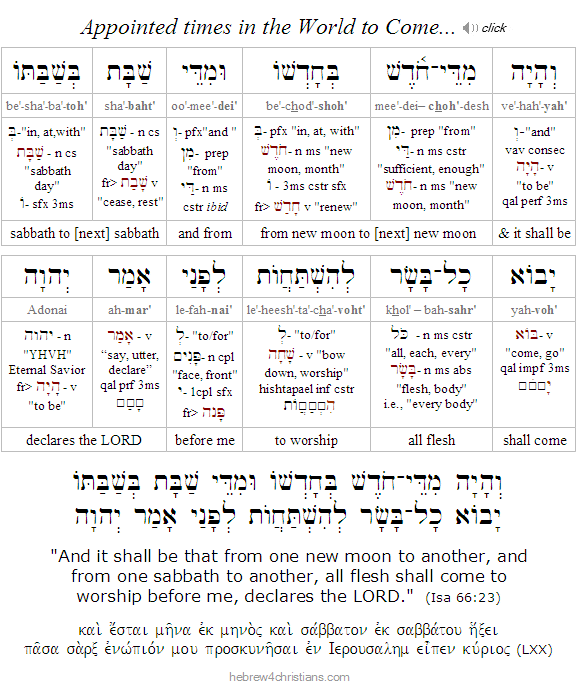
This verse indicates that there is an eschatological (i.e., future) dimension to Rosh Chodesh and it is therefore part of our future heritage with the LORD God of Israel. And while we are not (legalistically) obligated to observe the Sabbath or the new Moon, we nonetheless recognize that they are part of the divine calendar that the LORD God Himself instituted, and that they therefore have spiritual application to our lives as believers living under the terms of the New Covenant (Gal. 4:4). Yeshua said "every Yod and every letter's stroke" of the Torah was to be fullilled until heaven and earth passed away (Matt. 5:17-18). Since heaven and earth are still here, that means the Torah has its place in our theology and practice. As co-members of the household of Israel (Eph. 2:12-20), we don't "have to" observe the moedim (holidays, appointed times) - but it surely is an honor and great joy to do so, especially when we appreciate how the glory of Yeshua is revealed in each of them. Yeshua the Messiah - the same yesterday, today, and forever (Heb. 13:8).
For more on this subject, see "Parashat Bo: The Significance of the Moon."
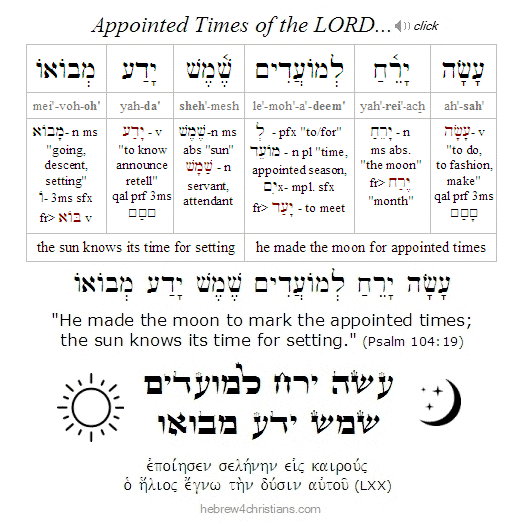 |
International Holocaust Remembrance Day

01.27.20 (Shevat 1, 5780) On January 27, 1945, the largest of the Nazi death camps (Auschwitz-Birkenau in Poland) was liberated by Soviet troops. In October 2005, the UN General Assembly designated this date as "International Holocaust Remembrance Day" (IHRD) to commemorate and honor the victims of the Nazi era. Note that the UN-sponsored date is not the same thing as Yom HaShoah, which occurs in the spring (Nisan 27).
The systematic genocide of the Jewish people is one of the most heinous and barbarous crimes in the history of humanity. Reflecting on the atrocities should lead each of us to be vigilant to protect the individual liberties of all people at the hands of the State. Any political ideology or religious creed that elevates the interest of the "collective" over the sanctity of the individual is therefore inherently suspect.
Note: For more information about IHRD, see this page.
Exodus Lamb of God...
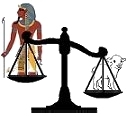
[ Our Torah reading for this week, Parashat Bo, describes the great Passover by means of faith in the efficacy of the blood of the Lamb of God and the subsequent exodus from Egypt... ]
01.26.20 (Tevet 29, 5780) Our Torah reading for this week begins with God commanding Moses "to go" (i.e., bo: בּא) before Pharaoh to announce further apocalyptic judgments upon Egypt. The purpose of this power encounter was to vindicate God's justice and glory (deliverance/salvation) by overthrowing the tyranny of unjust human oppression. Pharaoh's nightmare of "one little lamb" outweighing all the firstborn of Egypt was about to be fulfilled.
Recall that last week's Torah (i.e., parashat Va'era) retold how Pharaoh defiantly refused to listen to Moses' pleas for Israel's freedom, despite seven devastating makkot (plagues) that came upon Egypt in God's Name (יהוה). In this week's portion (i.e., parashat Bo), the battle between the LORD and Pharaoh comes to a dramatic conclusion. The last three of the ten plagues are unleashed upon Egypt: a swarm of locusts devoured all the crops and greenery; a palpable darkness enveloped the land for three days and nights; and all the firstborn of Egypt were killed precisely at the stroke of midnight of the 15th of the month of Nisan... In this connection note that the word בּא ("go") and פרעה ("Pharoah") added together equal the gematria of משׁיח ("mashiach"), providing a hint of the Messianic redemption that was foreshadowed in Egypt. Every jot and tittle, chaverim!
Before the final plague, God instructed the Jewish people to establish a new calendar based on the sighting of the new moon of spring. On the tenth day of that month, God told the people to acquire a "Passover offering" to Him, namely an unblemished lamb (or goat), one for each household. On the 14th of that month ("between the evenings") the animal would be slaughtered and its blood sprinkled on the doorposts and lintel of every Israelite home, so that God would "pass over" these dwellings when He came to kill the Egyptian firstborn that night. The roasted meat of the offering was to be eaten that night with unleavened bread (matzah) and bitter herbs (maror). God then commanded the Israelites to observe a seven-day "festival of matzah" to commemorate the Exodus for all subsequent generations.
Because of this, our corporate identity begins with a shared consciousness of time from a Divine perspective. The mo'edim (festivals of the LORD) all are reckoned based on the sacred calendar given to the redeemed Israelite nation. As it is also written in the Book of Psalms: "He made the moon for the appointed times" / עָשָׂה יָרֵחַ לְמוֹעֲדִים (Psalm 104:19). Undoubtedly Yeshua followed this calendar, as did His first followers (Gal. 4:4).
Just before the dreadful final plague befell, God instructed the Israelites to ask their Egyptian neighbors for gold, silver and jewelry, thereby plundering Egypt of its wealth (this was regarded as "uncollected wages" for hundreds of years of forced labor and bondage - not to mention for the services of Joseph, whose ingenuity brought the world's wealth to Egypt in the first place). Moses then instructed the people to prepare the Passover sacrifice, that is, the korban Pesach (קָרְבָּן פֶּסַה) - the Passover lamb - and to smear its blood on the two sides and top of the doorway, resembling the shape of the Hebrew letter Chet (ח). This Hebrew letter, signifying the number eight, is connected with the word חי (chai), short for chayim (חַיִּים), "life." The blood of the lamb (דַּם הַשֶּׂה) not only saves from the judgment of death, but also is a symbol of divine life given for our redemption. The "life is in the blood."
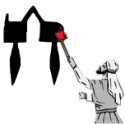
The dreadful final plague - the death of the firstborn - at last broke Pharaoh's resistance and he not only allowed the Israelites to depart without any conditions, he urged them to go. Because they left in great haste there was no time for their dough to rise. The Torah states that there were 600,000 adult men who left Egypt, along with the women, children, and a "mixed multitude" of other Egyptian slaves who tagged along.
The Israelites were commanded to consecrate all the firstborn to God and to commemorate the anniversary of the Exodus each year by celebrating the LORD's Passover in conjunction with the Feast of Unleavened Bread. During this time they were to remove all leaven from their homes for seven days, eat matzah, and retell the story of their redemption to their children. The portion ends with the commandment to wear tefillin (phylacteries) on the arm and head as a reminder of how the LORD saved the Israelites from their bondage in Egypt.
The Way of Return...

01.24.20 (Tevet 27, 5780) Our Lord illustrated the path of return to God (i.e., teshuvah) by telling the heartwarming story of the "prodigal son" (see Luke 15:11-32). This parable, perhaps more than any other, reveals the heart of God for those who are "lost," that is, for sinners who have turned away and missed the true purpose of their lives. When a discontented son demands his share of his father's estate, he claims the right to live life in his own terms, seeking self-satisfaction, and and decides to leave home for a "far country," that is, to the fallen world where nothing is sacred, where there is no God, and where everyone likewise lives for themselves. The wayward child soon squanders his father's inheritance, that is, he wastes away the gift of life, and then encounters famine, discovering his profound spiritual hunger and thirst. After experiencing the misery and hopelessness of his self-chosen lifestyle, he has an awakening: "he comes to himself" (εἰς ἑαυτὸν δὲ ἐλθὼν) and decides to return home, full of shame and self-reproach (Luke 15:17). This decision marks the turning point, the "teshuvah," of his journey. Note that his decision to return is grounded in humility -- an abandonment of his own way and a confession of his need for his father's home. So "he got up and went to his father..." "But while he was still a long way off, his father saw him and was filled with compassion for him; he ran to his son, threw his arms around him and kissed him" (Luke 15:20). Yeshua used this image to portray God's love for us and his desire for us to return to him. Instead of listening to the son's litany of mistakes, the father ordered a celebratory meal in honor of his lost son's homecoming. When his older son (i.e., the "good son") objected, the father said, "We had to celebrate and be glad, because this brother of yours was dead and is alive again; he was lost and is found" (Luke 15:32). This of course is the very heart of the gospel message: that the lost soul returns (shuv) to the compassionate arms of God the Heavenly Father... Indeed God sees you while you are still "a long way off" (Rom. 5:8). He runs to you with affection when you take your first earnest step to toward him; his compassion is so great that He willingly embraces the shame of your sins and then adorns you with "a fine robe, a ring, and sandals" (Luke 15:22). Your Heavenly Father even slaughters the "fattened calf" (i.e., Yeshua the Lamb of God) so that a meal that celebrates your life may be served (Luke 15:23).
It is clear by the context of Yeshua's parable that the younger son refers to the "sinners" whom Yeshua had befriended (see Luke 15:1), while the elder son refers to the "scribes and Pharisees" who opposed his message of God's compassion and the gift of his love.... Yeshua told this story to teach us about different heart attitudes. Those who are scandalized by the father's great love for his wayward child may be likened to the elder son (Luke 15:25-32), the ostensibly "good son" who (like the scribes and Pharisees) considered themselves "respectable" and "faithful." And while the father's love surely extended to the older son, he reproved this son for his hardheartedness and especially for not knowing his own heart... We must be careful here. Yeshua never taught us to elevate "religion" over the needs of people; he never told us to observe religious scruples at the expense of compassion and love for others (Matt. 23:13-36); neither does he want people to become slaves to rituals or religion (Luke 11:42; 1 Cor. 7:23). No, he calls people to follow Him: "Take up your cross and follow me." Turn your thinking around! Die to your religion, your world. Be comforted because there is good news from heaven! God's acceptance is given to those who trust in the righteousness of Yeshua in place of self-righteousness that may be gained by performing the "works of the law" (Gal. 2:16, Titus 3:5; John 1:17). Indeed Yeshua is "the goal of the Torah for righteousness" for all who believe (Rom. 10:4-13). Wow. Now that's a message that requires a profound "change of mind" for the religiously-minded to accept. Contrary to what the gate-keepers of religion would have you believe, God's healing love extends to all people, and particularly to "sinners" who feel lost, excluded, and alone...
Despairing friend, it is never too late to turn to God, no matter what a mess you've made of your life... As the story of the dissolute son teaches, you are welcome and accepted by God, despite your feelings of unacceptability and shame.... The prophet Jeremiah spoke in the Name of the LORD: "Return, faithless Israel, declares the LORD. I will not look on you in anger, for I am kind (כִּי־חָסִיד אֲנִי), declares the LORD" (Jer. 3:12). When the people drew back in shame, however, God encouraged them by saying "My children, if you return, will you not be returning to your Father? Come back, O faithless sons; I will heal your faithlessness. "Behold, we come to you, for you are the LORD our God" (Jer. 3:22).
שׁוּבוּ אֵלַי וְאָשׁוּבָה אֲלֵיכֶם
אָמַר יְהוָה צְבָאוֹת
shoo'·voo · e·lai · ve·a·shoov'·ah · a·ley·khem
a·mar · Adonai · tze·va·oht

"Return to me, and I will return to you,
says the LORD of hosts" (Mal. 3:7)

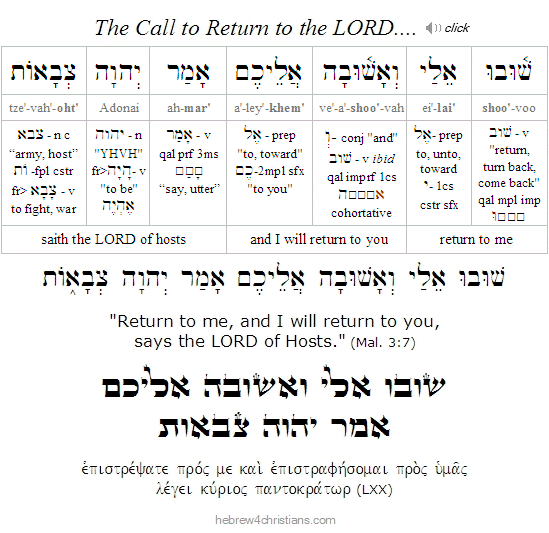
Taking the Name in Vain...
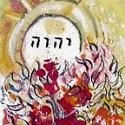
01.24.20 (Tevet 27, 5780) The Third Commandment states: lo tisa et shem Adonai Elohekha lashav, "You shall not lift up (lit. "carry") the Name of the LORD your God in vain" (Exod. 20:7). Note that the Hebrew word lashav (לַשָּׁוְא), usually translated "in vain" in English, means in an empty or thoughtless manner (the LXX translates it as ἐπὶ ματαίῳ, "worthlessly" or "thoughtlessly"), though the word might also be rendered as "for show," that is, insincerely or for sake of others. Obviously "lifting up the Name" of God 'lashav' includes invoking the Divine Presence in profane and vulgar ways, but it also includes "lip-service" expressions of faith, mechanical confessions, heartless acts of service, and so on. "Lifting up the Name" should never be used as a "weapon" against others, nor should it ever be used to justify or practice violence. You cannot "call upon God's Name" in the truth without first exercising genuine reverence by recognizing the sacredness of life, the value of other people, and the LORD's all-consuming glory, love, and power...
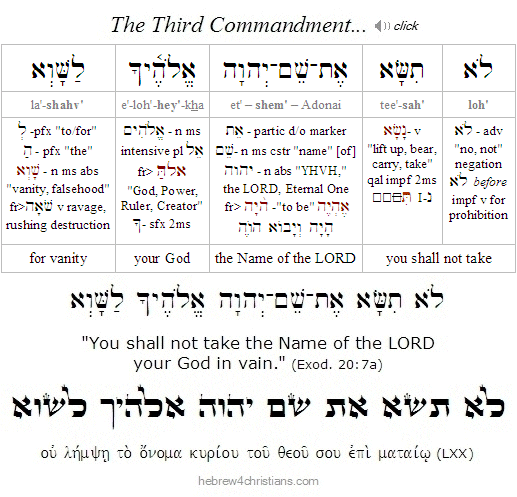 |
Reverencing the Name of the LORD means being in a personal, vital, and all-important relationship with the truth. The Holy Spirit is called the Spirit of Truth (רוּחַ הָאֱמֶת). This means understanding God's character as "merciful and gracious, slow to anger, and abounding in steadfast love and faithfulness, extending kindness to the thousandth generation, forgiving iniquity, transgression, and sin" (Exod. 34:6-7). Since the Hebrew idea of word (דָּבָר) is coextensive with truth (i.e., "thing"), Yeshua is called the Word of God (דְּבַר אֱלהִים) who represents the Name of God to all who trust in Him (John 17:26, Heb. 1:3). Indeed Yeshua is the true Name of God, the "substance" (being) of God, the "exact imprint and representation of His nature," and so on. "His eyes are like a flame of fire, and on his head are many diadems, and he has a name written that no one knows but himself. He is clothed in a robe dipped in blood, and the name by which he is called is 'The Word of God" (Rev. 19:12-13). The New Testament describes Yeshua as the "Aleph and the Tav, the one who is and who was and who is to come, God Almighty" (Rev. 1:8).
The Substance of Hope..

01.23.20 (Tevet 26, 5780) "Faith is the foundation (i.e., ὑπόστασις: the "substance," reality, underlying essence, etc.) of hope, the conviction of the unseen... Without faith it is impossible to please God, for whoever would draw near must believe that God exists and rewards (μισθαποδότης) those who seek him" (Heb. 11:1,6). Note that God is pleased when we seek his presence, that is, when we when we look past the ephemera and ambiguity of the phenomenal world for the truth about spiritual reality (2 Cor. 4:18). For our part, faith resolves to confession (ὁμολογέω), that is, aligning our perspective and focus to agree with the revelation and message of divine truth and verballly declaring our conviction. We must say that we believe, and affirm it with all our heart (Rom. 10:9). As it says, "I will make Your faithfulness known with my mouth" (Psalm 89:1). When you encounter tribulation, or experience some crisis of faith, reaffirm aloud: "I believe in God's promise..." Physically expressing your faith is itself an act of faith, and this encourages your soul to trust in God's healing reward even in the present struggle or darkness...
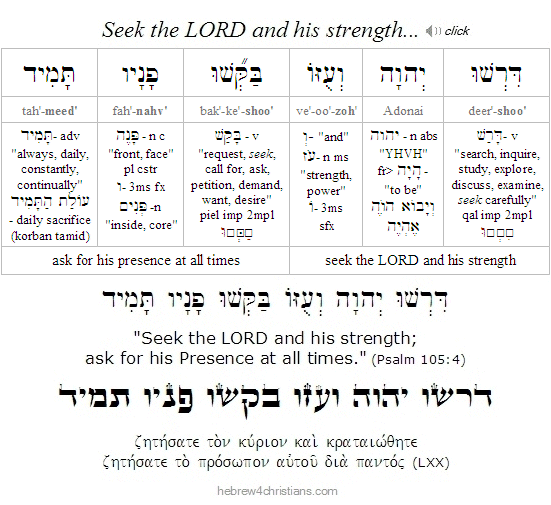 |
Why we love Torah...
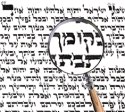
01.23.20 (Tevet 26, 5780) The Scriptures declare: "Blessed is the man who ... delights in the Torah of the LORD (בְּתוֹרַת יְהוָה); all that he does shall prosper" (Psalm 1:1-3). And while it is true that we are no longer 'under' the constraints of the former covenant given at Sinai (Rom. 3:20-28), we are repeatedly instructed to delight in the Torah and to meditate on its precepts day and night (Josh 1:8, Psalm 1:2; 19:8; 119:15, 47, 97; Neh. 8:12, etc.). As it is written in Proverbs: "If you seek it [i.e., the wisdom revealed in the Torah] like silver and search for it as for hidden treasures, then you will understand the fear of the LORD and find the knowledge of God" (Prov. 2:4-5). Indeed, the New Testament says that the "the Torah is holy, and the commandment is holy and righteous and good" (Rom. 7:2), and where it is written, "all Scripture is breathed out by God and is profitable for teaching, for reproof, for correction, and for training in righteousness" (2 Tim 3:16-17), it is evident that the Jewish Scriptures (i.e., the Torah, the Prophets, and the Writings) are meant, since they provide the foundation, context, and the overarching matrix for the later New Covenant revelation... And of course these were the Scriptures Yeshua used to explain his ministry to his followers: "And beginning with Moses and all the Prophets, he interpreted to them in all the Scriptures the things concerning himself" (Luke 24:27; John 1:45). In other words, the Torah has both a logical, a linguistic, and a theological priority for understanding the New Testament Scriptures, and the failure to read in context invariably leads to faulty interpretations and doctrinal errors of various kinds. God "breathed out" (θεόπνευστος) his revelation in order, and the message itself must be understood in light of that order (Gal. 4:4-5).
מָה־אָהַבְתִּי תוֹרָתֶךָ
כָּל־הַיּוֹם הִיא שִׂיחָתִי
mah-a·hav'·tee · toh·rah·te·kha
kol-hai·yom · hee · see·cha·tee

"Oh how I love your Torah;
it is my meditation all the day."
(Psalm 119:97)
Hebrew Study Card

This verse begins the "Mem section" of the Psalm 119 acrostic (מָה־אָהַבְתִּי תוֹרָתֶךָ). Mem is the letter of "water" (mayim), symbolizing the "spring" of the Torah. In traditional soferut (scribal arts), the letter Mem (מ) is formed from two parts: a Vav (ו) and a Kaf (כ), the gematria of which equals 26, the same value for the sacred Name YHVH (יהוה). The Torah (תּוֹרָה) is central to the revelation of the LORD, just as Yeshua is forever "the Voice of the Living God speaking from the midst of the fire" (Deut. 5:26, Matt. 17:1-3).
The Breath of Hope...

[ The following is related to our Torah reading for this week, Parashat Va'era... ]
01.22.20 (Tevet 25, 5780) When Moses proclaimed the good news of God's forthcoming redemption for Israel, the Torah states that the people could not listen because they were "short of breath" (Exod. 6:9). Interestingly, this phrase (i.e., mi'kotzer ru'ach: מִקּצֶר רוּחַ) can also mean "lacking in spirit," as if in a paralyzed state of hopelessness. But how did the people become so downhearted? Had they forgotten the promise given to Abraham (Gen. 15:12-14)? Had they disregarded Joseph's final words (Gen. 50:24-25)?
According to some of the sages, part of the reason for their "shortness of breath" (besides the cruel bondage and hard labor imposed on them, of course) was that the Israelites miscalculated the duration of their 400 year exile, and therefore they began to lose hope. When members of the tribe of Ephraim tried to escape from Egypt some 30 years before the time of the redemption, they were all killed by the Philistines, and many of the Israelites began to believe that they would remain as perpetual slaves (Shemot Rabbah, 20:11). They became "short of breath" and could no longer receive the message of the Holy Spirit...
Indeed, life in this evil world can be suffocating at times. And though we may not be under the oppression of a cruel Pharaoh, we are affected by the "princes of this age" who spurn the message of the Messiah's redemption and love, and we are still subjected to bondage imposed by taskmasters who defy the LORD and who seek to enslave us by means of lies, propaganda, and threats of violence... The devil is still at work in the hearts and minds of many of his "little Pharaohs" that govern the world system... The Scriptures make it clear that we are engaged in genuine spiritual warfare: "For we do not wrestle against flesh and blood, but against the rulers, against the authorities, against the cosmic powers over this present darkness, against the spiritual forces of evil in the heavenly places" (Eph. 6:12).
It is evident that one of the central purposes of God's redemption is to bestow freedom and dignity upon his people. As the story of Pharaoh reveals, God does not take kindly to oppressors, dictators, and other megalomaniacal world leaders who deny the truth and who therefore seek to enslave (or kill) human beings created in His image and likeness. Just as God judged Egypt for its oppression and violence, so He will one day break the "rulers of this world" with a rod of iron and dash them in pieces like a potter's vessel (Psalm 2:9-10). The victory is found in our faith, just as the people of Israel believed; "and when they heard that the LORD had visited the people of Israel and that he had seen their affliction, they bowed their heads and worshiped" (Exod. 4:31).
To help us "catch our breath" during this time of waiting, it is important to remember that the LORD redeems us so that we may become His children and therefore be clothed with everlasting dignity... Our redemption makes us heirs of the Kingdom of God and citizens of heaven. We must never regard ourselves as slaves - not to the State, not to the bankers, not to fear, and not to religion (Gal. 5:1). God gave up His Son for us so that we could be made free to live with honor as his dearly loved children.... All the threats of the world system - economic, political, religious, social, etc. - are ultimately made empty and vain by the glorious redemption promised to us in Yeshua our Savior.
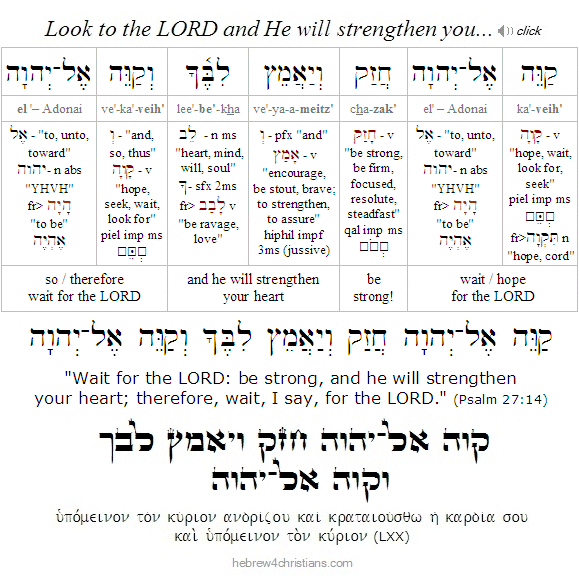 |
For more on this see: "The Spirit of Hope: Further thoughts on Va'era."
Addendum: How long were the Israelites in Egypt?
Some of the sages argued that Israel was in bondage in Egypt for just 210 years and not 400 years as the Torah states. They reason that the 400 years of bondage mentioned in Torah must include the time of the patriarchs in Canaan, and subtracting that yields 210 years. Although there are some other explanations, in general, Jewish tradition says that the countdown of 400 years began with Isaac's birth. Now Isaac was sixty years old when Jacob was born, and Jacob was 130 years old when he went down to Egypt, so that yields 190 years which subtracted from 400 leaves 210 years... The sages interpret the phrase "a land that is not theirs" (in Gen. 15:13) to refer to both Canaan and the of Egypt and therefore the two may be considered a unit from an exile point of view. They further claim the genealogy given in Exodus 6:16-26 regarding the toldot of Moses (i.e, Levi - Kohath - Amram - Moses) would make each generation 100 years in length, which is problematic since Amram was said to marry Yocheved when she was 130 years old.
In response we should note that textual criticism of the Torah indicates that there may be gaps in the genealogical record given in Exodus, and therefore we should not be dogmatic about whether they are complete or not. However it's written in Exodus 12:40: "Now the length of time the Israelites lived in Egypt (בְּמִצְרָיִם) was 430 years" (the Hebrew בְּמִצְרָיִם שְׁלשִׁים שָׁנָה וְאַרְבַּע מֵאוֹת שָׁנָה is unmistakable), which agrees with God's statement of four hundred years (i.e., arba me'ot shanah: אַרְבַּע מֵאוֹת שָׁנָה) of bondage (Gen. 15:13). Furthermore Stephen quoted Genesis 15:13 in his defense before the Council saying: "But God spoke as follows: 'Your descendants will be foreigners in a foreign country, whose citizens will enslave them and mistreat them for four hundred years" (Acts 7:6), which again states it was 400 years (in Greek: ἔτη τετρακόσια). So despite Jewish midrash stating otherwise, it seems clear the Israelites were in bondage for at least 400 years.
Lessons from Pharaoh...
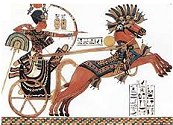
[ The following entry is related to this week's Torah reading (Parashat Va'era) and the theme of freedom. Please read the Torah portion to "find your place" here. ]
01.22.20 (Tevet 25, 5780) Though he sometimes appeared to change his mind in light of the intervention of God, Pharaoh nevertheless reverted to his older thinking after the danger seemed to pass. Therefore the Torah states that after each of the first five plagues, Pharaoh hardened (lit., "strengthened") his heart. It was only after five successive opportunities to face reality, to give up his claim to be god, to turn to the LORD in humility, however, that God ratified Pharaoh's will by "helping him" become the person he decided to be. Therefore after the sixth plague we read, "And the LORD strengthened Pharaoh's heart" (Exod. 9:12).
The Torah of Pharaoh teaches us that God will never force a sinner to turn away from their sin, but if they willfully continue to sin, they may become unable to turn, trapped in a very difficult place.... The Shemot Rabbah states: "The Holy One, blessed be He, gives someone a chance to repent, and not only one opportunity but several chances: once, twice, three times. But then, if the person still has not repented, God locks the person's heart altogether, cutting off the possibility of repentance in the future." There is a very real risk that those who choose to be at war with God, who flatly refuse repeated appeals to turn to the LORD, will become progressively "strengthened" in their resolution to defy reality...
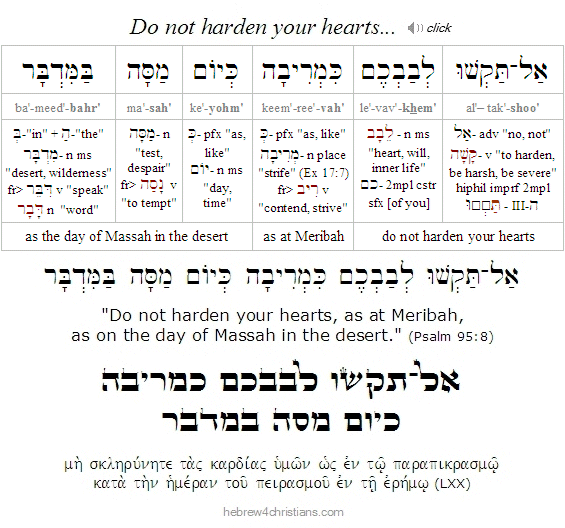 |
Deliverance from Ourselves...

01.22.20 (Tevet 25, 5780) From our Torah portion for this week (Va'era) we read, "Pharaoh's heart was hardened (וַיֶּחֱזַק) so he would not listen..." (Exod. 8:19). The worst kind of bondage is when you are oppressed by yourself - when you are so enslaved by your inner urges that you are no longer able to think outside of your desire or to choose to do otherwise... It might be greed, the desire for pleasure, fear, anger, or the "need" to be right (i.e., pride), but whatever controls you is ultimately your taskmaster. Ironically, Pharaoh's will to enslave the Israelites made him into a slave...
Self-deception can entice us to deny the consequences of our passions or to rationalize them by pretending we are victims. Because of this, we may become further enslaved to our own sense of self-importance, and we become ensnared within the prison house of the all-demanding ego. We can only be delivered from the "tyranny of ourselves" by God's power, as Yeshua said: "you will know the truth, and the truth will set you free" (John 8:32). This is the truth of God's power of deliverance given in Yeshua our Lord (Rom. 1:16; 1 Cor. 1:18). The truth sets you free not merely in some intellectual sense (i.e., being made free from error), but in a volitional sense, in the core of your being, when your will is no longer enslaved to the power and inner darkness of sin... May God help us be free!
Mercy and Grace...
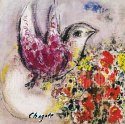
01.22.20 (Tevet 25, 5780) It has been said that "mercy" is not getting what you deserve (i.e., judgment/condemnation), whereas "grace" is getting what you don't deserve (i.e., favor/eternal life). Mercy forgives sin and guilt, but grace reaches out in love to the offender -- even to the point of suffering the penalty of the offence on the offender's behalf... "God shows his love for us in that while we were still sinners, Messiah died for us" (Rom. 5:8).
The pattern therefore abides: First you realize you are broken, impoverished of heart, and you therefore mourn over your sinful condition. Then you hunger and thirst for God's righteousness, for his healing and deliverance, and you learn to trust the mercy of God, that is, you come to accept that you are accepted despite your unacceptability. You begin to show yourself mercy; you learn to "suffer yourself" and forgive your own evil, and then you extend this mercy to others who are hurting around you... The failure to extend mercy, to demand your "rights" or hold on to grudges, implies that you are relating to God as Judge rather than as Savior (James 2:13). If we condemn what we see in others, we have yet to truly see what is within our own hearts; we have yet to see our desperate need for God's mercy for our lives. If you don't own your own sin, your sin will own you. Being merciful is a response to God's love and therefore is essential to genuine teshuvah... Ask the LORD to help you let go of the pain of the past by being full of mercy toward yourself and others.
God's love calls those of troubled heart to return to Him.... King David wrote, "You have said, 'Seek my face,' and my heart says to you, 'Your face, LORD, do I seek'" (Psalm 27:8). This is the "antiphon" of the Shema: God calls us to hear His Voice, so we are right to earnestly ask Him to be divinely enabled to hear what the Spirit is saying...
לְךָ אָמַר לִבִּי בַּקְּשׁוּ פָנָי
אֶת־פָּנֶיךָ יְהוָה אֲבַקֵּשׁ
le·kha · a·mar · lee·bee · ba·ke·shoo · fa·nai
et-pa·ney'·kha · Adonai · a·va·keish

"You have said, 'Seek my face,' my heart says to you,
'Your face, LORD, do I seek'" (Psalm 27:8).

King David asked for God's direct and miraculous intervention to heal his soul: "Cause me to me hear your lovingkindness in the morning, for in You do I trust. Cause me to know the way I should go, for I lift up my soul to you" (Psalm 143:8). David's request was that he would be empowered to hear God's loving voice calling to his heart at the start the day, to be assured of God's kindness and favor. Note that the Hebrew verbs used in this verse are both hiphal imperatives, implying that God is the agent or cause of the action. We lift up our heart in expectation, understanding that the LORD alone is the One who is able to draw us near to Him: "You [God] cause me to hear... You [God] cause me to know..."
הַשְׁמִיעֵנִי בַבּקֶר חַסְדֶּךָ
כִּי־בְךָ בָטָחְתִּי
הוֹדִיעֵנִי דֶּרֶךְ־זוּ אֵלֵךְ
כִּי־אֵלֶיךָ נָשָׂאתִי נַפְשִׁי
hash·mee·ei'·nee · va·bo'·ker · chas·de·kha
kee-ve·kha · vah·tach'·tee
ho·dee·ei'·nee · de'·rekh-zoo · ei·leikh
kee-ei·ley'·kha · nah·sa'·tee · naf·shee

"Cause me to me hear your lovingkindness in the morning,
for in You do I trust.
Cause me to know the way I should go,
for I lift up my heart to you." (Psalm 143:8)

The salutation, "Grace, mercy, and peace from God" (χάρις ἔλεος εἰρήνη ἀπὸ θεου) appears in several places in the New Testament epistles, though perhaps the best example of how the two words "mercy" and "grace" are used may be found in Hebrews 4:16: "Let us then with confidence draw near to the Throne of Grace (כִּסֵּא הֶחָסֶד), that we may receive mercy (רַחֲמִים /ἔλεος) and find grace (חֶסֶד /χάρις) to help in time of need." Note that the word translated "boldly" in this verse (παρρησίας) means that we can speak freely to God from the center of our hearts -- without fear or shame.
The Power of Truth...

[ The following is related to our Torah reading for this week, Parashat Va'era... ]
01.21.20 (Tevet 24, 5780) In this week's Torah reading (Va'era), the LORD sent Moses and Aaron to Pharaoh with the timeless message: shalach et ami (שׁלַּח אֶת־עַמִּי), "let my people go!" Because of Pharaoh's hardness of heart, however, God began the sequence of plagues that would demonstrate his sovereignty over all the powers and so-called "gods" of Egypt (Exod. 12:12). The ten plagues (i.e, eser ha'makot: עֶשֶׂר הַמָּכּוֹת) were given not just to vanquish the pride of Pharaoh, however, but to awaken the people of Israel. After hundreds of years of slavery, the people had forgotten who they really were and had passively accepted that all real power was vested in humans. Among other things, God's intervention was meant to deliver the people from the fallacy of ascribing greatness to worldly powers. Ultimately the people of Israel - and indeed the entire world - would come to understand ein od milvado (אֵין עוֹד מִלְבַדּו), "there is no power apart from Him" (Deut. 4:39).
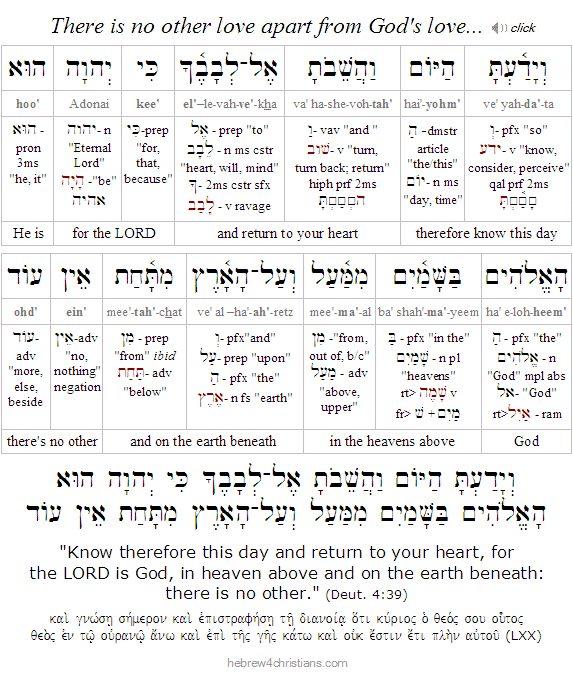 |
Everything Matters...
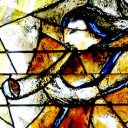
01.21.20 (Tevet 24, 5780) An implication of genuine faith in the LORD is the realization that your life is a sacred trust and therefore everything matters... Nothing is trivial; nothing is inconsequential. In the world to come you will be shocked to understand that everything you thought, everything you said, and everything you did was given to you from above, and therefore has tremendous significance (Matt. 12:36-37). Indeed, your entire life is on loan from heaven itself. Therefore "seek first the kingdom of God and His righteousness..." (Matt. 6:33). Faith invests all of the heart to the journey at hand; it seeks God's presence in all things and trusts God in all its ways (Prov. 3:5-6). "The present form (τὸ σχῆμα) of this world is passing away" (1 Cor. 7:31), and the heart of faith looks for a city whose designer and builder is God Himself (Heb. 11:10). "So we do not lose heart... For the things that are seen are turning to dust, but the things that are unseen endure forever" (2 Cor. 4:16-18).
בְּטַח אֶל־יְהוָה בְּכָל־לִבֶּךָ
וְאֶל־בִּינָתְךָ אַל־תִּשָּׁעֵן
בְּכָל־דְּרָכֶיךָ דָעֵהוּ
וְהוּא יְיַשֵּׁר אֹרְחֹתֶיךָ
be·tach · el-Adonai · be·khol-lee·be'·kha
ve'el-bee·na'·te·kha · al-teesh·a·ein
be·khol-de·ra·khe'·kha · da·ei'·hoo
ve·hoo · ye·ya·sher · or·cho·tey'·kha

"Trust in the LORD with all your heart,
and do not lean on your own understanding.
In all your ways acknowledge Him,
and he will straighten your paths."
(Prov. 3:5-6)
Hebrew Study Card

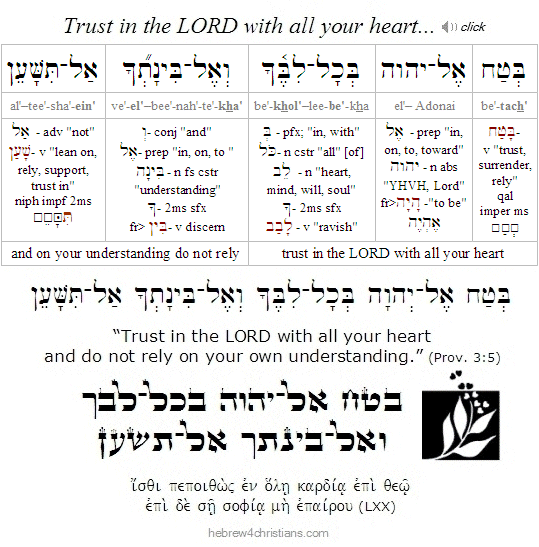
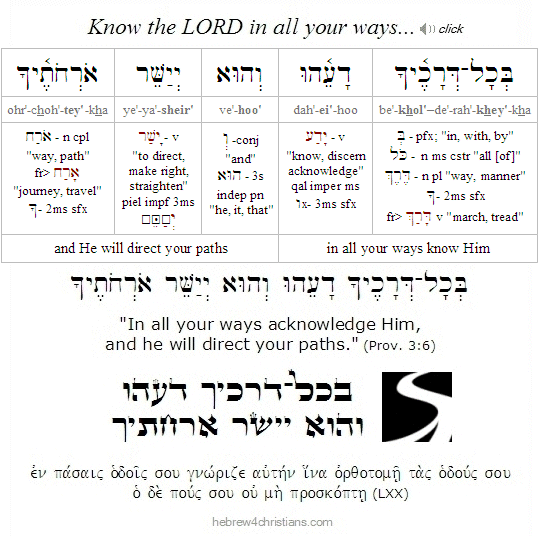
"Know Him in all your ways," that is, in all that you put your hand to do look for the Divine Presence and guidance (1 Cor. 10:31). As King David stated, "I have set the Lord always before me, because He is at my right hand, I shall not be moved" (Psalm 16:8). The very first step of the journey is to find hope, and every subsequent step is marked by hope's comfort. Therefore keep moving forward and don't look back. Yeshua warned us that the person who puts his hand to the plow and then turns back is not fit for the kingdom of heaven (Luke 9:62). Keep focused on what is most essential; guard yourself from the world and its varied distractions. Make a place within your heart for the Divine Presence; find a quiet moment to listen for God's comfort. Trust that God is on the road ahead for you; believe that God foresees your way and prepares a place for you. Ask for guidance from the Lord: "Cause me to know the way I should go, for I lift up my soul to you..." (Psalm 143:8).
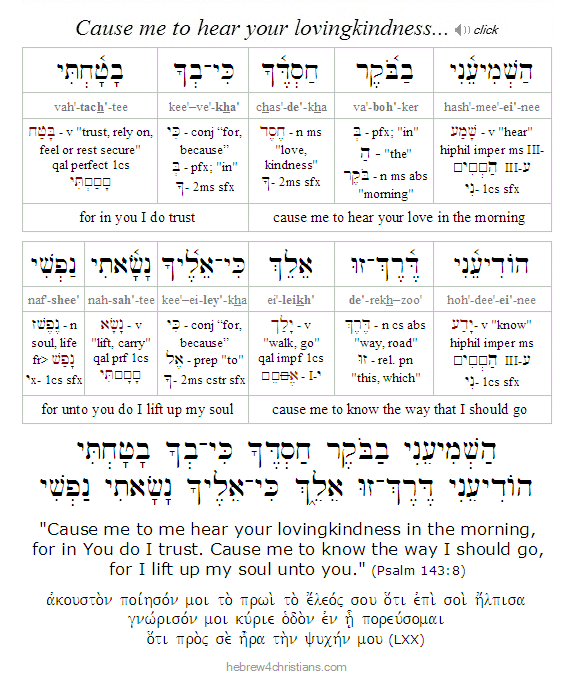 |
Blaise Pascal (1623-1662) once cogitated: "There are only three kinds of people: those who seek God and have found Him -- these are wise and happy; those who seek God and have not yet found Him -- these are wise and unhappy; and those who live without either seeking God or finding Him -- and these are both unwise and unhappy" (Pensees). That is a good categorization, though a more logical one would state that there are actually four kinds of people: 1) those who seek God and have found Him -- these are wise and (sometimes) happy; 2) those who seek God and have not yet found Him -- these are wise but unhappy; 3) those who do not seek God but have found Him -- these are unwise yet made happy; and 4) those who neither seek God nor find Him -- these are living a nightmare....
King David prayerfully wrote, "You have said, 'Seek my face,' and my heart says to you, 'Your face, LORD, do I seek'" (Psalm 27:8). This is the "antiphon" of the great Shema: God calls us to hear His Voice, so we are right to earnestly ask Him to be divinely enabled to hear what the Spirit is saying. May the Spirit of the LORD rest upon you and give you healing peace.
The Exodus Parable...
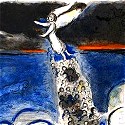
[ The following is related to our Torah reading for this week, Parashat Va'era... ]
01.21.20 (Tevet 24, 5780) The great exodus of Israel from Egypt is the central parable of the Torah. The bondage of the Israelites to Pharaoh represents humanity's slavery to sin; God's deliverance from bondage is effected by trusting in the blood of the sacrificial lamb of God; the passage from death to life symbolically comes through baptism into the Sea of Reeds; the journey to truth represents the pilgrimage to Sinai, and so on. Indeed, the redemption in Egypt led directly to revelation given at Sinai, and when the LORD God gave the Ten Commandments, he did not begin by saying he was our Creator, but rather our Redeemer: "I am the LORD your God (אָנכִי יְהוָה אֱלהֶיךָ), who brought you out of the land of Egypt, out of the house of slavery" (Exod. 20:2). This is because the purpose of the creation itself is to demonstrate God's redemptive love and to be known as our Savior and Redeemer, just as Yeshua is the "Lamb slain from the foundation of the world" (Rev. 13:8; 1 Pet. 1:18-20; Eph. 1:4; 2 Tim. 1:9). "All things were created by Him (i.e., Yeshua), and for Him" and in Him all things consist (συνεστηκεν, lit. "stick together") (Col. 1:16-17). Creation therefore begins and ends with the redemptive love of God as manifested in the Person of Yeshua our Mashiach, the great Lamb of God and our Savior... He is the Center of Creation - the Aleph and Tav - the Beginning and the End (Isa. 44:6; Rev. 1:17). All the world was created for the Messiah: "For from him and through him and to him are all things. To him be glory forever. Amen" (Rom. 11:36).
Suffering from a Hard Heart...

[ The following is related to our Torah reading for this week, Parashat Va'era... ]
01.21.20 (Tevet 24, 5780) Spiritually speaking, a heart that is insensitive, indifferent, unfeeling, and callous toward the needs of others is regarded as "hard" or "difficult." Often such hardness comes as a result of living in a fallen world. Many wounded people live with "scar tissue" that surrounds their heart, making them feel numb and unwilling to open up and trust others. Their affections have become disordered and their ego rationalizes blaming others or seeking various forms of entitlement. "Turning off your heart" can mean suppressing any positive regard for others (empathy) while nurturing anger and self-righteousness, or it may mean withdrawing from others as a lifeless shell (both approaches vainly attempt to defend the heart from hurt). Although Yeshua always showed great compassion, especially to the wounded and broken in spirit (Isa. 42:3), He regularly condemned the "hardness of heart" ("sclero-cardia," σκληροκαρδία) of those who opposed his message of healing and love.
A hard heart is closed off and impermeable to love from others, and especially from God. It is a "difficult" (קָשֶׁה) heart, inflexible and even cruel. Scripture uses various images to picture this condition, including a "heart of stone" (Ezek. 36:26, Zech. 7:12), an "uncircumcised heart" (Jer. 9:26), a "stiff neck" (Deut. 31:27), and so on. Stubbornness is really a form of idolatry, an exaltation of self-will that refuses to surrender to God. If you are wounded and afraid to open your heart in trust to others, ask God for healing...
God wants us to have "soft" hearts that are malleable and subject to His touch and influence. Consider the Biblical analogy of a potter who works with clay (Isa. 64:8, Jer. 18:6). Hard clay is brittle and hard to work with, though soft clay can be molded and adapted for a variety of uses. Applied to our heart attitudes, soft clay represents being open and moveable, whereas hard clay represents being inflexible, intolerant, and so on. A "hard hearted" person is closed-minded, assured of his own righteousness, and unwilling to admit the possibility of being wrong. He is really a "fragile" soul who is often hidebound by traditions, unwilling to be corrected, and usually so driven by fear and suspicion that he is unable to look at other possibilities. When we find ourselves becoming rigid, inflexible, and intolerant, we may be demonstrating hardness of heart.
Hardness of heart is something all of us deal with, even those who trust in Yeshua. After all, New Covenant believers are commanded to "put off the old self with its practices" (Col. 3:9) and are urged not to harden their hearts (μὴ σκληρύνητε τὰς καρδίας) through unbelief (Heb. 3:8,15, 4:7). The flesh dies hard, however, and "putting off" the old self requires divine intervention; however, if we cry out to the LORD for deliverance (especially from ourselves) He has promised to hear us (Rom. 10:13, Joel 2:32). The awareness that we are hardhearted and self-deceived can lead to a (blessed) sense of brokenness and despair -- i.e., to the realization that own self-sufficiency is futile and ultimately self-destructive. Turning to the LORD in despair of ourselves is a mark of humility. When we are emptied of ourselves, we are delivered from pride and self-deception and thereby enabled to truly ask for God's help... This is a miracle, since all of us have "a little Pharaoh inside," clamoring ti be the center of our universe and refusing to submit to the Presence of the LORD...
May God's blessing keep our hearts soft and open toward others... May the LORD give us a new heart, and put a new spirit within us. May He remove the heart of stone (לֵב הָאֶבֶן) from us and give us a heart of flesh (לֵב בָּשָׂר). May we be lev echad - "one heart" - with one another and with the Father (Ezek. 11:19). May we be so sensitized to the Presence of God that we detect the slightest touch from His hand upon us. Amen.
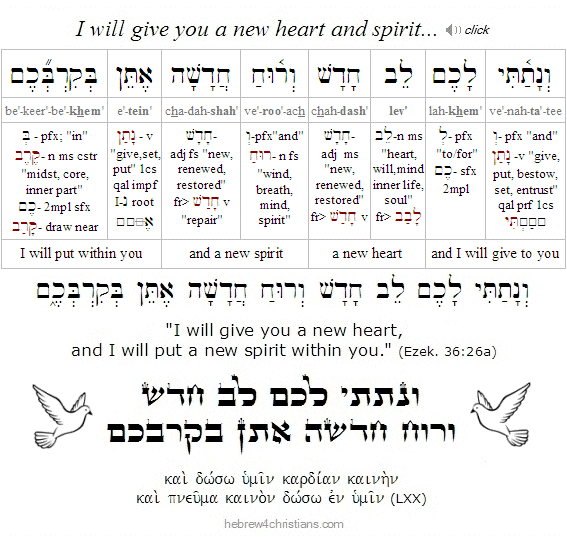 |
Knowing the Name...
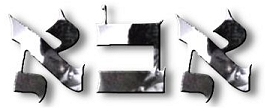
[ The following is related to our Torah reading for this week, Parashat Va'era... ]
01.20.20 (Tevet 23, 5780) When God said to Moses: "I appeared (וָאֵרָא) to Abraham, Isaac, and Jacob as El Shaddai (אֵל שַׁדָּי), but by my name the LORD (יהוה) I did not make myself known to them" (Exod. 6:3), he was stating that the patriarchs had not directly experienced His mastery over creation through the signs and wonders He would perform as Israel's Savior and Redeemer. The patriarchs understood God as El Shaddai, the all-sufficient One who nurtured the fledgling nation and who foretold Israel's future, but Moses (and the Israelites) would now understand God's attributes of covenantal faithfulness (chesed) as the "Promise Keeper" by directly witnessing his revelation and great saving acts. The great Torah commentator Rashi states that the Name YHVH implies that there is no power that can prevent God from keeping His word and fulfilling His promise of redemption. God is the Lord of lords and King of kings, and therefore His word can never fail (Deut. 10:17; Dan. 2:47). Ein od milvado (אֵין עוֹד מִלְבַדּו): "there is no power apart from Him" (Deut. 4:35,9).
The name "eheyeh asher eheyeh" (אֶהְיֶה אֲשֶׁר אֶהְיֶה) means "I shall be as I shall be," that is, "I shall be with those who desire that I shall be with them. I reveal myself to those who seek for me, and as I am sought, so I will be found. According to your faith be it done unto you: Blessed are they that hunger and thirst for righteousness, for they shall be filled..."
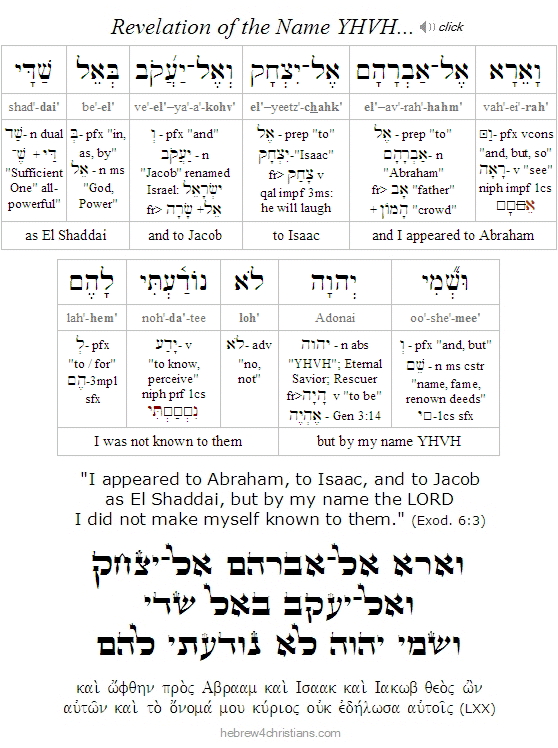 |
For more on this subject, see the article: Yeshua and YHVH.
Source of our Breath...

01.20.20 (Tevet 23, 5780) Though the meaning of God's Name (YHVH) was initially revealed to Moses as simply eheyeh (אֶהְיֶה), "I AM," or "I WILL BE" (Exod. 3:14), it is wonderful to realize that His Name was also revealed as eheyeh imakh (אהְיֶה עִמָּךְ), "I WILL BE WITH YOU" (Exod. 3:12; Josh. 1:5,9; Isa. 41:10,13; John 10:28; Matt. 28:20, etc.). Just as the LORD is called Elohei ha-ruchot lekhol basar (אֱלהֵי הָרוּחת לְכָל־בָּשָׂר), "the God of the breath of all flesh" (Num. 16:22), so He is the Source of your breath, the One who exhales to you nishmat chayim (נִשְׁמַת חַיִּים), the "breath of life" that enables you to live (Job 12:10). Indeed the Name YHVH (יהוה) first appears in the Torah in regarding imparting the breath of life to Adam (Gen. 2:7). Note further that each of the letters of the Name YHVH represent vowel sounds (i.e., breath), suggesting again that God's Spirit is as close as your very next breath. Like the wind that cannot be seen, so is the spirit the essential part of your identity. Yeshua breathed on his followers and said, "Receive the Holy Spirit" (John 20:22).
Providential Impediments...
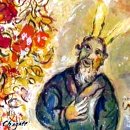
01.20.20 (Tevet 23, 5780) The midrash says Moses had a speech impediment and that is why he described himself as "heavy of mouth and of tongue" (כְּבַד־פֶּה וּכְבַד לָשׁוֹן), unfit to speak on behalf of God (Exod. 4:10). God reassured him, however, by reminding him that his limitation was by divine providence: "Who has made man's mouth? Who makes him mute, or deaf, or seeing, or blind? Is it not I, the LORD? Now therefore go, and I will be with your mouth and teach you what you shall speak" (Exod. 4:11-12). The sages comment that God did not cure Moses of his stuttering because He wanted the Israelites to know Moses as his chosen messenger. When he spoke in the Name of the LORD, the stuttering disappeared and Moses spoke with fluent ease. This was to teach the people not to trust in human oratory or wisdom, but rather in the power of God (see 1 Cor. 2:1-5). Just as the Apostle Paul, the "Moses of the New Covenant," was given a "thorn in the flesh" (σκόλοψ τῇ σαρκί) to keep him humbly relying upon God for his sufficiency to serve (2 Cor. 12:7-10), so Moses was rendered entirely dependent upon the LORD to speak as his mediator.
But he said to me, "My grace is sufficient for you, for My power is made perfect in weakness" (δύναμις ἐν ἀσθενείᾳ τελεῖται). Therefore I will boast most gladly of my weaknesses, that the power of Messiah may tabernacle (ἐπισκηνόω) within me (2 Cor. 12:9).
Parashat Va'era - וארא
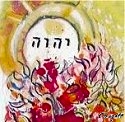
01.19.20 (Tevet 22, 5780) Shavuah tov, chaverim! Last week's Torah portion (i.e., parashat Shemot) told how Moses and Aaron were commissioned to go before Pharaoh and deliver the message: shalach et-ammi (שַׁלַּח אֶת־עַמִּי), "Let my people go" that they may hold a feast to me in the desert" (Exod. 5:1). Not only did Pharaoh dismiss the request, but he imposed even harsher decrees against the Israelites and caused them to suffer miserably. Moses then appealed to the LORD, who reassured him that Pharaoh would eventually relent because "the greater might" of God's power would deliver His people.
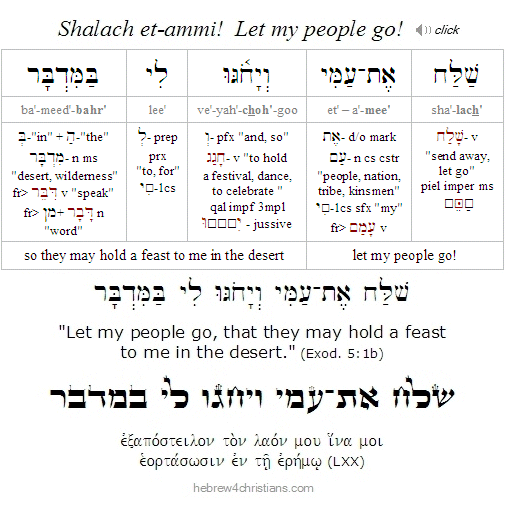 |
In this week's portion (Va'era), the LORD told Moses that He was now going to fulfill His promise to Abraham, Isaac, and Jacob by giving the Israelites the land of Canaan, and that he had heard the "groaning of the people of Israel whom the Egyptians held as slaves" (Exod. 6:5). The showdown between the LORD (יהוה) and the so-called gods of Egypt was imminent, and God therefore encouraged the people with precious promises: "I AM the LORD (אֲנִי יְהוָה) and I will bring you out from under the burdens of the Egyptians, and I will deliver you from their bondage, and I will redeem you with an outstretched arm and with great judgment; and I will take you to me for a people and I will be to you a God" (these are the "four expressions of redemption" we recite during the Passover Seder every year).
Despite these wonderful promises, however, the people were unable to listen because of their "shortness of breath" (מִקּצֶר רוּחַ) on account of their harsh slavery. The LORD then told Moses: "Go in, tell Pharaoh king of Egypt to let the people of Israel go out of his land," and the great showdown between the LORD and the gods of Egypt began. However, even after repeatedly witnessing the series of miraculous plagues issued in the Name of the LORD, the despot remained proud and unmoved, thereby setting the stage for the final devastating plagues upon the land of Egypt and the great Passover redemption of Israel.
Note: Please see the Summary Page for parashat Va'era for more information. You can also download the Shabbat Table Talk for this Torah portion here:
Rosh Chodesh Shevat

01.19.20 (Tevet 22, 5780) Note that Sunday, January 26th, 2020 marks Rosh Chodesh Shevat (חדש שבט), that is, the eleventh month of the Jewish calendar (counting from the month of Nisan). Shevat is considered important because Moses began his summary of the Torah (i.e., Mishneh Torah, or the sermon recorded in Book of Deuteronomy) on the first day of this month (Deut. 1:1,3). Because of this, the sages have long associated the Rosh Chodesh Shevat with the holiday of Shavuot (i.e., the sixth of Sivan), since on both these dates God appealed to Israel to receive the message of the Torah. The month of Shevat is also important because the "Rosh Hashanah for Trees" occurs on the 15th of the month.
Prophecy for every day...
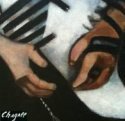
01.17.20 (Tevet 20, 5780) "Listen, O Israel, the LORD is our God; the LORD is one." Instead of thinking of the Shema (שְׁמַע) as a commandment to be externally obeyed, you can regard it as a prophecy about your inner life: "You shall love (וְאָהַבְתָּ) the LORD your God with all your heart, and with all your soul, and with all your might" (Deut. 6:5). Only God can quicken a dead heart, after all, and fill the soul with holy affections. Only the LORD can impart to us strength needed to take hold of promises as He writes His Torah upon our heart. As it is written, "For from him and through him and to him are all things. To him be glory forever" (Rom. 11:36).
וְאָהַבְתָּ אֵת יְהוָה אֱלהֶיךָ בְּכָל־לְבָבְךָ
וּבְכָל־נַפְשְׁךָ וּבְכָל־מְאדֶךָ
ve·a·ha'·ve·ta · et · Adonai · E·lo·hey'·kha · be·khol-le·va'·ve·kha
oo·ve·khol-naf'·she·kha · oo·ve·khol-me·o·de'·kha

"You shall love the LORD your God with all your heart
and with all your soul and with all your might"
(Deut. 6:5)
Hebrew Study Card
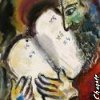
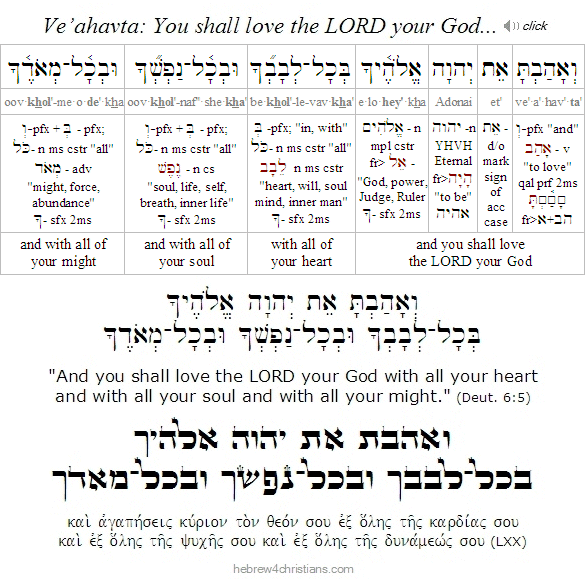
God will take away your stony heart and give you a new heart, along with a new spirit to be willing to know His love, as it is written, "I will give you a new heart, and a new spirit I will put within you. And I will remove the heart of stone from your flesh and give you a heart of flesh" (Ezek. 36:26). Your new heart will be like Yeshua's own: open, accessible, flexible, trusting, sharing, emotionally alive, able to feel, pulsating with God's energy and power...
The promise is this: "you shall love," since love is what is most true about who you are... You shall love the LORD, since He is the Source and End of all real love. You will love the LORD more and more, as you grow ever closer to Him and one day will behold Him panim-el-panim, "face to face." You shall love the LORD with all your heart, which implies God has indeed given you a new heart to love Him with; and with all your soul, which implies that you are enabled to truly feel, and that your heart is made tender and sensitized; and with all your might - that is, with all your "muchness," your "substance," or that reality that makes you who you really are in the LORD... May the LORD fulfill this prophecy in you, friend.
 |
Empathy of Moses...
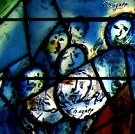
01.17.20 (Tevet 20, 5780) From our Torah portion this week (Shemot) we read: "when Moses grew up, he went out to his people and looked on their burdens" (Exod. 2:11). The sages say, "do not read, 'grew up,' but rather 'became great'" (וַיִּגְדַּל), since Moses exiled himself by opening his eyes to regard his people's suffering. Indeed Moses was made great as he emptied himself of his royal privilege and identified with the pain and misfortunes of others (Phil. 2:7). As is written: "By faith Moses was made great (μέγας γενόμενος) by refusing to be called the son of Pharaoh's daughter, choosing rather to be mistreated with the people of God than to enjoy the fleeting pleasures of sin" (Heb. 11:24-25).
Regarding this verse the famous medieval Torah commentator Rashi wrote, "Moses set his eyes and heart to feel their anguish." The midrash says that when Moses saw the hard labor of the people, he took their yoke upon him. Indeed some of the earlier sages said that sharing the burden of another is the essence of Torah, the very foundation of all heavenly obligation (Avot 6:6). Therefore the Apostle Paul wrote (Gal. 6:2): "Bear one another's burdens, and so fulfill the Torah of the Messiah (תּוֹרַת הַמָּשִׁיחַ)." Expressing empathy by identifying with the pains of others requires bittul hayesh (בִּטּוּל הַיֵּשׁ), or the setting aside of the ego, which is also the essential requirement for revelation from heaven. Hence Moses was given direct encounter with the Divine Presence because of his great humility.
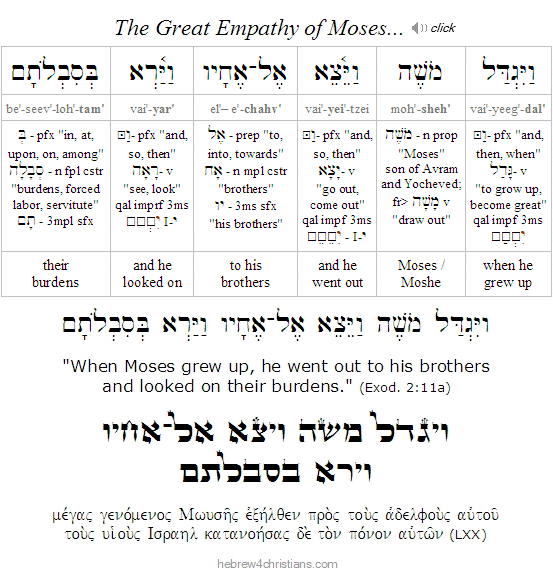 |
In order to say, "thy kingdom come, thy will be done" you must let go of your own agenda; your ego must be deposed from its petty little kingdom... Likewise, you can't say, "Come, Lord Jesus" by putting your fear first, or by otherwise demanding that your life should center on your own personal "advent." No, you must consciously choose to live in exile to this world (Gal. 6:14). How can we ever expect the LORD to live out His life through us if we do not genuinely offer our lives to Him? And yet this is exactly the problem of the ego...
"So-called pious people are unfree. They too lack the authentic certitude of inwardness. That is why they are so pious! And the world is surely justified in laughing at them. If, for example, a bowlegged man wants to be a dancing master but is not able to execute a single step, he is comical. So it is also with the multitudes who are so religious. Often you can hear the pious beating time, as it were, exactly like one who cannot dance but nevertheless knows enough to beat time, yet who are never fortunate enough to get in step. In order to reassure themselves, the pious seize upon grandiose ideas that the world hates. They battle ideas, but not with their lives. Such is the life of those who lack inwardness." - Kierkegaard (Journals)
Note: This is another example of the difficulty of truly trusting God for the miracle of spiritual regeneration and transformation... Some people scorn the idea of "easy believism," though of course there is nothing at all "easy" about exercising true faith in the LORD and living the truth in our lives. We need the miracle; we need grace from heaven to impart real passion for us to walk according to God's heart.
"These are the Names..."
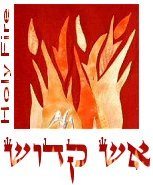
01.17.20 (Tevet 20, 5780) This week's Torah portion (the first of the Book of Exodus) is called Shemot (שְׁמוֹת, "names") because it begins with a list of the "names" of the sons of Jacob who came to dwell in the land of Goshen: וְאֵלֶּה שְׁמוֹת בְּנֵי יִשְׂרָאֵל הַבָּאִים מִצְרָיְמָה / "These are the names of the sons of Israel who came to Egypt" (Exod. 1:1). Now while it's true that the Scriptures here list the names of Jacob's descendants, this portion more importantly refers to the Names of the LORD God of Israel Himself. "These are the names..."
To see this, let's consider the central story of our reading, namely, the commissioning of Moses at the Burning Bush (see Exod. 3:1-20). Note that the Torah states that it was the Angel of the LORD (i.e., Malakh Adonai: מַלְאַךְ יהוה) who appeared to Moses בְּלַבַּת־אֵשׁ מִתּוֹךְ הַסְּנֶה / "in a flame of fire out of the midst of a bush" (Exod. 3:1-2). But then the Torah goes on to say that the LORD (יהוה) saw Moses drawing near to the bush while God (i.e., Elohim: אֱלהִים) called out to him. God (i.e., Elohim) then commanded Moses to remove his sandals and identified Himself as the "God of Abraham (i.e., Elohei Avraham: אֱלהֵי אַבְרָהָם), the God of Isaac (i.e., Elohei Yitzchak: אֱלהֵי יִצְחָק), and the God of Jacob (i.e., Elohei Ya'akov: אֱלהֵי יעֲקב)." In this short and dramatic account we have several Names of God presented - the Angel of the LORD, the LORD, God (Elohim), and the "God of Abraham, the God of Isaac, and the God of Jacob" - all of which refer to the One true God!
When God commissioned Moses to be His shaliach (שָלִיחַ) - His emissary - to go before Pharaoh and lead the children of Israel back to the Promised Land, he objected that he was unfit for the task. He protested that he was kevad peh - "heavy of mouth" and kevad lashon, "heavy of tongue," and therefore unable to speak on behalf of the LORD (Exod. 4:10). God reminded him that He was the Creator of the mouth: "Who makes him mute, or deaf, or seeing, or blind? Is it not I, the LORD?" (Exod. 4:11).
Perhaps it was because Moses was "heavy of mouth" that he continued to object to God's plan. After all, what would Moses say if he were asked what God's Name was? Perhaps Moses couldn't speak well enough to properly enunciate the Divine Name? It is revealing to understand the LORD's reply: אֶהְיֶה אֲשֶׁר אֶהְיֶה / "Eheyeh Asher Eheyeh ('I will be what I will be'); and He said, "Say this to the people of Israel, 'I AM (אֶהְיֶה) has sent me to you.'" Then God (i.e., אֱלהִים) went on to "spell it out" for Moses: "Say this to the people of Israel, 'The LORD (יהוה), [namely] the God of your fathers, [namely] the God of Abraham (אֱלהֵי אַבְרָהָם), [namely] the God of Isaac (אֱלהֵי יִצְחָק), and [namely] the God of Jacob (אֱלהֵי יעֲקב), has sent me to you.' This is my name forever (זֶה־שְּׁמִי לְעלָם), and this is my memorial throughout all generations" (Exod. 3:14-15).
 |
Now I included the Hebrew text here to make it explicit that the distinct Names of God in this passage (i.e., יהוה, אֱלהִים, מַלְאַךְ יהוה, and so on) all refer to the One true LORD God of Israel, Maker of Heaven and earth. Indeed, as I've mentioned before, the Torah makes it clear that the Name of the LORD YHVH (יהוה) is associated with the phrase eheyeh asher eheyeh (rendered as "I AM THAT I AM" in the KJV), which derives from the Qal imperfect first person form of this verb hayah (הָיָה): "I will be." In other words, there is a direct connection between the Name YHVH and Being and Reality itself. YHVH is the Source of all being and has being inherent in Himself (i.e., He is "necessary" Being). Everything else is contingent being that derives existence from Him. The name YHVH also bespeaks the utter transcendence of God. In Himself, God is beyond all "predications" or attributes of language: He is the Source and Foundation of all possibility of utterance and thus is beyond all definite descriptions. Hence the LORD is sometimes simply called HaShem, "the Name," since no amount of verbiage can do justice to the infinite majesty and truth of His Life...
People who get anxious about the name of God miss the point... As I've said before, God is "Presence" (Exod. 3:13-14), "Breath" (Gen. 2:7; Num. 16:22), "Life" (Deut. 30:20), "Love" (Exod. 34:6-7), and the "I-AM-WITH-YOU One" who keeps His promises. The Name YHVH (יהוה) means that "God was (i.e., hayah: היה), God is (i.e., hoveh: הוֶה), and God always will be (i.e., veyihyeh: וְיִהְיֶה)," which implies that He is ever present and not restricted by time or space. Moreover, God is called havayah (הֲוָיָה), which means He sustains creation by the Word of His power: "In Him we live, move, and have our being" (Acts 17:28; Heb. 1:3). Most important, though, from the point of view of our heart's faith, is the name Yeshua taught us to call upon God, namely "Abba, Father..." We know who God is as his beloved child.
Note: For more, see "Shemot: Divine Names Theology" and "Using the Name in Vain."
The Mirror of Hearts...
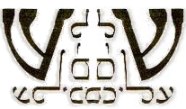
01.16.20 (Tevet 19, 5780) The Holy One, blessed be He, mirrors the heart; and as you are with God, so is God with you. The LORD reveals himself to us as we are to others (including ourselves); He mirrors our heart back to us. As Yeshua said, "According to your faith be it done unto you." Likewise it is written: "With the merciful you show yourself merciful; with the upright you show yourself upright; with the pure you show yourself as sacred; but with the perverse you show yourself perverse" (Psalm 18:25-26).
עִם־חָסִיד תִּתְחַסָּד
עִם־גְּבַר תָּמִים תִּתַּמָּם
עִם־נָבָר תִּתְבָּרָר
וְעִם־עִקֵּשׁ תִּתְפַּתָּל
eem-cha·seed · teet·cha·sahd
eem-ge·var · ta·meem · teet·ta·mam
eem-na·var · teet·ba·rar
ve·eem-ee·kesh · teet·pa·tal

"With the merciful you show yourself merciful;
with the upright you show yourself upright;
with the pure you show yourself as pure;
but with the perverse you show yourself devious."
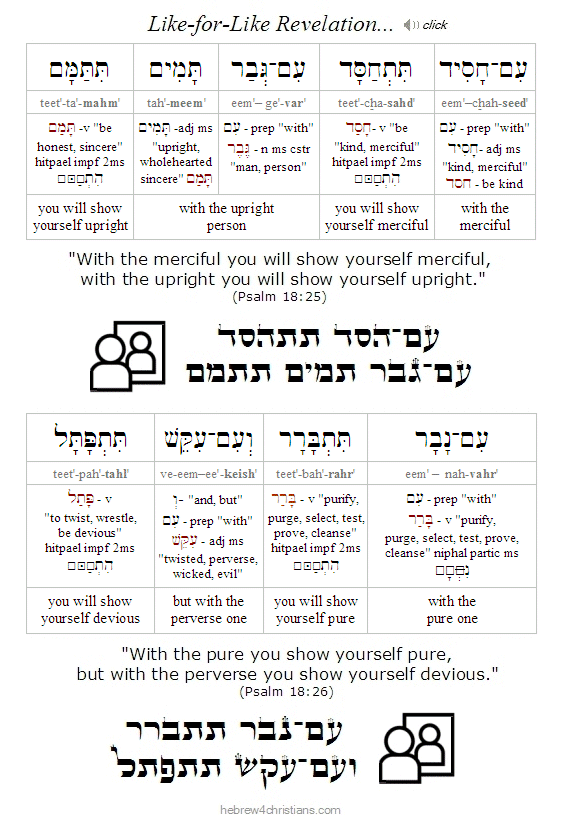
Note that each term in this passage (i.e., the merciful, the upright, etc.) is matched (or answered) with the hitpael (intensive reflexive) verb form. For example, with the the merciful or kindhearted person, God will show Himself as compassionate and sympathetic (Matt. 5:7); with the upright person, God will show Himself as perfect and right; with the one who is pure in heart, the LORD reveals Himself as sacred and holy (Matt. 5:8) –- but with the twisted (or perverse) person, God reveals Himself as contrary, stubborn, and even adversarial (the verb means to twist, spin, or even to wrestle in opposition).
The divine reciprocity is always "like-for-like." God reveals Himself with the same character and in the same "mode" that we show to others; God relates to us as we relate to others, middah keneged middah - "measure for measure" (Luke 6:38). In this way, the LORD "amplifies" by redoubling our relationships, which thereby mirrors the nature our character to ourselves. This is perhaps why we sometimes "replay" the same mistakes over and over again in our lives. God keeps us wandering in the desert to help us confront who we are inside, who we really are, which then may awaken within us the desire for teshuvah... The LORD "renders to men according to their deeds" (Gal. 6:7; Rom. 2:6; Psalm 62:12; Prov. 24:12; Jer. 17:11, etc.) – not in a vindictive way, of course, but to help us understand the nature of our actions and to help us turn back to Him. Are you in need of mercy? Then be merciful to others... Do you want to experience more of God's love? Then show love to others... Are you in need of forgiveness? Then forgive others and regard them with honor and esteem. As you do unto others, so will be done unto you, and so on...
We see then how important it is to think good and positive thoughts (Phil. 4:8) and to always try to use the "good eye" to see the best in others (Matt. 6:22). King David understood the principle of reciprocity when he said, "let what I prayed for others return to my own bosom" (תְּפִלָּתִי עַל־חֵיקִי תָשׁוּב, Psalm 35:13) and -- since our thoughts are prayers -- we need to be especially careful to think the best, to extend kaf zechut (the hand of merit) to everyone we meet... You are quick to make excuses for your own misdeeds; so make excuses also for your neighbor. God will take care of the outcomes, we need only focus on Him and obey.
Again, the Lord, blessed be He, mirrors the heart; and as you are with God, so is God with you (Psalm 118:25-26). Yet God is our Helper, and as we draw near to Him, so he draws near to us (James 4:8; Zech 1:3). Therefore may it please the Lord to renew our hearts so we may walk with Him in sincere love. May we forsake persecuting ourselves and instead be tolerant of our shortcomings, befriending our own souls. As is said in the Mishnah: אִם אֵין אֲנִי לִי, מִי לִי - "If I am not for myself, then who will be for me?" (Pirkei Avot 1:14). May we learn to regard ourselves kindly, despite our missteps and sins, and deeply rely on God to transform our inner life for good (1 Cor. 15:49). Salvation is God's great work being done within us, and may we reflect back the glory of God's love from hearts of genuine faith. As it is written, Adonai li, lo' ira (יְהוָה לִי לא אִירָא) "The LORD is for me; I will not fear" (Psalm 118:6).
יְהוָה לִי לֹא אִירָא
מַה־יַּעֲשֶׂה לִי אָדָם
Adonai · lee · loh · ee·rah
mah-ya·a·seh · lee · ah·dahm

"The LORD is for me; I will not fear:
what can man do to me?"
(Psalm 118:6)


Important Postscript: The idea that God "mirrors" our hearts back to us isn't the principle of "karma" as much as it is the means of sanctification... Sanctification then is a spiral upwards, if you will, and hardships and testing may be the means of refining the heart to bear suffering, to become more patient, to become more compassionate, etc. Such refining enables our hearts to better mirror the glory of the LORD to others.
Learning from Waste Places...

01.16.20 (Tevet 19, 5780) Forty years before encountering the LORD in the burning bush, Moses was full of himself, a prince of Egypt "mighty in word and deed" who self-confidently regarded himself as Israel's "deliverer" (Acts 7:22-25). But Moses' "Egyptian-styled" ego led him to regard murder and human uprising as the means of deliverance, and consequently God sent him into exile to think things through... It was there, in the waste places of the desert, that Moses' education began - the school of brokenness, teshuvah, and heart-listening... Only after this did the LORD appear to him, calling out to the man who had lost all confidence in the flesh. Moses' humility mirrored the emptiness of the desert: "Who am I?" he protested, "I can't do this thing..." (Exod. 3:11). Exactly! Now he understood. Similarly, we must be careful not to regard ourselves as "strong," since the power of the flesh is useless for the purposes of heaven (Zech. 4:6). As it is written, "Thus says the LORD: 'Cursed is the man who trusts in man and makes flesh his strength, whose heart turns away from the LORD. He is like a shrub in the desert, and shall not see any good come. He shall dwell in the parched places of the desert, in an uninhabited salt land" (Jer. 17:5-6). It was only after Moses' question, "Who am I?" was answered by God's "I AM who I AM," that the "useless shrub" became aflame with God's power...
Moses' rod, which he had relied upon for years in the desert as a shepherd, was transformed to be used as an instrument of Divine Power (Exod. 4:1-5). God entrusts the rod of His authority only in the hands of a truly broken man.... Similarly, though Moses was described as a man "mighty in word and deed," these were attributes of the flesh unrefined by the Spirit of God. Therefore, after being humbled in the desert, Moses confessed that he was kevad peh - "heavy of mouth" and kevad lashon, "heavy of tongue," and unable to speak on behalf of the LORD. God then told him that He would "be with his mouth" to teach him what to say (Exod. 4:10-12). This likewise teaches that God entrusts the utterance of his word to the tongue of a genuinely broken man...
 |
Being and Truth...

01.16.20 (Tevet 19, 5780) In our Torah portion this week, Moses asked for God's Name, and God then said ehyeh asher ehyeh (אֶהְיֶה אֲשֶׁר אֶהְיֶה), "I AM that I AM" (or "I will be what I will be"), abbreviated simply as ehyeh (אֶהְיֶה), "I AM" (Exod. 3:14). Note that God identifies himself with being itself, since ehyeh is the Qal imperfect form of the verb hayah (הָיָה), meaning "to be." Indeed, the Name YHVH (יהוה) essentially means "Presence," since God is called ha-hoveh, ve'hayah, ve'yavo (הַהוֶה וְהָיָה וְיָבוֹא) - "the One who is, and was, and is to come" (Rev. 4:8). This "threefold Name" of the LORD of Hosts encompasses all possible states of being, indicating that God is LORD over all possible worlds...
וַיּאמֶר אֱלהִים אֶל־משֶׁה אֶהְיֶה אֲשֶׁר אֶהְיֶה
וַיּאמֶר כּה תאמַר לִבְנֵי יִשְׂרָאֵל
אֶהְיֶה שְׁלָחַנִי אֲלֵיכֶם
va·yo'·mer · E·lo·heem · el · Mo·she · e·he·yeh · a·sher · e·he·yeh
va·yo'·mer · ko · to·mar · leev·nei · Yees·ra·el
e·he·yeh · she·la·cha·nee · a·le·khem

"God said to Moses, "I AM WHO I AM."
And he said, "Say this to the sons of Israel,
'I AM has sent me to you'" (Exod. 3:14)
Download Study Card


Note further that the Name YHVH (יהוה) is to be forever identified as "the God of Abraham, the God of Isaac, and the God of Jacob" (אֱלהֵי אַבְרָהָם אֱלהֵי יִצְחָק וֵאלהֵי יַעֲקב), as clearly stated by God in the immediately following verse (see Exod. 3:15). This should quiet the minds of those who are troubled with determining or pronouncing "YHVH," since the Source of Life, the Creator and Redeemer of life, is clearly to be known as "the God of the fathers" of the Jewish people, as Yeshua our LORD also taught (John 4:22).
Moses and the Messiah...
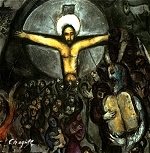
01.15.20 (Tevet 18, 5780) Like Joseph before him, Moses was a "picture" of Yeshua in various ways. Though he was an Israelite from the tribe of Levi, he appeared as a "prince of Egypt" to his own people and was educated in all the wisdom of the Egyptians (Acts 7:22). And though he was God's chosen deliverer, Moses was initially rejected by the Israelites and then turned to the Gentiles, taking a "foreign" bride. After being severely tested in the desert, he was empowered by God's Spirit to become Israel's deliverer for their hour of great tribulation. Indeed, both Moses and Yeshua were "sent from a mountain of God" to free Israel. Both revealed the meaning of God's Name; both spoke with God "face to face." Moses was sent from (physical) Mount Sinai in Midian; Yeshua was sent from a spiritual "Mount Zion" in Heaven (Heb. 12:22). The New Testament relates that Moses and Elijah later met with Yeshua to discuss His "departure," literally, "His Exodus" (τὴν ἔξοδον αὐτοῦ) that he would accomplish at Jerusalem to redeem the entire world (see Luke 9:30-31).
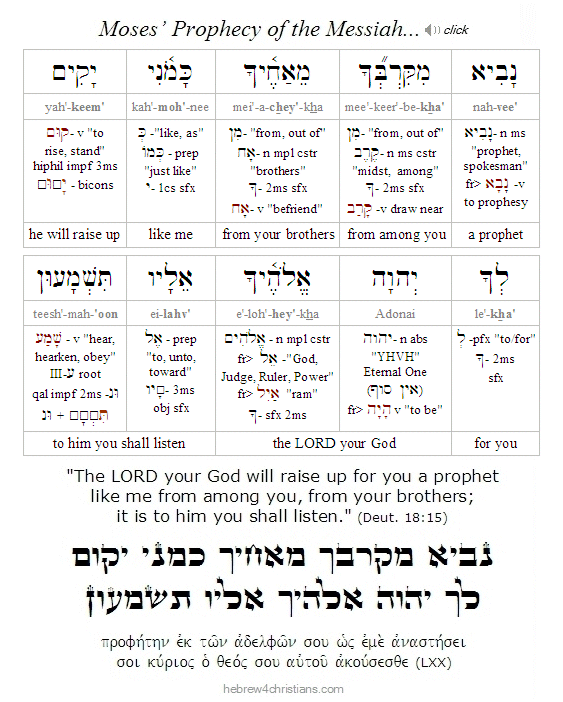 |
Note: For a more comprehensive list of the various correspondences between Moses and Yeshua, see the article, "Moses' Prophecy of the Messiah."
New Pharaoh's Dream...

[ The following is related to our Torah reading for this week, Parashat Shemot... ]
01.15.20 (Tevet 18, 5780) According to midrash, just as the Pharaoh during the time of Joseph was troubled by his dreams (Gen. 41:1-7), so was the "new king" that arose during the time of Moses. In the new Pharaoh's dream, an old man was standing before him as he sat on his throne, holding a balance in his hand. The old man placed all the nobles and governors of Egypt on one side of the balance, and on the other side, he placed one small lamb. To Pharaoh's astonishment, however, the lamb outweighed all the leaders of Egypt! When the king asked his advisors to interpret the dream, they said it foretold of a coming king who would overthrow the kingdom of Egypt and set the Israelites free. This coming one would excel in wisdom and his name would be remembered forever as the Savior of Israel.
Of course the rest of the Book of Exodus is essentially God's interpretation of the new Pharaoh's dream, as the great events of the Exodus would reveal. The LORD God of Israel forewarned this king that Egypt would come into judgment by the Lamb of God... Indeed, the only way to escape this judgment and the wrath of God was by being covered by the sacrificial blood of the lamb... The Lamb of God is central to Israel's deliverance and becomes the focal point of the revelation of the sanctuary later given at Sinai.
Israel was redeemed from Egypt by trusting in the promise of their deliverance, as it is written, "and the people believed" (וַיַּאֲמֵן הָעָם) ... and bowed their heads and worshiped" (Exod. 4:31). Recall that the blood of the korban Pesach - the Passover lamb - was to be smeared on the two sides and top of the doorway, resembling the shape of the letter Chet (ח). This letter, signifying the number 8, is connected with the word חי (chai), short for chayim (life). The blood of the lamb (דַּם הַשֶּׂה) not only saves from the judgment of death, but it also is the means of imparting divine life and power...
 |
From the Midst of the Thorns...
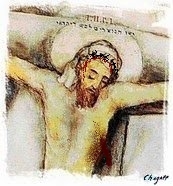
01.15.20 (Tevet 18, 5780) Why did the LORD, the Holy One, reveal Himself to Moses out of the midst of a lowly thorn bush, and not some grand tree? God lowered himself to speak from within the bush, as it is written: "For though the LORD be high, he regards the lowly" (Psalm 138:6); and "I will be with him in trouble" (Psalm 91:15). The midrash imagines God saying to Moses: "Don't you feel that I suffer anguish whenever Israel does? Know, therefore, from the character of the place from which I speak, out of the thorn bush, that I, as it were share their suffering" (Shemot Rabbah 2:7). God speaks to us from the place of thorns – even those about his own head – words of great comfort and deliverance. From the midst of the fire (בְּלַבַּת־אֵשׁ מִתּוֹךְ הַסְּנֶה), within the lowliest of places, covered in the thorns of our sin and shame, Yeshua speaks words of healing love.
כִּי־רָם יְהוָה וְשָׁפָל יִרְאֶה
וְגָבהַּ מִמֶּרְחָק יְיֵדָע
kee · rahm · Adonai · ve·sha·fahl · yeer·eh
ve·gah·voh'·ha · mee·mer·chak · ye·ei·da'

"For though the LORD is exalted, He regards the lowly,
but the haughty He knows from afar."
(Psalm 138:6)
Hebrew Study Card


God Knows your Name...

[ The following is related to our Torah reading for this week, Parashat Shemot... ]
01.15.20 (Tevet 18, 5780) The Book of Exodus begins, ve'eileh shemot (וְאֵלֶּה שְׁמוֹת), "and these are the names" (of the sons of Israel). God call each person by name to make the journey... Indeed, God calls each star by its own name (Gen. 22:17, Psalm 147:4) and yet He also knows each lily of the field and sparrow that flutters its wings (Matt. 6:28-30, 10:29). As Yeshua said, even the hairs on your head are all numbered (Matt. 10:30). In Jewish theology, the term hashgachah pratit (הַשְׁגָּחָה פְּרָטִית) refers to God's personal supervision of our lives (hashgachah means "supervision," and pratit means "individual" or "particular"). Since God is the Master of the Universe, His supervision and providence reaches to the smallest of details of creation - from subatomic particles to the great motions of the cosmos. Of particular interest, however, are those whom He created be'tzelem Elohim: in His image and likeness. The LORD is called אלהֵי הָרוּחת לְכָל־בָּשָׂר / Elohei ha-ruchot lekhol-basar: "The God of the spirits of all flesh" (Num. 16:22), and that means that every spirit ultimately answers to Him.
אָנָה אֵלֵךְ מֵרוּחֶךָ
וְאָנָה מִפָּנֶיךָ אֶבְרָח
a·nah · ei·leikh · mei·roo·che'·kha
ve·a'·nah · mee·pa·ney'·kha · ev·rach

"Where shall I go from your spirit?
Or where shall I flee from your presence?"
(Psalm 139:7)

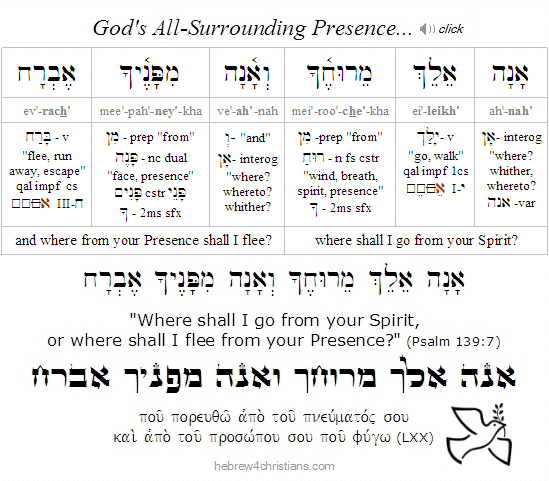
We find great comfort when we understand that God has complete authority over categorically everything in the universe -- including our ultimate welfare (John 10:27-28). When we pray to the LORD God of Israel, we intuitively understand that He is completely sovereign and Lord over all things... All power, glory, authority, and dominion is His alone, and all that is in the heaven and in the earth is His (1 Chron. 29:11-12). We do not worry that He is incapable of handling our troubles or that He is unable to help us. No, we acknowledge that the God most High (אֵל עֶלְיוֹן) sustains all things by the Word of His power (Col. 1:17). He is "the blessed and only Sovereign, the King of kings (מֶלֶךְ הַמְּלָכִים) and the Lord of lords" (1 Tim. 6:15). Whenever we think clearly in light of the revelation of Scripture, we apprehend the truth about God's sovereign glory and power...
Worldly Philosophy and Faith...

01.14.20 (Tevet 17, 5780) Worldly philosophy can never bring a person to God, since human reason by itself serves as an instrumentality of the will, and therefore apart from faith philosophical reasoning fills the mind with unending questions and doubts that reinforce unbelief and innate evil impulses: "The natural person (i.e., ψυχικός, the worldly-minded, "soulish" person) does not accept the things of the Spirit of God, for they are folly to him, and he is not able to understand them because they are spiritually discerned" (1 Cor. 2:14; Rom. 8:7). Worldly philosophy is inimical to faith in God since it undermines the vision and conviction that reality itself demands reverence, and therefore its bias is to reject the idea of divine Lawgiver (i.e.. transcendental moral truth) in order to evade the idea of retribution for wrongdoing. However it is precisely this fear of retribution for sin that constitutes the first step of faith, since the "fear of the LORD is the beginning of wisdom, and to depart from evil is understanding" (Prov. 1:7, 3:7, 14:6; Job 28:28; Psalm 34:14; etc.). Incidentally, any form of "Christianity" that minimizes the divine wrath for sin perverts the meaning of the gospel itself, confusing worldly sentimentality with the terrible price paid for the atonement... However if there is no retribution for sin, there is no need for the cross, and that leads to the false teaching sometimes called "cross-less Christianity." The Apostle Paul would describe those who deny the wrath of God and the need for divine blood atonement as the "enemies of the cross of Messiah" (τοὺς ἐχθροὺς τοῦ σταυροῦ τοῦ χριστου), and indeed the focus of his ministry was centered on the Messiah Yeshua who was crucified for our healing: "For I decided to know nothing among you except Yeshua the Messiah and him crucified" (1 Cor. 2:2; 2 Cor. 5:18). There is simply no gospel message apart from the truth of the verdict of the law, and therefore the first step of faith is to fear God's wrath for sin and to tremble before the remedy given in the sacrifice of Yeshua...
It is written, "with the pure you show yourself pure; but with the perverse you show yourself perverse" (Psalm 18:26, Titus 1:15). We see by means of faith, and what we see is also the result of faith. As Yeshua said, "according to your faith be it done to you" (Matt. 9:29). For the one who trusts in God's holiness and love, the whole world will be lit up with divine glory (Isa. 6:3), but to the one who trusts in his own reasoning, demanding to understand in order to believe, the whole world will be filled with darkness, vanity, and despair. To the believer in the Lord, worldly philosophy is a dead end since it is devoid of life and blessing. Torah begins without philosophical rationalization by simply affirming, "In the beginning God created the heavens and the earth" (Gen. 1:1). We believe in God because he imparts the blessing of faith, not because of philosophical speculation or rational arguments. Therefore Scripture admonishes us to be "simple" before the LORD, that is, "wholehearted" and full of confidence (Deut. 18:13). Philosophy and worldly wisdom offer up speculations, probabilities, and tentative inferences, but the life of faith encounters the urgency of the moment, when the heart casts itself in complete abandonment before God. Philosophy says, "let's consider the evidence," but faith says, "you shall love the LORD your God with all your heart, with all your soul, and with all your might" (Deut. 6:5). Worldly philosophy is childish because it trifles with the meaning of life, pretending to be "objective" in its thinking and observations; it is, however, cowardly because it does not want to venture the risk of faith, and it is disingenuous because its refuses to recognize that its own set of presuppositions constitutes a system of faith, a "religion" of the ego and its self-styled rationalizations. "For the wisdom of this world is folly with God. For it is written, "He catches the wise in their craftiness," and again, "The Lord knows the thoughts of the wise, that they are vain" (1 Cor. 3:20).
 |
Now while worldly philosophy is often little more than the mutterings of fools (Psalm 14:1), there is a "hidden wisdom" (חָכְמַת נִּסְתָּרָה) of God that is not grounded in worldly speculations, that is, "the wisdom of God in a mystery, even the hidden wisdom, that God ordained before the world for our glory" (1 Cor. 2:7). This is the wisdom of God revealed in the overarching plan of redemption given in the Scripture, a plan that transcends human reason yet is discerned by the spirit to be of divine origin (Eph. 3:9-11; Rom. 16:25-26; 1 Tim. 3:16; Rom. 11:33-36). Moreover God has implanted within the human heart a "hunger for eternity" (Eccl. 3:11), intuitions of the divine power who designed and created the universe (Psalm 19:1-2; Rom. 1:20), and an innate sense of justice within the soul to reveal moral reality (i.e., the conscience). Moreover, the right use of logic and reason - when submitted to the obedience of faith - is assuredly useful as we seek to interpret Scripture and apply its significance to our lives. "Faith seeking understanding" is a valid approach when interpreting Scripture, though even then, when logical paradoxes arise (e.g., the paradox between free will and God's foreknowledge, or the paradox that the infinite became finite in the incarnation of Yeshua) we must confess to the limitations of reason and resort to pure faith - trusting in the LORD God who is beyond our understanding (Prov. 3:5-7; Psalm 145:3; Isa. 40:13, 28).
Faith sees the invisible... "For the things that are seen are transient, but the things that are unseen are eternal... For the invisible things of Him from the creation of the world are clearly seen, being understood by the things that are made, even his eternal power and Godhead. Therefore we are strangers and exiles on the earth, looking forward to the city that has foundations, whose designer and builder is God" (2 Cor. 4:18; Rom. 1:20; Heb. 11:10,13). Our father Abraham was promised descendents as numerous as the stars in the sky or sand on the seashore, despite the fact that he was an old man and his wife had long past the age of bearing children. Abraham believed in the One who gives life to the dead and calls into existence the things that do not exist: "He staggered not at the promise of God through unbelief but was strong in faith, giving glory to God; and being fully persuaded that, what He had promised, He was able also to perform: And therefore it was imputed to him for righteousness" (Rom. 4:19-22). By faith Abraham looked beyond the stars, closing his eyes to this world, and thereby discovered the inner light of truth...
 |
Through the Straits...

[ The following is related to our Torah reading for this week, Parashat Shemot... ]
01.14.20 (Tevet 17, 5780) The name for ancient Egypt in Hebrew is "mitzrayim," a word that can be translated as "narrow places" (i.e., -מ, "from," and צַר, "narrow"), suggesting that "Egypt" represents a place of constriction, tribulation, oppression, slavery, and despair. The Hebrew word for salvation, on the other hand, is "yeshuah" (יְשׁוּעָה), a word that means deliverance from restriction, that is, freedom and peace. As it is written: "From my distress (מִן־הַמֵּצַר), i.e., from "my Egypt," I called to the LORD; the LORD answered me and set me in a wide open place" (Psalm 118:5). But why, it may be asked, did God tell Jacob: "Do not be afraid to go down to Egypt" (Gen. 46:3)? Why did God allow this excursion into "heavy darkness" that Abraham clearly foresaw (Gen. 15:12-13)? What is there about Egypt that prepares us to take hold of our promised inheritance? Joseph become a prince of Egypt; however, he was still a captive to Pharaoh, and later, after Joseph died, a "new Pharaoh arose" that did not acknowledge his contribution to Egyptian history (Exod. 1:8). All that remained of Joseph were his bones – a chest of bones that were carried out by Moses (and later buried by Joshua in Shechem). These "bare bones" of Joseph represented the essence of his faith, as he foresaw the time when God would rescue the family from Egypt and raise him up in the land of promise (Gen. 50:24-26; Heb. 11:22).
A principle of spiritual life is that we descend in order to ascend, or the "the way up is the way down" (John 12:24). As Yeshua said, "Whoever would be first among you must be slave of all" (Mark 10:44). Becoming nothing (i.e., ayin) in this world is the condition for seeing something in the world to come. But we become "nothing" by trusting in the promise of God, not by trying to do it ourselves... This is not another venture of the ego. Life in the Spirit means trusting that God will do within you what you cannot do for yourself... We can only take hold of what God has done for us by "letting go" of our own devices (Phil. 2:13). When we let go and trust, we will be transformed, carried by the "Torah of the Spirit of life" (i.e., תּוֹרַת רוּחַ הַחַיִּים, Rom. 8:2), The way is not trying but trusting; not struggling but resting; not clinging to life, but letting go...
God's way of deliverance is entirely different than man's way. Man tries to enlist carnal power in the battle against sin (i.e., religion, politics, etc.), but God's way is to remove the flesh from the equation. The goal is not to make us stronger and stronger, but rather weaker and weaker, until the ego is crucified and only the sufficiency of the Messiah remains. Then we can truly say, "I have been crucified with Messiah. It is no longer I who live, but the Messiah who lives in me. And the life I now live in the flesh I live by faith in the Son of God, who loved me and gave himself for me" (Gal 2:20). The word "Hebrew" (עִבְרִי) means one who has "crossed over" (עָבַר) to the other side, as our father Abraham did when he left the world of Mesopotamia (Gen. 14:13). Likewise it is on the other side of the cross that we experience the very power that created the universe "out of nothing" (i.e., yesh me'ayin: יֵשׁ מֵאַיִן) and that raised Yeshua the Messiah from the dead.
About Ahavah ("love")
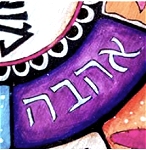
01.13.20 (Tevet 16, 5780) Love is more of a decision than it is a feeling... It is based more on a commitment, or an act of will, than on personal sentiments. Many people are feckless and half-hearted today because they passively allow their personal preferences to determine their sense of commitment, rather than the other way around. Such love invariably grows cold and fades away. Of course human feelings are important, but by themselves they are insufficient to express real love. Indeed a Hebrew word for love or affection is chibah (חִבָּה) which comes from the root word chovah (חוֹבָה), meaning an "obligation" or "duty." Likewise the Hebrew word for "friend," chaver (חָבֵר), shares the same root (i.e., chavar: חָבַר), which means to "join together" or "to unite." Connected with the idea of affection or friendship, then, is the idea of binding loyalty to another (חִיֵּב). We see this connotation in the word choveret (חוֹבֶרֶת), meaning the "clasp" used to hold up the curtains at the Tabernacle, and also in the word machberet (מַחְבֶרֶת), the word for "binder" or "clamp" (in modern Hebrew machberet means a "notebook").
To simplify these linguistic connections, it may be said that true love is based on a sense of care, obligation, and loyalty (i.e., chibev: חִבֵּב) more than it is based on subjective feelings, and this implies that such feelings (by themselves) should never be the basis for expressing love. Carnal love is expressed as eros (ἔρως), or desire, but divine love is expressed as agape (ἀγάπη). Even tax collectors know how to express selfish love, but God's love is expressed through a decision to care for others according to the truth. Feelings of love are a by-product of the decision to love, and they may arise as you act in love toward another person, though the duty to love abides even if you are devoid of such feelings. This explains, then, how the Torah can command us to love others, since caring for others is ultimately a decision. God commands what is possible: "ought implies can." We can love others for whom we may have no personal desire through obedience to God's commandment to love.
In this connection, note that the Hebrew word for "neighbor," re'ah (רֵעַ), is related to the word for "shepherd," ro'eh (רוֹעֵה), which suggests that loving your neighbor means looking after them and caring for them as a shepherd does for his sheep. Loving others, then, means demonstrating concern for their well-being and welfare, and conversely, demonstrating care for their well-being and welfare expresses love.
Besides the word chibah (חִבָּה), the word for divine love is ahavah (אַהֲבָה), from the verb ahav (אַהַב) that suggests א, "I will," + הַב, "give," that is the presence of benevolence. The gematria of the word ahavah is 13, which is exactly 1/2 of the value of the Name of God (יהוה), which further implies that when we give of ourselves to another, the Divine Presence is with us. The word ahavah also can be read as "I will give the Spirit," from א, "I will," + הַב, "give," + ה, "spirit." The Spirit of God's love broods over us all. The very first occurence of the word ahavah in the Bible is found in Gen. 22:2 regarding Abraham's love for his son Isaac whom he was asked to give up as a burnt offering at Moriah. The word ahuv (אָהוּב) means "beloved"; ahuvi (אָהוּבִי) means "my beloved." The infinitive form ("to love") is le'ehov (לֶאֶהוֹב).
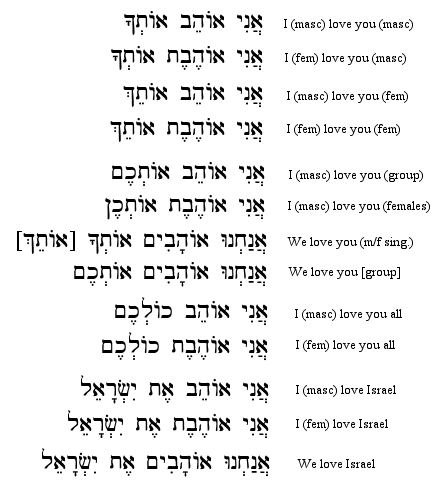 |
Man of Sorrows...

[ The following is related to our Torah reading for this week, Parashat Shemot... ]
01.13.20 (Tevet 16, 5780) God had compassion for the Jewish people as they were suffering in Egypt. The LORD told Moses, "I have surely seen the affliction of my people who are in Egypt and have heard their cry... I know their sorrows" (Exod. 3:7). The grammar here is intense: "seeing I have seen" (רָאה רָאִיתִי). Understand, then, that God surely sees your struggles, friend. Second, know that God heeds the outcry (צְעָקָה) of your heart, and indeed, he interprets your groaning as if it were for the sake of serving him. Your heart's cry is transformed by grace to be the cry for God himself, for relationship with Him: "The cry of the people has come to me," he again told Moses (Exod 3:9), which means all the sufferings, the wrongs, the hopes, the fears, the groans, the despair, the prayers, were present before him, as if he counted every word and sigh. Third, realize that God knows your sorrows; he gathers all your tears into his bottle (Psalm 56:8). The word translated "sorrows" (מַכְאב) is the same used to describe the "Man of sorrows" (אישׁ מַכְאבוֹת), Yeshua our Suffering Servant, who gave up his life to deliver you from darkness, sorrow, and fear (Isa. 53:3-5).
"If there is anywhere on earth a lover of God who is always kept safe from falling, I know nothing of it, for it was not shown to me. But this was shown - that in falling and rising again we are always kept in that same precious love. Between God and the soul there is ultimately no between." - Julian of Norwich
God's All-Sufficient Presence...
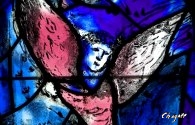
[ The following is related to our Torah this week, Parashat Shemot... ]
01.13.20 (Tevet 16, 5780) When Moses asked God why he was chosen to be his emissary, the LORD did not explain His choice in natural terms; nor did not appeal to Moses' past experiences, or his potential, or even his great humility... Instead God simply said that whatever inadequacies Moses might indeed have, being in a personal relationship with Him was entirely sufficient: "for I will be with you" (i.e., ki eheyeh imakh: כִּי־אֶהְיֶה עִמָּךְ). That is all that Moses would need (Exod. 3:12).
When Moses further sought to justify his calling as a true prophet sent from God, however, he asked to know God's "name" (see Exod. 3:13). God's response to the request was enigmatic: אֶהְיֶה אֲשֶׁר אֶהְיֶה - ehyeh asher ehyeh: "I will be what I will be" (or I am what I am), which may be understood as, "It doesn't matter what my Name is - I will be what I will be - all that matters is that I will be with you (ehyeh imakh), and that is enough! Indeed, God's name is nifla (נִפלָא) - "wonderful and incomprehensible" (Judges 13:18; Psalm 139:6), since the LORD is infinite and beyond comparison to finite things (Psalm 147:5). God is the great "I AM" that pervades all of Reality (אָנכִי), the glorious Eternal Personal Presence (i.e., hayah, hoveh, ve'yihyeh) whose power constantly sustains all things. Most of all, He is declared and expressed as our Savior, the One who reveals the face of God to us all (2 Cor. 4:6).
וַיּאמֶר אֱלהִים אֶל־משֶׁה אֶהְיֶה אֲשֶׁר אֶהְיֶה
וַיּאמֶר כּה תאמַר לִבְנֵי יִשְׂרָאֵל
אֶהְיֶה שְׁלָחַנִי אֲלֵיכֶם
va·yo'·mer · E·lo·heem · el · Mo·she · e·he·yeh · a·sher · e·he·yeh
va·yo'·mer · ko · to·mar · leev·nei · Yees·ra·el
e·he·yeh · she·la·cha·nee · a·le·khem

"God said to Moses, "I AM WHO I AM."
And he said, "Say this to the sons of Israel,
'I AM has sent me to you'" (Exod. 3:14)
Hebrew Study Card


Regarding the question of whether we can fully apprehend the "inner meaning" of the Name of God (יהוה), we read the following vision from the New Testament: "Then I saw heaven opened, and behold, a white horse! The one sitting on it is called 'Faithful and True' (נֶאֱמָן וְיָשָׁר), and in righteousness he judges and makes war. His eyes are like a flame of fire, and on his head are many diadems, and he has a Name written that no one knows but himself (שֵׁם כָּתוּב אֲשֶׁר לא־יָדַע אִישׁ כִּי אִם־הוּא לְבַדּוֹ). He is clothed in a robe dipped in blood, and the Name by which he is called is 'the Word of God' (דְּבַר הָאֱלהִים). And the armies of heaven, arrayed in fine linen, white and pure, were following him on white horses. From His mouth comes a sharp sword with which to strike down the nations, and He will rule them with a rod of iron. And He will tread the winepress of the fierce fury of the wrath of God, the Ruler over All, the LORD God Almighty (יְהוָה אֱלהֵי צְבָאוֹת). On his robe and on his thigh he has a Name written, the King of kings (מֶלֶךְ הַמְּלָכִים) and the Lord of lords (אֲדנֵי הָאֲדנִים). And with the breath of his lips He will slay the wicked" (Rev. 19:11-16).
Notice that in this passage the LORD both has a Name that no one knows but Himself and also that is He is called 'Faithful and True,' 'the Word of God,' and so on... In other words, within Himself God's Name is something that only He can truly understand, though we can know what He is called based on the revelation and analogical language of the Scriptures.
The Importance of Exodus...

[ This week we begin reading the Book of Exodus (sefer Shemot) for the current Jewish year... ]
01.12.20 (Tevet 15, 5780) The Exodus is perhaps the most fundamental event of Jewish history; it is "the" miracle of the Torah. In addition to being commemorated every year during Passover (Exod. 12:24-27; Num. 9:2-3; Deut. 16:1), it is explicitly mentioned in the first of the Ten Commandments (Exod. 20:2), and it is recalled every Sabbath (Deut. 5:12-15). The festivals of Shavuot (Pentecost) and Sukkot (Tabernacles) likewise derive from it (the former recalling the giving of the Torah at Sinai and the latter recalling God's care as the Exodus generation journeyed from Egypt to the Promised Land), as does the Season of Teshuvah (repentance) that culminates in Yom Kippur (the Day of Atonement). Indeed, nearly every commandment of the Torah (including the laws of the Tabernacle and the sacrificial system) may be traced back to the story of the Exodus, and in some ways, the entire Bible is an extended interpretation of its significance. Most important of all, the Exodus both prefigures and exemplifies the work of redemption given through the sacrificial life of Yeshua the Messiah, the true King of the Jews and the blessed Lamb of God.
The deeper meaning of exile concerns blindness of the divine presence. The worst kind of exile is not to know that you are lost, away from home, in need of redemption... That is why Egypt (i.e., Mitzraim) is called metzar yam - a "narrow straight." Egypt represents bondage and death in this world, and the exodus represents salvation and freedom. God splits the sea and we cross over from death to life. Since Torah represents awareness of God's truth, Israel was led into a place of difficulty to learn and receive revelation (Gen. 46:1-7). Out of the depths of darkness God's voice would call his people forth. Likewise we understand our "blessed fault," the trouble that moves us to cry out for God's miracle in Yeshua... Indeed the New Testament states that Yeshua "appeared in glory and spoke of his exodus (τὴν ἔξοδον αὐτου) which he would accomplish at Jerusalem" (Luke 9:31).
The Book of Exodus...
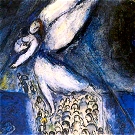
01.12.20 (Tevet 15, 5780) Over the next several weeks (until the middle of March) we will be reading and studying the Book of Exodus (סֵפֶר שְׁמוֹת) and considering its message in light of revelation of Yeshua our Messiah (there are forty chapters in this book that are traditionally divided into eleven weekly Torah readings). Some of the greatest narratives of all the Scriptures are found in this amazing book, including the Israelites' enslavement and subsequent deliverance with the ten plagues by the hand of the LORD. After the great Passover, Moses led the people out of the land Egypt, crossing the Sea of Reeds, and arriving at Sinai to receive the Torah exactly 49 day later. While Moses was on the mountain, however, the people worshipped a Golden Calf, and a long period of repentance occurred until the covenant was reestablished. The remainder of the book describes the vision and construction of the Mishkan (Tabernacle) -- the great Altar upon which a defect-free lamb was offered every day and every night...
In English the word "Exodus" ("going out") comes from the title of the ancient Greek translation of the phrase Sefer Yetziat Mitzraim ("the book of the going out from Egypt"). Hence the Greek word ἔξοδος became "Exodus" in Latin which later was adopted into English. In the Hebrew Bible this book is called Shemot ("names"), following the custom of naming a book according to its first significant word.
Parashat Shemot - שמות

01.12.20 (Tevet 15, 5780) Our Torah reading for this week is the very first of the Book of Exodus, called parashat Shemot (שְׁמוֹת). This portion begins directly where the Book of Genesis left off, namely by listing the various "names" (shemot) of the descendants of Jacob who came to Egypt to live in the land of Goshen. Over time Jacob's family flourished and multiplied so greatly that the new king of Egypt – who did not "remember" Joseph - regarded them as a political threat and decided to enslave them. When the king's oppression did not curb their growth, however, he cruelly commanded the Hebrew midwives to kill all newborn Jewish boys. When the midwives bravely refused to obey, however, the Pharaoh commanded that all newborn boys were to be drowned in the Nile river (the Hebrew word for Egypt, Mitzrayim (מִצְרַיִם), can be rearranged to form the phrase tzar mayim (צַר מַיִם), meaning "torture through water," which was the plan of the nefarious Pharaoh).
During this time of terrible and appalling oppression, a family from the tribe of Levi bore a son and hid him for three months. When the baby could no longer be concealed, however, his mother Yocheved (יוֹכֶבֶד) set him afloat in the Nile River inside a basket, praying that he might somehow escape death. Miriam (מִרְיָם), the baby's sister, watched what would happen, and soon the basket was discovered by the daughter of Pharaoh, who decided to save the baby and adopt him as her own son. Miriam then cleverly offered to have her mother become the baby's wet-nurse for the princess. After the child was duly weaned, he was brought to Pharaoh's palace to live as the princess' son. The Egyptian princess named him "Moses" (משֶׁה), meaning "drawn out" (מָשָׁה) of the water.
Later, when Moses was a full-grown man, he "went out to his people and looked on their burdens." When he saw an Egyptian beating an Israelite slave, he killed the Egyptian and hid his body in the sand. The following day he tried to reconcile two Israelites who were fighting, but the one in the wrong prophetically objected: "And who made you a prince and judge over us? Do you want to kill me as you killed the Egyptian yesterday?" Upon hearing this Moses decided to flee from Egypt to Midian. There he rescued Zipporah (צִפּרָה), the daughter of Jethro (יִתְרוֹ), a Midianite priest. Soon afterward, Moses decided to work for Jethro and married Zipporah. They had a son named Gershom (גֵּרְשׁם).
After nearly 40 years living in Midian as a shepherd, God called out to Moses from the midst of a burning bush (סְנֶה בּוֹעֵר) to commission him to lead the Israelites out of Egypt back to the land He promised to the descendants of Abraham, Isaac, and Jacob. When Moses protested that he was inadequate for this task, God gave him three "signs" to authenticate his message. God also appointed his brother Aaron to be his spokesperson. Moses and Aaron then went to the Pharaoh and demanded that the Israelites be permitted to leave Egypt to worship the LORD in the wilderness. The Pharaoh, however, dismissed Moses and his God, and increased the workload of the slaves by forcing them to make bricks without straw.
May we all have great joy and strength as we begin reading a new book of Torah this week. Chazak ve'amatz, mechayil el-chayil chaverim...
Hebrew Phrase: "Mechayil el Chayil"

01.12.20 (Tevet 15, 5780) The Biblical phrase mechayil el chayil (מֵחַיִל אֶל־חָיִל) means "from strength to strength," derived from Psalm 84:7. In Jewish contexts saying mechayil el chayil is to offer a blessing for success on momentius occasions, such as a bar or bat-mitzvah (the word chayil (חַיִל) denotes "strength" and "prosperity"). Colloquially the phrase "from strength to strength" has generally come to refer to a wish for someone to become more and more successful or confident, or to move from one good success to another. A more general phrase of encouragement is simply, "May you be ben-chayil" [for a man] or "May you be bat-chaylil" [for a woman] -- that is, may you be or son or daughter of strength... In the Book of Proverbs the ideal godly woman is described as eshet chayil (אֵשֶׁת־חַיִל) "a woman of valor or strength" (Prov. 31:10-31).
Hebrew and Creation...
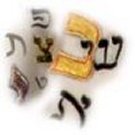
01.10.20 (Tevet 13, 5780) In Hebrew, the word for "word" is davar (דָּבַר), which also means "thing," suggesting a correspondence between divine speech (i.e., lashon hakodesh) and reality itself. By the power of the word, God "spoke" the universe into existence. Indeed the very first word of Scripture, bereshit (בְּרֵאשִׁית), often translated as "in the beginning," may be read as "by means of the first thing," where the "first thing" is the Hebrew alphabet itself. "Bereshit bara Elohim et..." therefore can be read, "by means of the Aleph-Tav (את) God created the heavens and the earth" (Gen. 1:1), implying that Aleph-Tav (i.e., the alphabet) precedes all created realms. However, we know that Yeshua is Word of God and the Aleph-Tav, the first and last (Rev. 22:13; Isa. 48:12), and therefore the verse can be read, "by means of Yeshua God created the heavens and the earth," which of course agrees with John 1:1-3 and Col. 1:16-17, "For by Him [Yeshua] all things were created..."
בְּרֵאשִׁית בָּרָא אֱלהִים אֵת
הַשָּׁמַיִם וְאֵת הָאָרֶץ
be·re·sheet · ba·ra · E·lo·heem · et
ha·sha·ma'·yeem · ve·et · ha·a'·retz

"In the beginning God created
the heavens and the earth."
(Gen. 1:1)

Hebrew Study Card
Note: Some of the sages connected the first Aleph-Tav (i.e., את) in Gen. 1:1 with the following letter Hey (ה) in the word ha-shamayim to form the word atah (אַתָּה), the Hebrew word for "you." This would then form, bereshit bara Elohim atah (בְּרֵאשִׁית בָּרָא אֱלהִ֑ים אֵתה) which could be interpreted as, "In the beginning God created you." And since the letter Hey represents the Holy Spirit in Jewish tradition, each time we say the word "atah" we connect all the Hebrew letters - from Aleph to Tav - with the Holy Spirit.
The Troubles of Love...

01.10.20 (Tevet 13, 5780) People tend to believe what they want to believe until they are faced with reality, and therefore God orchestrates tests and challenges to awaken people from their illusions to make them confront their need for deliverance. Such afflictions are called yissurim shel ahavah, "troubles of love." Thus we read in our Torah how the people groaned because of their slavery and then cried out to heaven for help: "And God heard their groaning; he remembered his covenant ... and God saw the people of Israel, and God knew" (Exod. 2:24-25). Note the pattern: The people cried out for help; God heard (וַיִּשְׁמַע); he remembered (וַיִּזְכּר), he saw (וַיַּרְא); and he knew (וַיֵּדַע)... God knows our profound need for Him. Affliction teaches us that wishful thinking is unable to sustain the weight of reality, and only God Himself can truly save us...
Where it says, "How long shall I take counsel in my soul, having sorrow in my heart daily" (Psalm 13:2), the sages remark that just as long as we take counsel in our own soul there will be despair, since only after we realize that no further counsel can help us do we give up and confess our need for God's salvation. Therefore בְּטַח אֶל־יְהוָה בְּכָל־לִבֶּךָ, "trust in the LORD with all your heart, and do not lean on your own understanding" (Prov. 3:5).
 |
Revelation of our Words...
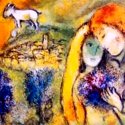
01.10.20 (Tevet 13, 5780) The sages have said, "From a person's mouth you can tell who they are," which means that the words we speak reveal the inner condition of the soul and whether the Spirit of God is in control of our thinking or our lower nature... Because we are created in the image of God (i.e., b'tzelem Elohim: בצלם אלוהים), our thoughts express our essential nature, and that is why it is vital to avoid evil thinking, since otherwise we will be brought into darkness and pain. As Yeshua said, "the good person out of the good treasure of his heart produces good, and the evil person out of his evil treasure produces evil, for out of the abundance of the heart his mouth speaks" (Luke 6:45). The Hebrew word for evil (i.e., ra': רַע) also means sad or "heartbreaking." We must learn to discipline ourselves to think good thoughts since that brings us before the light and blessing of the Father of Lights (אֲבִי הָאוֹרוֹת) from which every good flows (James 1:17). Wisdom is essential for right thinking, and therefore it is important to guard your mind against alien and godless thoughts (1 Pet. 5:8). We gain wisdom by studying Torah which is called the "Tree of Life" (עֵץ־חַיִּים) and by speaking forth its truth, as it says: "Healing speech is a tree of life, but deceitful speech shatters the spirit" (Prov. 15:4). Knowing the truth of God and the reason for our existence sobers the mind and dispels the ways of folly. Negative character traits are formed by carelessly admitting alien thoughts into the heart. Genuine teshuvah leads to life, wherein the heart returns to the truth and is delivered by the darkness of the lie.
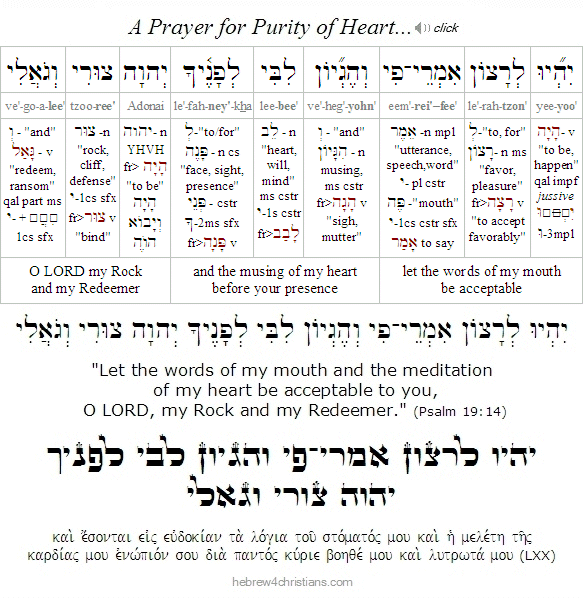 |
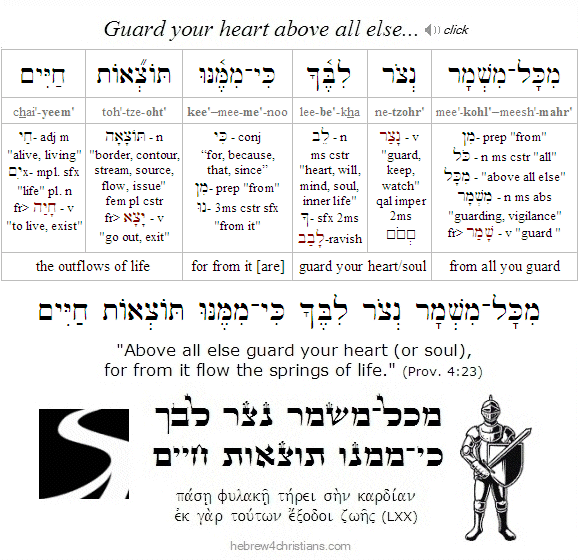 |
The Grave of Jacob...

01.10.20 (Tevet 13, 5780) In our Torah for this week (i.e., parashat Vayechi), Jacob said: "I am about to die; in my grave that I hewed out for myself (בּקִבְרִי אֲשֶׁר כָּרִיתִי לִי)... there you shall bury me" (Gen. 50:5). Note that though Abraham had purchased the Cave of Machpelah (מְעָרַת הַמַּכְפֵּלָה) as a family burial site, Jacob personally dug his own grave there so it would serve as a reminder of the day of his death. In this way Jacob regarded himself dead to this world yet retained hope in the world to come (Heb. 11:10). As Moses later wrote, "Teach us to number our days that we may get a heart of wisdom" (Psalm 90:12).
לִמְנוֹת יָמֵינוּ כֵּן הוֹדַע
וְנָבִא לְבַב חָכְמָה
leem·noht · ya·mei'·noo · kein · ho·da'
ve·na·vee · le·vav · chokh·mah

"Teach us to number our days aright
that we may get a heart of wisdom."
(Psalm 90:12)
Hebrew Study Card


Moses prayed to God: "teach us to number our days," that is, help us understand how to make our days count for eternity, to have a weight of glory that will shine in the world to come... The sages say on the day of death, one considers one's life as if it had been a single day... Life goes by so quickly, and we never know when our personal Rosh Hashanah will come (Psalm 102:11; 103:15-16). "No one knows the day or hour..." That's why it is so vital to be healed and to turn to God while there is still time. So turn to him today and bacharta ba'chayim – "choose life!" "For this commandment (of turning to God in teshuvah) is not hidden from you, and it is not far away. It is not in heaven... nor across the sea.... Rather, the matter is very near you - in your mouth and your heart - to do it" (Deut. 30:11-14).
Fires of Sanctification...

01.09.20 (Tevet 12, 5780) Though our promised healing assuredly will come to us, it remains the prerogative of God to allow trials in our lives for our ultimate good. Faith is the key here: Steadfastly affirm your healing even in the midst of your anguish, because your suffering is a test designed to teach you to trust God and to receive the blessing apart from any empirical evidence (2 Cor. 4:18). As the Torah declares of our father Abraham: וְהֶאֱמִן בַּיהוָה וַיַּחְשְׁבֶהָ לּוֹ צְדָקָה -- "And he believed in the LORD, and He counted it to him for righteousness" (Gen. 15:6); and also of Job's faith in the midst of his agonizing struggle: הֵן יִקְטְלֵנִי לוֹ אֲיַחֵל -- "Though he slay me, I will hope in him" (Job 13:15). Sometimes all we can do is cry out to the LORD for deliverance... Our heart's cry does not question God's goodness to us, though we may silently wonder about the extent to which affliction may be used to mend our hearts. As C.S. Lewis once said, "We are not necessarily doubting that God will do the best for us; we are wondering how painful the best will turn out to be" (Letters of C.S. Lewis, 1964). There is a trust issue in suffering, and an intimacy that comes through its fires. As Kierkegaard reminds us, "It is one thing to conquer in the hardship, to overcome the hardship as one overcomes an enemy, while continuing in the idea that the hardship is one's enemy; but it is more than conquering to believe that the hardship is one's friend, that it is not the opposition but the road, is not what obstructs but what develops, is not what disheartens but ennobles" (Four Upbuilding Discourses, 1844).
The difficulty of intense personal suffering is deeply existential: how do you keep hope in the midst of this tension? "Lord I believe; help my unbelief" (Mark 9:24). How do you affirm that your heavenly Father will heal you but at the present hour you must continue to endure suffering? Do you then devise a "soul-building theodicy" to explain your struggle – providing a narrative to answer the "why" of your suffering -- or do you attempt to sanctify suffering as a means of healing others by the grace of the Messiah (Col. 1:24)? When Yeshua victoriously proclaimed, "It is finished" just before he died on the cross, he foreknew that his followers would experience a "purging process," a "refining fire," and time on the "potter's wheel" to perfect their sanctification. At the cross of Yeshua death itself was overcome – and all that it implies – and yet it is nevertheless true that we will suffer and die ourselves and that death persists an enemy (see 1 Cor. 15:26). While we celebrate the reality of the final redemption, the "instrumentality of our sanctification" needs to be willingly accepted and endured. I say "endured" here because I don't think we will ever have a complete answer to the question of "why" we undergo the various tests we face in this life. Our disposition in the midst of this ambiguity, in the midst of seemingly unanswered prayers, is where our faith is disclosed: will we despair of all temporal hope or not? Will we console ourselves with the vision of a future without tears and loss - a heaven prepared for us -- or will we resist the present darkness and seek to find deliverance in this hour? Do we trust God with our pain and submit to his will, or will we "die" inside – losing hope and despairing of all remedy?
As King David once wrote, "At an acceptable time, O God, in the abundance of your steadfast love answer me in your saving faithfulness. Deliver me from sinking in the mire; let me be delivered from my enemies and from the deep waters. Let not the flood sweep over me, or the deep swallow me up, or the pit close its mouth over me. Answer me, O LORD, for your compassion is life; in the abundance of your mercies turn to me" (Psalm 69:13-16).
עֲנֵנִי יְהוָה כִּי־טוֹב חַסְדֶּךָ
כְּרב רַחֲמֶיךָ פְּנֵה אֵלָי
a·nei'·nee · Adonai · kee-tohv · chas·de'·kha
ke·rohv · ra·cha·me'·kha · pe·neh · e·lai

"Answer me, O LORD, for your compassion is life;
in the abundance of your mercies turn to me."
(Psalm 69:16)


"But You, O GOD my Lord, do Thou for me for your own Name's sake; because your steadfast love is good, deliver me" (Psalm 109:21). "Do thou for me" is the confession that God alone has the power to help. Asking God to bring glory to His own Name -- to honor and magnify His Name -- is the theme of all true intercession.
Suffering has a way of focusing the heart and mind, reminding us that "today is the tomorrow of yesterday." Life is short, and our need is great to turn to the LORD and take hold His promises. We take comfort that God is for us the God of salvation: "Blessed be the Lord, who daily bears us up; God is for us our salvation. Selah. Our God is a God of salvation (יְשׁוּעָה), and to GOD, the Lord, belong deliverances from death" (Psalm 68:19-20).
Our Daily Deliverance...

01.09.20 (Tevet 12, 5780) Just as we ask God for daily bread (לֶחֶם חֻקֵּנוּ), so we ask him for our daily deliverance: "Lead us not into temptation, but deliver us from evil" (Matt 6:13). Note that the term translated "evil" in many translations ("deliver us from evil") is a substantive rather than an adjective: τοῦ πονηροῦ, the evil one... "Give us this day our daily deliverance from the evil one...." Our daily bread and our daily deliverance are connected with our decision to "choose life" (בַּחַרְתָּ בַּחַיִּים) -- and to always choose life -- even in moments we find difficult, distressing, and even when we might wish that we were no longer living... Choosing life means refusing to escape reality by evading the significance of our choices; it means finding the will to regard life as worthy; it implies that we will eat our bread in trust that the Lord is at work even in the darkest of hours (Passover occurred at midnight)... Choosing life means refusing to eat the fruit of death and to seek Yeshua, the Tree of Life. We live one day at a time; we only have today. We are given daily bread for this hour of our need. Today is the day of your deliverance - if you are willing to walk in it. Therefore, the Spirit of the Living God cries out, "Choose life and live!"
 |
"Do not be grieved [even over yourself], for the joy of the LORD (חֶדְוַת יְהוָה) is your strength" (Neh. 8:10). Affirming the love, faithfulness, compassion, and salvation of God is a powerful way to defeat the enemy of our souls, who regularly entices us to despair. King David constantly asked God to help him in his spiritual struggles. "Though I walk in the midst of trouble (בְּקֶרֶב צָרָה), you will revive my life; you stretch out your hand against the wrath of my enemies, and your right hand delivers me" (Psalm 138:7). "For the enemy has pursued my soul; he has crushed my life to the ground; he has made me sit in darkness like those long dead. Therefore my spirit faints within me; my heart within me is appalled" (Psalm 143:2-3). Despite whatever struggle we may face, "the LORD is near to the brokenhearted and saves the crushed in spirit (Psalm 34:18). Indeed, the Lord God is far greater than your heart's sin and will one day entirely deliver you of sin's effect and influence. Amen.
The Law of Faith...

01.09.20 (Tevet 12, 5780) When asked how many commandments are in the Torah, most Jewish people will answer 613, based on Jewish tradition (the number 613 is sometimes called "taryag" (תריג), an abbreviation for the letters Tav (400) + Resh (200) + Yod (10) + Gimmel (3) = 613). Despite several attempts made over the centuries, however, there has never been a definitive list of these commandments, and of those who tried to compile such, no two agree... Some say the number 613 comes from a fanciful midrash that teaches that since there are 365 days in a year (corresponding to the 365 negative commandments) and 248 "parts" of the body (corresponding to the positive commandments), each day we should use our body to serve God. Regardless of the exact count, however, the Talmud followed the Apostle Paul by understanding all the Torah's commandments to be derived from the Ten Commandments given at Sinai, the most basic of which is the very First Commandment, namely, "I AM the LORD your God (אָנכִי יְהוָה אֱלהֶיךָ) who brought you out of Egypt, out of the house of slavery" (Exod. 20:2).
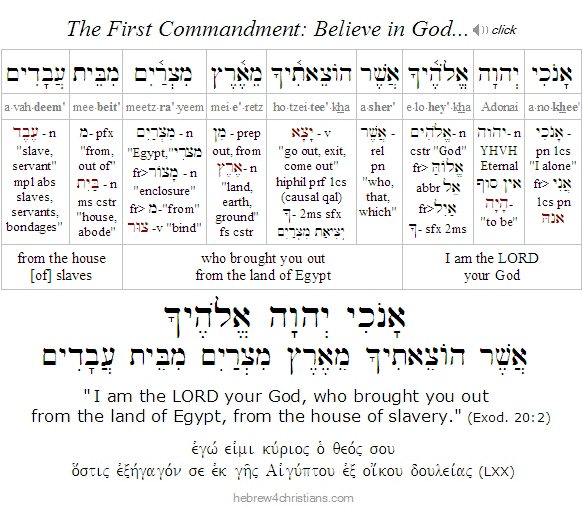 |
This foundational commandment to trust in the LORD as your God was later restated by the prophet Habbakuk as: וְצַדִּיק בֶּאֱמוּנָתוֹ יִחְיֶה / "The righteous person will live by faith in God" (Hab. 2:4; Gal. 3:11; Heb. 10:38):
Note: I stated that the sages of the Talmud "followed" the Apostle Paul's line of thinking on this subject since Paul wrote centuries before the Talmud was compiled... And incidentally, the New Covenant Scriptures are not without the imperatives of "Torah," of course, with some people counting over 1,000 distinct commandments in its pages...
His Perfected Strength...

01.08.20 (Tevet 11, 5780) "Have you not known? Have you not heard? The Eternal One, the LORD, is the Creator of the ends of the earth (בּוֹרֵא קְצוֹת הָאָרֶץ). He does not faint nor grow weary; his understanding is unsearchable. He gives power to the faint, and to him who has no might he increases strength" (Isa. 40:28-29). Human reason has no objection that God can impart strength, but it objects that strength is found in those who are broken and weary – that is, to those mortally wounded in the battle against evil. The principle of the self-life, the ego, religious observance, "doing the law," etc., is a spiritual dead-end. The word is this: God gives strength to the weary, to the faint, to those who are without potency or power. But this means that we first must be emptied, broken, and stripped of our self-sufficiency before the strength of God is manifest in us: "My power is made perfect (τελειοῦται) in weakness" (2 Cor. 12:9).
God's way is first to break us, to make us weaker and weaker, so that he can then fill us with the miraculous divine nature. Like all sacrifices that were brought to the altar, we must pass through death to life by means of our union with the Messiah at the cross... It is only after the cross that it may be said, "It is no longer 'I' who lives; now it is Messiah who lives His life in me" (Gal. 2:20). There is indeed strength, power, and victory – but such comes after the cross, after we reckon carnal energy as useless. "Not by might, nor by power, but by My Spirit, says Adonai Tzeva'ot" (Zech 4:6).
נתֵן לַיָּעֵף כּחַ
וּלְאֵין אוֹנִים עָצְמָה יַרְבֶּה
no·tein · la·ya·eif · ko'·ach
oo·le·ein · o·neem · otz·mah · yar·beh

"He gives power to the faint,
and to him who has no might he increases strength"
(Isa. 40:29)

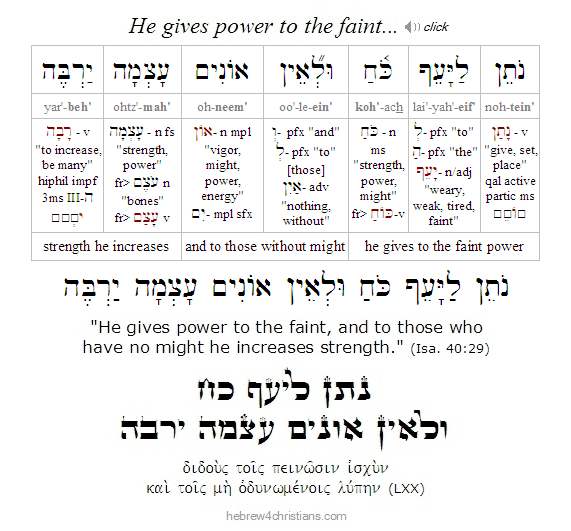
Where we read, "Messiah who loved me and gave himself for me" (Gal. 2:20), we emphasize the object of God's redeeming love; we stress that this word is being spoken to "me," and that Messiah's love is poured out "for me." But how can we justify doing so, in light of the innumerable souls that have been brought forth in the world? The Mishnah asks, "Why was man created alone?" and answers so that each person must say the world was created for me. "Whoever destroys a soul, it is considered as if he destroyed an entire world; and whoever saves a soul, it is considered as if he saved an entire world..."
Irrational Humanism...

01.08.20 (Tevet 11, 5780) Skeptics often object to the existence of God because there appears to be so much gratuitous evil in the universe. They maintain that the three propositions: 1) God is all-loving; 2) God is all-powerful; and 3) evil exists; are semantically incompatible and therefore logically inconsistent. You can choose any two of the three propositions to believe, they pontificate, though you cannot consistently believe all three without becoming irrational. To avoid a lot of boring discussion about the unsoundness of this old argument, suffice it to say that it has long been shown that there is no logical contradiction by affirming all three propositions, and therefore the so-called "problem of evil" is not a deal-breaker for a rational person of faith. Because of this, the skeptic will then try a different approach by saying that while the existence of evil may not prove there is no Supreme Being, it nevertheless makes it "improbable" that such a being exists, and therefore the rational person will not believe in God as all-loving, all-powerful, etc. However, I want to point to a linguistic dilemma the skeptic encounters by arguing this way, since it is impossible to define "evil," "good," or to make the value claim that one state of affairs is "better" than another state of affairs without appealing to transcendental standards of goodness and justice. This fact demonstrates that many skeptics are parasites and abusers of religious language, pilfering metaphysical assumptions without providing any justification of their own. They can only complain about God and evil by assuming ideas that are derive from theological concepts of truth, justice, goodness, and so on. The skeptic needs to be told to back up and clarify their terms. They should not be allowed to smuggle in appeals to transcendental values in their attempt to say there are no transcendent values. After all, it is logically impossible to prove something to be the case from premises that are devoid of substance.
Have you ever heard someone utter the supposed axiom, "Everything is relative"? This is an example of sloppy and even absurd thinking, since if everything is relative, then the statement "everything is relative" is relative, which of course is a contradiction in terms. Did you know that Albert Einstein's famous "Theory of Relativity" was at first going to be called the "Theory of Invariance"? That's because the theory assumes the constancy of the speed of light to interpret states of energy/matter based on unchanging "laws" of physics (i.e., the measured velocity of light is the same (invariant) regardless of any relative motion). Don't be fooled by slick talkers who make a pretense of knowledge. If everything were relative, then nothing could be known, including the idea that anything is relative to another thing.
 |
All-Pervasive Radiance...

01.08.20 (Tevet 11, 5780) Many people go through the day oblivious to the miracle of existence... If you carefully consider even the most common of things, however, such as a piece of bread, for instance, you will soon realize that it represents a series of causes leading back to transcendental power, and finally, to the Creator and Sustainer of all things. A piece of bread comes from flour, which is milled from seed grown in topsoil through an amazing synthesis of light, air, minerals, and water. However, photosynthesis is a secondary effect of more fundamental forces such as the energy of the sun, the elements of earth, water, and atmosphere, the pull of gravity, and the marvelous inner "form" or intelligence of the seed itself... The "germination" of a seed is really quite miraculous, replicating the body and energy of a plant in miniature form ("this acorn I hold in my hand contains a thousand oak trees"). My point here is simple. Life is full of mysteries, though we can suppress consciousness of its wonders by means of ingratitude for our existence. God is never silent, however, since "The heavens tell the story of the glory of God, and the sky above proclaims the work of his hands; Day after day it speaks out; night after night it reveals His greatness" (Psalm 19:1-2).
הַשָּׁמַיִם מְסַפְּרִים כְּבוֹד־אֵל
וּמַעֲשֵׂה יָדָיו מַגִּיד הָרָקִיעַ
יוֹם לְיוֹם יַבִּיעַ אמֶר
וְלַיְלָה לְּלַיְלָה יְחַוֶּה־דָּעַת
ha-sha·ma'·yeem · me·sa·pe·reem · ke·vohd · el
oo·ma·a·seh · ya·dav · ma·geed · ha·ra·kee'·a
yohm · le·yhom · ya·bee'·a · o'·mer,
ve·lai'·la · le·lai'·la · ye·cha·veh · da'·at

"The heavens declare the glory of God,
and the sky above proclaims the work of His hands.
Day to day pours out speech;
and night to night reveals his knowledge."
(Psalm 19:1-2)
Download Study Card

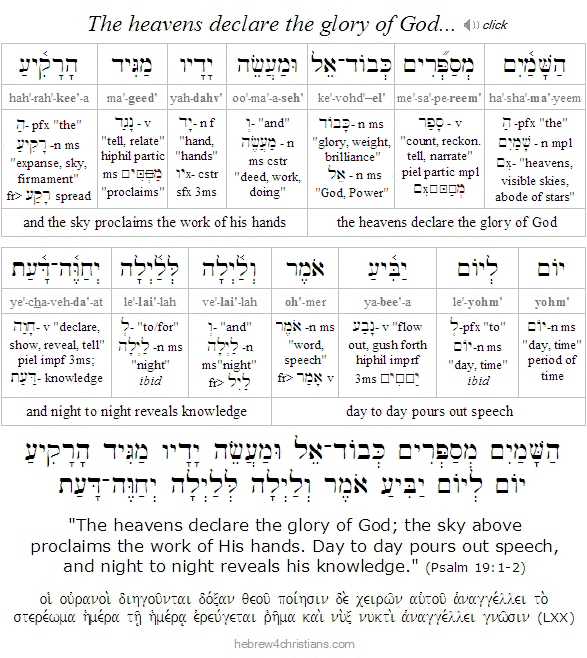
A sense of wonder and mystery is central to faith, since "the last step of human reason is the confession that there are an infinite number of things that are beyond it" (Blaise Pascal). Just as human reason and logical principles ultimately point beyond itself, so faith points beyond itself to the Lord as the Source and the End of all mystery, beauty, goodness, love, and truth... The idea of mystery is not a confession of ignorance as much as it is an awareness of the inherent sanctity of life and of the ultimate triumph of love.... Faith believes that everything will ultimately be healed by God's overarching will, through which the universe is sustained and made intelligible to us. Therefore, Da lifnei mi attah omed: "Know before whom you stand!" We are constantly surrounded by an ongoing procession of the glory of God (Isa. 6:3). May the Lord our God help us open our eyes to see...
Substance of Hope...
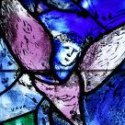
01.08.20 (Tevet 11, 5780) It is written that faith is the "substance" (ὑπόστασις) of hope, the conviction of unseen blessing, and "without faith it is impossible to please God, for whoever would draw near to God must believe that he exists and that he rewards those who seek him" (Heb. 11:6). Life in this world is likened to a school wherein we learn how great God is and how much we are loved, valued, and esteemed precious in His eyes. You must believe that God is your healer, that he will make the crooked things straight, and that you are his beloved child... Faith sees the end in God's unfailing love: The LORD God of Israel says: "And I will lead the blind in a way that they do not know, in paths that they have not known I will guide them. I will turn the darkness before them into light, the rough places into level ground. These are the things I do, and I do not forsake them" (Isa. 42:16).
וְהוֹלַכְתִּי עִוְרִים בְּדֶרֶךְ לא יָדָעוּ
בִּנְתִיבוֹת לא־יָדְעוּ אַדְרִיכֵם
אָשִׂים מַחְשָׁךְ לִפְנֵיהֶם לָאוֹר
וּמַעֲקַשִּׁים לְמִישׁוֹר
אֵלֶּה הַדְּבָרִים עֲשִׂיתִם וְלא עֲזַבְתִּים
ve·ho·lakh·tee · eev·reem · be·de'·rekh · lo · ya·da'·oo
been·tee·voht · lo · ya·doo · ad·ree·khem
a·seem · mach·shakh · leef·ne·hem · la·ohr
oo·ma·a'·ka·sheem · le·mee·shor
e'·lah · ha·de·va·reem · a·see·teem · ve·lo · a·zav·teem

"And I will lead the blind in a way that they do not know,
in paths that they have not known I will guide them.
I will make dark places before them turn to light,
and perverse things into uprightness.
These things I will do, and I will not forsake them."
(Isa. 42:16)

Hebrew Study Card
Faith is its own reward, since believing the truth brings you into alignment with reality. Teshuvah is the response to God's love... Faith confesses that God is your Ultimate Concern, your Supreme Good, the goal and end of all that matters to your heart. Your faith is "more precious than gold," because its heart is your highest blessing, namely, the Divine Presence, the beatific reality, and heaven itself.... God tests our faith to draw our attention to Him (Psalm 119:71); to teach us endurance (Rom. 5:3-5; James 1:4); to upbuild our soul (Jude 1:20); to purify our affections (1 Pet. 1:7), and to glorify God's Name (kiddush HaShem). May God help each of us hold the substance of real hope within our hearts. Amen.
Quieting of the Heart...

01.07.20 (Tevet 10, 5780) It is difficult to let go and be still within our hearts -- to encounter quietness, emptiness, and silence... which is to say that it is difficult to trust. Silence often reveals the clamor of our suppressed anxieties and therefore we busy ourselves with distractions to avoid feeling the inner pain of our lives. God seeks to fill our emptiness and bring peace to our soul, but we must relinquish control and open our heart to his direction. The LORD wants to give us shalom, but if we are afraid to trust his care, we will exhaust ourselves as we attempt to live in exile of his comfort and compassion....
Perhaps we are reluctant to be alone because we are afraid of ourselves - afraid to "listen in" on our thoughts, afraid of the mixed up voices within us, the inner conflicts, the ambiguities, afraid of our sadness or anger, frightened to see our own weakness, insignificance, and the eventuality of our death... Despite the anxiety we may feel when we are alone, it is important to realize that solitude is essential for us to grow and to draw close to God. How else can we face the truth about our lives and thereby find God's grace and blessing? "I never knew you" - the most dreadful words to the heart of faith - but as we learn to be alone and honestly seek God, we experience deep communion and find shalom. Here, in our vulnerability and powerlessness, we learn that we cannot control our own existence and therefore we must trust in God. Here we do not seek to escape from ourselves but to become the self God calls to life in his salvation.
We can attune ourselves to hear God's "still, small voice" (קוֹל דְּמָמָה דַקָּה) when we are quieted, in solitude, not when we are surrounded by the busyness of the crowd and its cheers or its murmurings. For thus said the Lord GOD, "In returning and rest you shall be saved (בְּשׁוּבָה וָנַחַת תִּוָּשֵׁעוּן); in quietness and in trust (בּהַשְׁקֵט וּבְבִטְחָה תִּהְיֶה גְּבוּרַתְכֶם) shall be your strength" (Isa. 30:15). "God is the friend of silence. See how nature - trees, flowers, grass- grows in silence; see the stars, the moon and the sun, how they move in silence... " Therefore God invites us to "be still and know" his heart and to trust in his care for our lives:
הַרְפּוּ וּדְעוּ כִּי־אָנכִי אֱלהִים
אָרוּם בַּגּוֹיִם אָרוּם בָּאָרֶץ
har·poo · oo·de·oo · kee–a·no·khee · e·lo·heem
a·room · ba·go·yeem · a·room · ba·a'·retz

"Be still and know that I am God,
I will be exalted among the nations, I will be exalted in the earth."
(Psalm 46:10)
Hebrew Study Card


"Be still and know (הַרְפּוּ וּדְעוּ) that I am God, I will be exalted among the nations, I will be exalted in the earth." Note that the Hebrew verb translated "be still" (i.e., rapha: רָפָה) means to let go, to stop striving, to relinquish control, and to surrender your life and indeed the fate of the world to the care of God... "Being still" means finding serenity and inner peace by completely trusting in God's providential plans for good... As it says in our Torah: hityatzevu u'reu et yeshuat Adonai (הִתְיַצְבוּ וּרְאוּ אֶת־יְשׁוּעַת יְהוָה): "Stand firm and see the salvation (i.e., Yeshua) of God" (Exod. 14:13). As Pascal said, "All men's miseries derive from not being able to sit quietly in a room alone." This is because many people cannot live with themselves and seek escape; they therefore are compelled to seek release through the buzz and noise of what lies outside of themselves.... God is not the author of confusion: We experience the Spirit of God by receiving heavenly peace: "Stop your striving and know that I am God."
One of the Ten Commandments is to rest in the LORD your God (Exod. 20:8-11), which is a picture of the "set table" the LORD provides for us as his children. The deepest principle of Sabbath is that we are set free from our striving and can open our hearts to God's gracious love... "Salvation is of the LORD," and we rest in the what the Lord has done for us. "If you call the Sabbath a delight; if you honor it, then you shall take delight in the LORD, and I will make you ride on the heights of the earth; I will feed you with the heritage of Jacob your father, for the mouth of the LORD has spoken" (Isa. 58:13-14).
בְּשׁוּבָה וָנַחַת תִּוָּשֵׁעוּן
בְּהַשְׁקֵט וּבְבִטְחָה תִּהְיֶה גְּבוּרַתְכֶם
be·shoo·vah · va·na'·chat · tee·va·shei·oon
be·hash·ket · oov·veet·chah · te·he·yeh · ge·voo·raht·khem

"In returning and rest you shall be saved;
in quietness and in trust shall be your strength."
(Isa. 30:15)

Trusting God's Heart for you...

01.07.20 (Tevet 10, 5780) Some people want to say that God is love but then add the condition that such love is ours only if we observe God's commandments (whether these are commandments of behavior or belief). However if we regard God's love as conditional - based on something we do - then it is no longer God's love that is of utmost concern but ourselves - our devotion, our morality, our "religion," and so on. Moreover, if you attempt to earn God's approval by doing certain things (and not doing others), you are back "under the law," striving to attain some measure of self-justification: you will only be as secure as your own best efforts -- a "self-improvement" project that will exhaust you in the end.
The good news, on the other hand, is that you are truly loved by God -- despite your many flaws and your sins -- just as the "prodigal son" was loved by his father and was accepted despite his many misdeeds (Luke 15:11-32). Likewise, the incarnation of Yeshua means that God "runs to meet and embrace you," regardless of whatever happened in your life that made you run away from home. And whatever else it may be, sin is the separation from God's love, but Yeshua made the decision to die for your sins before you were born. Your sin cannot overrule God's surpassing and personal love for your soul, since God gave up his very life for you to find life. God's love is for you, friend, whether you believe it or not. Having faith in God's love puts you in alignment with Reality, however, healing the inner wound of your lost condition, giving you peace, and clothing you with the robe of God's own righteousness.
The Hebrew word for "life" is chayim (חַיִּים), a plural noun that contains two consecutive letter yods (יי) that picture two "hands held together" (the Hebrew word yad [יָד] means "hand"), or the union of our spirit with God's Spirit. The word itself reveals that there is no life apart from union with God, who extends his hand to you and says, "Live in me" (John 15:4). We live in him by faith, receiving our daily bread as his flesh and our drink as his blood (John 6:53). Yeshua is the Source of all life, and we find nourishment, strength, and fullness of joy in his life. The Lord is our light and our salvation, the Mediator of divine life (Psalm 27:1; John 1:4). As it is written, "Whoever has the Son has the life; but whoever does not have the Son of God does not have the life" (1 John 5:12).
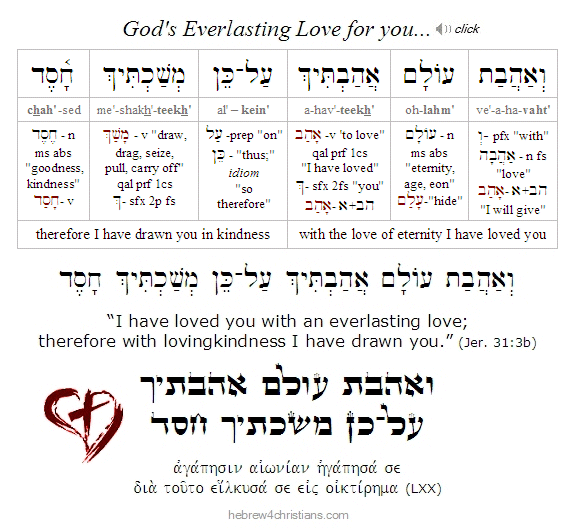 |
God speaks to his redeemed child: "I have loved you with an everlasting love; therefore with lovingkindness I have drawn you" (Jer. 31:3). Note that the word translated "I have drawn you" (i.e., מְשַׁכְתִּיךְ) comes from the Hebrew word mashakh (מָשַׁךְ), meaning to "seize" or "drag away" (the ancient Greek translation used the verb helko (ἕλκω) to express the same idea). As Yeshua said, "No one is able to come to me unless he is "dragged away" (ἑλκύσῃ, same word) by the Father" (John 6:44). God's chesed seizes us, takes us captive, and leads us to the Savior... Spiritual rebirth is a divine act of creation, "not of blood nor of the will of the flesh nor of the will of man, but of God" (John 1:13). God is always preeminent.
Postscript: You might ask, "Is there no need for repentance?" Indeed there is, though you must know what the word "repentance" means and what is its ultimate goal... The word teshuvah means returning to God... It is not the same word used to express remorse for sin, etc. There is a place for remorse, contrition, godly sorrow for sin, but these come after you learn of the love of God, after you encounter the truth... There is repentance from sin, though that too is a gift from God's heart to you (John 6:44). Confession means saying the same thing about sin that God says -- a break in the heart of love.
"For the law of the Spirit of life (תּוֹרַת רוּחַ הַחַיִּים) has set you free in Yeshua the Messiah from the law of sin and death (תּוֹרַת הַחֵטְא וְהַמָּוֶת). For God has done what the law, weakened by the flesh, could not do. By sending his own Son in the likeness of sinful flesh and for sin, he condemned sin in the flesh, in order that the righteous requirement of the law might be fulfilled in us, who walk not according to the flesh but according to the Spirit" (Rom. 8:2-4). As I've said before, nothing is required of the "old nature" other than for it to be reckoned dead (Col. 3:3; Rom. 6:11; Gal. 2:20). All of the commandments of the New Testament are directed to the new nature, the life of Messiah in you. I daresay I've written more about teshuvah and repentance than most ministries out there, for over the last 20 years now... Be careful not confuse teshuvah with the idea of living for God by means of the Spirit.
Forsaking Wrath...

01.07.20 (Tevet 10, 5780) We must humble ourselves and renounce anger, for the "wrath of man does not work the righteousness of God" (James 1:20). Therefore "let go of anger and forsake outrage, for indignation leads to evil within the heart, and evildoers will be cut off" (Psalm 37:8-9). After all, before the eyes of heaven, who are we to take offense at others? Is not all our self-justified outrage a symptom of pride and arrogance? Despite all our sins and the times we angered Hashem, we still ask, "Bless us, our Father; let your light shine upon us with favor..." And yet when we get slightly upset at a friend we restrain from showing him a shining face? Know the spiritual principle: As we are to others, so we are to ourselves: middah keneged middah ("like for like"); as we judge others, so we put ourselves before the bar of divine judgment, measure for measure... Forgiveness means asking of ourselves what we are asking of God, and the same is true of love. When Yeshua taught us to "forgive us as we forgive," He taught that our forgiveness (of others) is a measure of our own understanding of the forgiveness (of God). Conversely, demanding perfection from others means appealing to God to judge of our lives... Friends, we should focus on the Eternal; we should believe the blessed promise of God; we should anticipate the great Coming Day of ultimate healing - and then our hearts may be quieted. Remember that nothing happens on its own; everything comes from above, and this too will keep you from outrage and bitterness. May God help us...
"If we confess our sins, he is faithful and just to forgive us our sins and to cleanse us from all unrighteousness" (1 John 1:9). Not just this or that particular sin, mind you, but the whole constellation of attitudes, assumptions, and wayward thinking that brought us into exile in the first place. The word confession (ὁμολογία) means bringing yourself naked before the Divine Light to agree with the truth about who you are. Indeed, the verb homologeo (ὁμολογέω) means "saying the same thing" - from ὁμός (same) and λόγος (word). In biblical Hebrew teshuvah (תְשׁוּבָה) means turning back to God by turning away from what makes you lost in unreality and painful exile. God's love for us is the question, and our teshuvah – our turning of the heart toward Him – is the answer. Teshuvah is one of the great gifts God gives each of us – the ability to turn back to Him and seek healing for our brokenness.
Our Very Present Help...
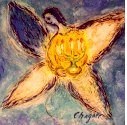
01.06.20 (Tevet 9, 5780) "For the very hairs of your head are all numbered" (Matt. 10:30). Yeshua was not using "poetic exaggeration" here, but instead affirmed that God's wisdom and knowledge is so vast that it pervades and encompasses all things (including things about ourselves we do not see or understand). God's providence descends to the subatomic dust and ascends to the massive orbs and stars that sweep through the heavens. There is no realm – no possible world – nothing above, below, or around you – that is beyond God's sustaining power and will. All that was, is, and ever shall be is forever under God's sovereign authority, and he rules over all things for his glory and good. There is no "chance" or "coincidence" in God's universe; nothing is beyond his reach and purposive design. Therefore we can remain at peace even in the midst of the world's turmoil and storms: God is always here, always working for your ultimate healing and good. God is "your refuge and strength, a very present help in trouble. Therefore we will not fear though the earth gives way, and the mountains be moved into the heart of the sea" (Psalm 46:1-2):
אלֹהִים לָנוּ מַחְסֶה וָעֹז
עֶזְרָה בְצָרוֹת נִמְצָא מְאד
עַל־כֵּן לא־נִירָא בְּהָמִיר אָרֶץ
וּבְמוֹט הָרִים בְּלֵב יַמִּים
e·lo·heem · la'·nu · mach·seh · va·ohz
ez·rah · ve·tza·roht · neem·tza · me·ohd
al-kein · lo nee·ra · be·cha·meer · a'·retz
oo·ve·moht · ha·reem · be·leiv · ya·meem

"God is our refuge and strength,
a very present help in trouble.
Therefore we will not fear though the earth gives way
and the mountains be moved into the heart of the sea.

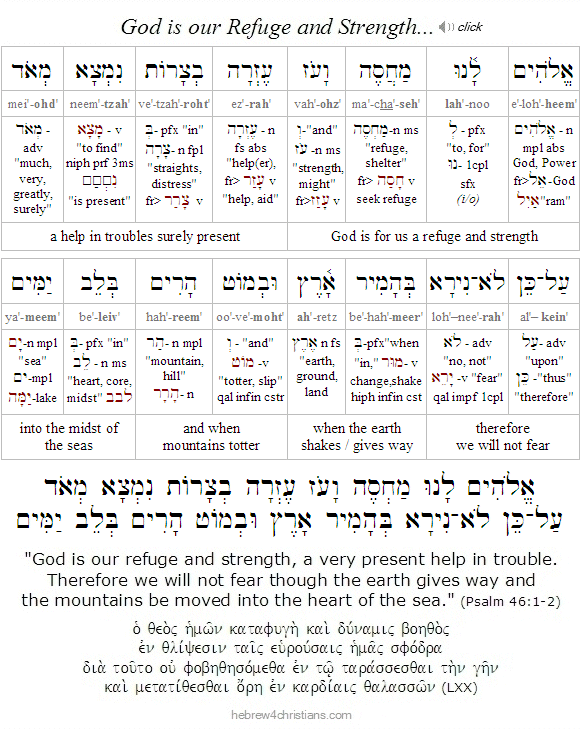
According to many of the Jewish sages, Psalm 46 concerns the "birth pangs" of the Messianic Age and the prophetic war of Gog and Magog (Ezek. 38-39) that will usher in the Kingdom of God during the End of Days. This is hinted at in the opening of the psalm, where it is written, "Of the sons of Korach: according to alamot (עֲלָמוֹת)," i.e., the "hidden things" or "ages" to come. Recall that the sons of Korach were miraculously delivered from the rebellion of Korach in the desert and therefore they foreshadow the community of Israel delivered at the end of the present age. God is our refuge and strength during perilous days - so "hide yourself for a little moment, until the indignation will have passed" (Isa. 26:20).
God is a very present help in times of trouble, so "if from there [i.e., the trouble of the latter days] you shall seek the LORD your God with all your heart, you will find him, if you seek Him with all your heart and with all your soul" (Deut. 4:29-31). The sages say that machseh (refuge) implies being protected by God, while 'oz (strength) implies being empowered by God to withstand afflictions that originate from the hand of man. During the time of tribulation, God will grant both to His people. God is our help during distress, "very available," that is, very much present both in quality (i.e., His full Presence) and in quantity (i.e., He is ever-present, or always present). Fear is not an option for the heart of faith, since God gives providential help during time of our need (Heb. 4:16).
Ultimately any true help comes from the LORD Yeshua, of course, who will deliver Israel from all her enemies at the end of the great tribulation period (i.e., at His second coming). It is interesting that the sages say that the word "very" (i.e., me'od: מְאד) in the phrase, "a very present help" is thought to be an acronym for Messiah, Adam, David (מָשִׁיחַ אָדָם דָוִד) - that is, to the "Messiah, son of man and son of David," who will wield the authority of both the first man as well as God's chosen regent upon the earth...
We will not fear - even though the earth will change due to the mighty wars between the nations - and even if the mountains themselves are moved into the heart of the sea -- a prophetic allusion to the return of Yeshua upon the Mount of Olives at the end of the tribulation (Zech. 14:4). Despite the "rage and foam" of the nations, the LORD will break their godless pride as our Messiah returns with the multitude of His servants to exact vengeance upon the enemies of God (Zech. 14:5). "And the LORD will be king over all the earth. On that day the LORD will be one and his name one" (Zech. 14:9).
 |
Fruit in his Season...
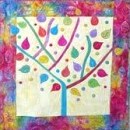
01.06.20 (Tevet 9, 5780) Spiritual fruit does not immediately crop up but requires time and its own season (Psalm 1:3). The process of spiritual growth is mysterious and comes from heaven's creative power, as Yeshua said: "The Kingdom of God (מַלְכוּת הָאֱלהִים) is like someone who spreads seed on the ground. He goes to sleep and gets up, night and day, and the seed sprouts and grows, though he does not know how. By itself (αὐτομάτη, i.e., "automatically") the soil produces a crop, first the stalk, then the head, then the full grain in the head. And when the grain is ripe, he comes in with his sickle because the harvest has come" (Mark 4:26-29). The wonder of faith understands the "ordinary" process of the growth of a seed as genuinely miraculous... With God all things are possible - and that includes the miracle of our newness of life. It is the fruit of the Spirit, after all, and that means that its source and end is found in God's love...
Thank God it is a process, that we are not perfected in a day, otherwise we might die in despair over ourselves... As it is, God helps us endure ourselves, reminding us to lay down and die so that the power hidden in the "seed" can be released (John 12:24).
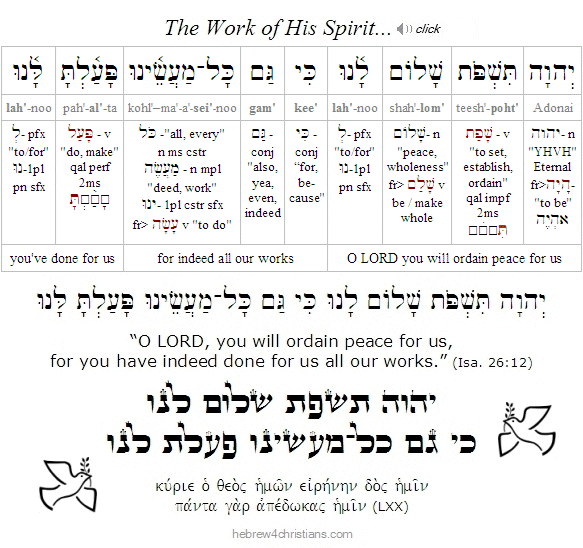 |
Seeking Things Above...
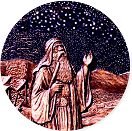
01.06.20 (Tevet 9, 5780) Then he said to them all, "If anyone wants to become my follower, he must deny himself, take up his cross daily, and follow me. For whoever wants to save his life will lose it, but whoever loses his life for my sake will save it" (Luke 9:23-24). Paradoxically only those willing to give up their lives will take up their cross, but the prospect remains an offense to those who seek to justify themselves. We must let go, say goodbye, and turn away from the allure of this world. The cross of Messiah crucifies your relationship to this world with its ignorance and vanities (Gal. 6:14). Through the cross you die to this world and its idolatry and cross over to a new realm of existence altogether (Gal. 2:20; Col. 3:1-4). The separation here is utmost and radical: the cross marks the beginning of life in the spirit.
"If then you have been raised with Messiah, seek the things that are above (τὰ ἄνω ζητεῖτε), where the Messiah is seated at the right hand of God (לִימִין אֱלהִים). Focus your thoughts on the things above, not on things here on earth. For you have died, and your life has been hidden with Messiah in God. Then when the Messiah, who is your life, appears, you too will appear with him in glory" (Col. 3:1-4).
All of this turns on our faith... If we are spiritually identified with Yeshua, we are "dead" to this age (olam hazeh), and therefore we are awakened to a realm that transcends the appeals of carnal flesh (olam habah). We no longer live chayei sha'ah (חַיֵּי שָׁעָה, "fleeting life") but chayei olam (חַיֵּי עוֹלָם, "eternal life"). The arorist verb "you have died" indicates "you have died once for all," that is, this is a condition granted by the power and agency of God on your behalf. You don't "try to die" to the flesh; you accept what God has done by killing its power over you through Yeshua... You are dead to this world; you are dead to sin's power; you are no longer enslaved to the deception of the worldly matrix, etc. Now you are made alive to an entirely greater and more powerful order and dimension of reality, namely, the spiritual reality that is not disclosed to the vanity of this age. Therefore we are to consciously focus our thoughts (φρονέω) on the hidden reality of God rather than on the temporal world that is passing away: "For we are looking not to the things that are seen but to the things that are unseen. For the things that are seen are transient (i.e., "just for a season," καιρός), but the things that are unseen are eternal" (2 Cor. 4:18).
When faith in God begins to affect an individual, his entire existence is transformed. His obsession with immediate pleasures and pains dies away. Instead his attention is increasingly focused on God. He comes to conceive God in his heart not just at a particular moment, but at every moment. He desires to share the infinity of God, and so feels himself confined within his present existence. He is like a bird in a cage, dreaming of flying free; he is like a fish on dry land, dreaming of swimming in a pool. He is acutely aware of the contrast between God's power and his own frailty. Yet even in his confinement, he feels joy in the knowledge that soon he will be free" (Kierkegaard: Journals)
We share the (in)visibility of the Messiah in this age... Since He is presently hidden from view, "the world knoweth us not, because it knew him not" (1 John 3:1); on the other hand, when He is revealed from heaven, so we will appear with him in glory... Therefore "being dead" is an inversely reciprocal relationship: being dead to this world is to be alive in the other world, and vice-versa.... We have "hidden life" in the Messiah, as it is written: "your life has been hidden (i.e., κρύπτω, "concealed," "disguised") with the Messiah in God." By faith you are made dead to one order of reality so that you would be made alive to another order of reality, to the reality of God that transcends the shadows and decay of this world. Your life has been hidden - like a "hidden treasure" - with the Messiah, who holds its store for you and will reveal its glory in the coming age. Because Yeshua knows you by name, calls you to follow Him, and is your Sin-Bearer, Priest, Advocate, and Savior before the throne of God, your life is indeed "hidden with Him," and you are made secure through His all-powerful providential care... Praise His Name forever.
Salvation is forever a matter of life and death. We esteem earthly doctors because they are healers of the body, but how much more do people need true healers of the soul? "Be not deceived" about your own hope for eternity; "God is not mocked" (μυκτηρίζω). He knows your inner motivations with perfect clarity (Gal. 6:7; Heb. 4:12). To "serve" God in the truth means being willing to face ongoing self-examination, to own up to the truth about yourself, to be real, to be honest. We are here to share the message of God's love and to help bring others to eternal life. Yeshua's fiercest words of condemnation were reserved for those who played games with "religion" - for those who forgot that people were literally dying without God's love... May God help us remember what is closest to His heart, friends...
 |
The Shiloh Prophecy...

[ The following is related to our Torah for this week, Parashat Vayechi... ]
01.06.20 (Tevet 9, 5780) When the time came for Jacob (i.e., Israel) to die, he called all his sons together to bless them (Gen. 49:1-28). According to midrash, Jacob wanted to tell his sons about the "End of Days" (אַחֲרִית הַיָּמִים) when the Messiah would come, but was prevented by the Holy Spirit. According to Rashi, God prevented Jacob because He does not want anyone to know the "day or the hour" when the great King of Israel would appear. Jacob did, however, foretell that from the tribe of Judah (יְהוּדָה) would come the Messiah: "The scepter (שֵׁבֶט) will not depart from Judah, nor the ruler's staff from between his feet, until Shiloh (שִׁילוֹ) comes, and to him shall be the obedience (יקְהָה) of the people" (Gen. 49:10). Interestingly, the name "Judah" (יְהוּדָה) is spelled using all the letters of the Name YHVH (יהוה), with the addition of the letter Dalet (ד). Just as the tribe of Judah later was directly stationed in the front of the Mishkan (Tabernacle) in the camp formation in the wilderness, so the Holy Temple (i.e., Moriah) would later become part of Judah's territory in the promised land. Likewise, Yeshua Himself - a descendant of King David - was crucified and resurrected in the land of Judah. Truly the promised "Seed of Judah" represents the "doorway of the LORD" and is rightly named "the One whom his brethren would praise."
Like most prophecies in Scripture, the prophecy of Shiloh has a "dual aspect" or "double fulfillment." Shiloh, or the "King of the Jews" (a synonym for the Messiah, called "Christ" by Gentile Christendom) had indeed come "before the scepter departed from Judah," but he went unrecognized since he came to fulfill the role of the Suffering Servant (Mashiach ben Yosef). The second part of the prophecy, "and to him shall be the obedience of the people," is yet to be fulfilled. It will become a visible reality only after his Second Coming, at the end of olam ha-zeh (this present age), when Yeshua comes to judge the nations (the "sheep and the goats") and establish the Kingdom of God from David's throne in Jerusalem.
For more on this topic, see: "The Promise of Shiloh: Further thoughts on Vayechi."
Our Good Shepherd (הרועה הטוב שלנו)

01.06.20 (Tevet 9, 5780) Where it says in the Scriptures, "Surely goodness and merciful love (אַךְ טוֹב וָחֶסֶד) shall follow me all the days of my life" (i.e., Psalm 23:6), we note that the Hebrew verb translated "shall follow me" (i.e., יִרְדְּפוּנִי) comes from a root (i.e., radaf: רָדַף) that means "to pursue," as a hunter chases after his prey. David was sure that God's lovingkindness would "hound" him as he made his way through this world - even in the dark places, even in "the valley of the shadow of death" (בְּגֵיא צַלְמָוֶת) - where God's rod and staff would comfort him and direct his way (Psalm 23:4).
אַךְ טוֹב וָחֶסֶד יִרְדְּפוּנִי כָּל־יְמֵי חַיָּי
וְשַׁבְתִּי בְּבֵית־יְהוָה לְארֶךְ יָמִים
akh · tohv · va·che'·sed · yeer·de·foo'·nee · kohl-ye·mei · chai·yai
ve·shav·tee · be·veit · Adonai · le·oh'·rekh · ya·meem

"Surely goodness and merciful love shall follow me all the days of my life,
and I shall return to the house of the LORD forever."
(Psalm 23:6)

Hebrew Study Card
"Blessed be the Lord, who daily bears us up; God is our salvation (הָאֵל יְשׁוּעָתֵנוּ). Selah. Our God is a God of salvation, and to GOD, the Lord, belong deliverances from death." Amen.
Vayechi - "And He Lived..."
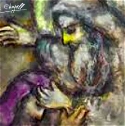
[ Shalom friends! Our Torah for this week is Parashat Vayechi, the final portion from the Book of Genesis, which includes Jacob's great prophecy of the coming Messiah... ]
01.05.20 (Tevet 8, 5780) Our Torah reading for this week, parashat Vayechi (ויחי), recounts how the great patriarch Jacob adopted Joseph's two sons (Ephraim and Manasseh) as his own children. When Jacob blessed the boys, however, he intentionally reversed the birth order by putting the younger before the older, signifying that the old struggle he had faced as a child was over, and he now understood things differently. And note Ephraim and Manasseh's reaction: the older did not envy the younger, nor did the younger boast over the older. The family had apparently learned that blessing from God is for the good of all, and that there is no real blessing apart from genuine humility that esteems the welfare of others. Following this, Jacob was ready to summon his family to hear his final words. Among other things, he foretold how the Messiah would come from the line of Judah and then instructed his sons to bury him only in the promised land, and not in Egypt (Gen. 49:10-12; 49:29-32).
After his death, Joseph and his brothers, with various dignitaries of Egypt, formed a funeral procession and returned to Canaan to bury Jacob in the Cave of Machpelah in Hebron. After the funeral, they returned to Egypt, but Joseph's brothers feared that he would now repay them for their former betrayal and threw themselves on his mercy. Joseph reassured them that they had no reason to fear him and reminded them that God had overruled their earlier intent by intending him to be a blessing to the whole world (Gen. 50:20).
The portion ends with the account of the death of Joseph, who made the sons of Israel promise to take his bones with them when the LORD would bring them back to the land of Canaan (alluding to the great Exodus to come). Joseph's faith in the Jewish people's return to the Promised Land is summarized by his statement: "God will surely remember you" (Gen. 50:24). He died at age 110, was embalmed and placed in a coffin in Egypt, full of faith that he would be raised from the dead in the land promised to Abraham, Isaac, and Jacob.
Note: This Shabbat we will finish reading the Book of Genesis (סֵפֶר בְּרֵאשִׁית) for the current Jewish year... This inestimably great book begins with an account of the creation of the universe by the LORD and ends with Joseph being put into a coffin in Egypt. Note that the word translated "coffin" is the Hebrew word aron (אֲרוֹן), a word used elsewhere in the Torah to refer exclusively to the Ark of the Covenant (the ark that Noah built and the ark that Moses was placed in are both called "teivah"). Throughout their desert wanderings after the Sinai revelation, the Israelites actually carried two special arks - one holding the bones of Joseph and the other holding the tablets of the Ten Commandments.
Glory in the LORD...

01.03.20 (Tevet 6, 5780) While on the one hand we rightly esteem and revere the Messiah as our incomparable LORD and only Savior who is entirely without any rival or equal, on the other hand we should remember that He willingly made himself "equal" with the worst of sinners by taking their place on the cross (2 Cor. 5:21). Other world religions may have some idea about the transcendence of God, but only our faith regards God's love and power as so great that it extends to all possible worlds, even touching and entering into the world of human pain, shame, guilt, abandonment, and the grief of death itself. Only our faith gives glory to God for actually entering the realm of humanity, for willingly touching the leper, for choosing to become a stranger, an outcast, a slave, for the sake of genuinely interceding for sinners and outcasts... Other religions may talk about God's compassion and immanent Presence, but only Yeshua our LORD expresses the heart and love of God for the lost soul based on divine mesirat nefesh - complete empathy and self-sacrifice.
אֲבָרֲכָה אֶת־יְהוָה בְּכָל־עֵת
תָּמִיד תְּהִלָּתוֹ בְּפִי
בַּיהוָה תִּתְהַלֵּל נַפְשִׁי
יִשְׁמְעוּ עֲנָוִים וְיִשְׂמָחוּ
a·va·ra·kha · et · Adonai · be·khol · et
ta·meed · te·hee·la·to · be·fee
badonai · teet·ha·leil · naf·shee
yeesh·me·oo · a·na·veem · ve·yees·ma'·hoo

"I will bless the LORD at all times;
his praise shall continually be in my mouth.
My soul makes its boast in the LORD;
let the humble hear and be glad."
(Psalm 34:1-2)

"I will bless the LORD" (אֲבָרֲכָה אֶת־יְהוָה) – this is cohortative, meaning that it is based on a decision; it comes as a result of inwardly directing or commanding the focus of the heart... "At all times" (בְּכָל־עֵת) refers to every situation, in both prosperity and in testing; in safety and in danger; in joy and in sorrow. As it is said, gam zu l'tovah: "this too is for the good..." There is no time when God should not to be praised for the gift of life – even in the darkest of hours - and therefore an attitude of gratitude is fitting for the chasid, a person of piety and real faith. As the Bratzlover Rebbe once rightly said, "You live in paradise when you know that whatever happens to you happens for your good" (Rom. 8:28). Perfect peace comes to one whose mind is "stayed" upon the LORD in trust (Isa. 26:3).
Every moment of life is a gift given to you from above, and therefore we are indebted to the Lord for our every breath. We must learn to be mindful and awake before the Divine Presence. "At all times" means you are to consciously "know Him" in all your ways (Prov. 3:6). Like king David, "set the LORD" before your eyes (Psalm 16:8) and become alive to the wonder and glory that surrounds and upholds your very life...
The words "praise" and "boast" in this passage come from a root word (i.e., hallal: הָלַל) that means to "shine" (like a "halo"), that is, to become radiant over the goodness of God. The Targum renders, "my soul makes its boast in the LORD" (בַּיהוָה תִּתְהַלֵּל נַפְשִׁי) as "my soul boasts in the Word of the Lord," the Memra or Logos of God. The Apostle Paul undoubtedly had this in mind when he wrote of the "disguised" wisdom of the gospel message: "Let the one who boasts, boast in the Lord" (2 Cor. 1:31).
"May God be gracious to us and bless us; may he cause his face to shine upon us: Selah" (Psalm 67:1). This is where we must start - trusting that God is with us and that he blesses us with all spiritual blessings in Messiah (Eph. 1:3). May our faith result in kiddush hashem - glory to God - as we shine the love of the Lord to others in our lives. Shabbat shalom!
Suffering and God's Plans...

[ The following is related to this week's Torah reading, Parashat Vayigash... ]
01.03.20 (Tevet 6, 5780) Jacob's son Benjamin (בִּנְיָמִין) served as a living link to his beloved wife Rachel (who had died earlier while giving him birth). If Jacob had initially regarded Joseph as the bechor (firstborn) of the family, Benjamin surely assumed his "coat of many colors" after his older brother was assumed to be dead. Indeed, Benjamin represented the last thread of Jacob's original vision and hope in this world. The children from Leah and the concubines were of course important to him, but Rachel always remained his first love, and after she died giving birth to Benjamin, Jacob could not help but hold him close...
In Hebrew, Benjamin means "son of my right hand" (from בֵּן, "son" + יָמִין, "right hand"), though in the Samaritan Torah the name is written as Benjamim (from בֵּן, "son" + יָמִים, "days"), meaning "son of days," perhaps alluding to the age of Jacob when Benjamin was born (Rabbinic tradition says he was 100 years old). As the last link to Jacob's deceased wife Rachel, Benjamin had taken Joseph's place as Jacob's favorite son, and Jacob was unwilling to part from him. Perhaps Jacob secretly feared that God would command him to sacrifice his "only begotten son," just as He had earlier tested his grandfather Abraham regarding his father Isaac. But wasn't the loss of Joseph enough of a sacrifice? Would he also be required to "offer up" Benjamin? Whatever he was thinking, it is clear that Jacob was unwilling to let go of his son - and his lack of trust created an abiding insecurity and heartache within him.
In last week's Torah portion (Miketz), we read that when Jacob asked the brothers to return to Egypt for more food, they said they could not do so without taking Benjamin. Jacob then replied, "Why did you treat me so badly as to tell the man that you had another brother?" (Gen. 43:6). The Midrash Rabbah (Bereshit 91:10) states that Jacob never spoke inappropriately except for here. God said, "I am busy establishing a kingdom over Egypt and Ya'akov is asking why he was treated so badly?" The LORD was busy putting all the pieces together, though Jacob could not see beyond his own personal fear and pain...
The nisayon (test) of Jacob reminds us of the principle: gam zu l'tovah (גַּם זוּ לְטוֹבָה), "this too is for good" (cp. Rom. 8:28). Notice, however, that the principle is not stated, gam zu tovah - "this is good," but rather gam zu l'tovah - "this, too, is for good." The little Hebrew preposition here (-ל) is crucial. The heart of faith does not affirm that "whatever happens, happens" and therefore we should passively accept the injustices and pain of life without any form of protest. Unlike some other religions, the LORD God of Israel does not demand slavish "submission" to His will, much less does He desire "karma-like" indifference to the suffering we see in the world (Phil. 2:4; 1 Pet. 5:7; Heb. 4:16, James 4:9, etc.). Having faith that God will one day "wipe away every tear" does not deny the existence of evil nor does it suppress real tears from being shed; however, genuine faith affirms that real (existential) comfort is coming, and that sadness, pain, and suffering will not be given the last word....
Faith (i.e., emunah: אֱמוּנָה) is a "double movement" of the heart. It both "sees what is invisible" (2 Cor. 4:18) and understands (i.e., accepts) that the "present form of this world is passing away" (1 Cor. 7:31). Faith rests in God's providential hand over the chaos and flux of creation. The eye of faith beholds the Presence of God and His reign over all the mundane affairs of this world. Indeed, it is only by fixing our hope upon the eternal that we are enabled to rightly apprehend the nature of the temporal world itself. In fact, the word emunah shares the same root as the Hebrew word for truth (אֱמֶת). In that sense, "seeing what is invisible" (τὰ μὴ βλεπόμενα) is a more fundamental type of "seeing," since the truth of hope ultimately interprets all other ways of seeing...
Emunah therefore understands temporal suffering as part of the greater purposes of God in the world. It sees beyond the painful moment and trusts that God is "busy putting all the pieces together." Everything has a reason, and that includes the seemingly trivial as well as the obviously tragic. The life of emunah calls us to live as toshavim (תוֹשָׁבִים) - sojourners - who are put at a "distance" from the world of appearances. Faith leads to a form of divine "homesickness," a cry of protest over the state of this world and its evils, and a gnawing hunger for love and truth to prevail in the world. By itself, emunah would die of intolerable heartache were it not for the gift of God's comfort. Indeed, the Scriptures describe God as Av Ha-Rachamim (the Father of mercies) and the God of all comfort:
בָּרוּךְ הָאֱלהִים אֲבִי אֲדנֵינוּ יֵשׁוּעַ הַמָּשִׁיחַ
אבִי הָרַחֲמִים וֵאלֹהֵי כָל־נֶחָמָה
ba·rookh · hoo · ha·e·lo·heem · a·vee · a·do·nei'·noo · Ye·shoo'·a · ha·ma·shee'·ach
a·vee · ha·ra·cha·meem · ve·lo·hei · khol-ne·cha·mah

"Blessed be the God and Father of our Lord Yeshua the Messiah,
the Father of mercies and God of all comfort" (2 Cor. 1:3)

Hebrew Study Card
The blessing continues: "who comforts us in all our affliction, so that we may be able to comfort those who are in any affliction, with the comfort with which we ourselves are comforted by God" (2 Cor. 1:4). Note that Paul links our present suffering (πάθος, pathos) with a divinely imparted comfort (παράκλησις, "paraklesis"), which he regards as a state of blessedness. God Himself "calls us to His side" (from παρά + καλέω) in the midst of our afflictions and pain.... The Greek text reads, ὁ παρακαλῶν ἡμᾶς ἐπὶ πάσῃ τῇ θλίψει ἡμῶν, and might be better rendered as, "The one calling to us [to His side] in all our tribulations" (2 Cor. 1:4). God doesn't want us to go through pain by ourselves, all alone. He invites us to come to His side for comfort... Yesh ohev davek me'ach: "There is a lover who sticks closer than a brother" (Prov. 18:24b).
The purpose of our afflictions is to learn to let go of what we value in the world in order to attain to a better hope. טוֹב־לִי כִי־עֻנֵּיתִי לְמַעַן אֶלְמַד חֻקֶּיךָ / "It was good for me that I was afflicted, that I might learn your statutes" (Psalm 119:71). God calls out to us in our tribulations so that we may turn away from our illusions and seek refuge in His Presence. Suffering is a tool that only God has the wisdom to use as a means of blessing in our lives. As A.W Tozer once wrote, "It is doubtful whether God can bless a man greatly until He's hurt him deeply," and as Charles Spurgeon likewise affirmed:
Trials make more room for consolation. There is nothing that makes a man have a big heart like a great trial. I always find that little, miserable people, whose hearts are about the size of a grain of mustard-seed, never have had much to try them. I have found that those people who have no sympathy for their fellows -- who never weep for the sorrows of others -- very seldom have had any woes of their own. Great hearts can only be made by great troubles. The spade of trouble digs the reservoir of comfort deeper, and makes more room for consolation. God comes into our heart -- He finds it full -- He begins to break our comforts and to make it empty; then there is more room for grace. The humbler a man lies, the more comfort he will always have. (Spurgeon, Consolation Proportionate to Spiritual Sufferings, 1855).
There is an "eschatological" aspect to suffering for the person of faith. Present suffering will ultimately be redeemed as soul-building, but this does not mean that we should act Stoically or admonish others to suppress their heartache. If one of us hurts, so does the rest of the body (1 Cor. 12:26). This isn't sanctimonious humbug; there's no "double talk" going on here. The most succinct verse in the New Testament on this subject is but two words: "Jesus wept" (John 11:35). Nonetheless, we can find great comfort by heeding the voice of pain as a disguised message from God. God calls to us in all our tribulations so that we might make our refuge in Him.
We all suffer and therefore we all exhibit some degree of self-pity in our lives. May God give us the courage to share our hearts with Him and to find abiding comfort in His Presence, chaverim. May it please the Lord to impart to us greater trust in His providential care and love - even in the midst of the challenges and heartaches of this life.
 |
|



